 A side step: As seen from a different perspective: A {working?} example: "G. said at that time that exercises of moving according to the enneagram would occupy an important place in his ballet the 'Struggle of the Magicians'. And he said also that, without taking part in these exercises, without occupying some kind of place in them, it was almost impossible to understand the enneagram. 'Is it possible to experience {understand?} the enneagram by movement,' someone asked. 'The rhythm itself of these movements would suggest the necessary ideas and maintain the necessary tension; without them it is not possible to feel {understand? i.e.,from a subconscious {start?} point of view} what is important', he said. There was yet another drawing of the enneagram which was made under his direction in Constantinople in the year 1920. In this drawing inside the enneagram were shown the four beasts of the Apocalypse - the bull, lion, man and eagle - and with them a dove. These addition symbols were connected with 'centers'. In connection with talks about the meaning of the enneagram as a universal symbol G. again spoke of the existence of a universal ''philosophical'' language. 'Men have tried for a long time to invent a universal language', he said. 'And in this instance as in many others, they seek something which has long since been found and try to think of and invent something which has been known and in existence a long time..." ['In Search of the Miraculous']. Try ''centers'' and/or ''mandala/s'' and/or ''nine'' for a different take on the same theme.
A side step: As seen from a different perspective: A {working?} example: "G. said at that time that exercises of moving according to the enneagram would occupy an important place in his ballet the 'Struggle of the Magicians'. And he said also that, without taking part in these exercises, without occupying some kind of place in them, it was almost impossible to understand the enneagram. 'Is it possible to experience {understand?} the enneagram by movement,' someone asked. 'The rhythm itself of these movements would suggest the necessary ideas and maintain the necessary tension; without them it is not possible to feel {understand? i.e.,from a subconscious {start?} point of view} what is important', he said. There was yet another drawing of the enneagram which was made under his direction in Constantinople in the year 1920. In this drawing inside the enneagram were shown the four beasts of the Apocalypse - the bull, lion, man and eagle - and with them a dove. These addition symbols were connected with 'centers'. In connection with talks about the meaning of the enneagram as a universal symbol G. again spoke of the existence of a universal ''philosophical'' language. 'Men have tried for a long time to invent a universal language', he said. 'And in this instance as in many others, they seek something which has long since been found and try to think of and invent something which has been known and in existence a long time..." ['In Search of the Miraculous']. Try ''centers'' and/or ''mandala/s'' and/or ''nine'' for a different take on the same theme.
'The Whirling Dervishes'. Enlarged elsewhere.
Understand those keys to define that ''philosophical language'' - from the dawn of human {thought?} kind.

All in relation to that universal ''bit''. As a means...?
From a different perspective: "We are like a company of singing dancers who may turn their gaze upward and away {H/V?} - notwithstanding they have the 'choir master' for center; but when they are turned towards him {off center?} then they 'sing' true and are truly centred upon 'him'. Even so we encircle {ecliptic?} the Supreme always; but our eyes are not at all times fixed upon the center. Yet in the vision thereof lie our attainment and our response and the end of all discord: God in his dancers and 'god' the true center of the dance." [Page 143 'The Western Way'. Vol 2].
A side step: In the Hebrew culture Tiphareth represents the heart with an Oak Tree.
"Some say it could be the largest virgin UNpollarded Oak in the world - called Majesty." [Britain's Ancient Tracks' / series 3]. Try ''mustard'' {seed?}.
A mind set ?
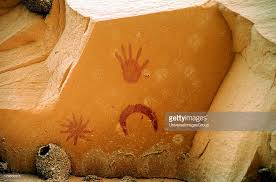 A {working?} example: "Dragon Lord!'' he spoke, "The 'Sun' has risen in the West...and I am here! And he sang this Englyn: Oak that grows between two banks {'pillars'?} - darkened is the sky and hill. Shall it not be told by his 'wounds' {spear link?} - that this is Lleu? Oak that grows in upland ground, is it not wetted by the rain? Has it not been drenched by 'nine' score tempests? It bears in its branches Lleu Llaw Gyffes! Oak that grows beneath the steep, stately and majestic is its ASPECT! Shall I not speak the truth that Lleu has come into your midst?" [Page 250 / Douglas Monroe. Emphasis, this readers].
A {working?} example: "Dragon Lord!'' he spoke, "The 'Sun' has risen in the West...and I am here! And he sang this Englyn: Oak that grows between two banks {'pillars'?} - darkened is the sky and hill. Shall it not be told by his 'wounds' {spear link?} - that this is Lleu? Oak that grows in upland ground, is it not wetted by the rain? Has it not been drenched by 'nine' score tempests? It bears in its branches Lleu Llaw Gyffes! Oak that grows beneath the steep, stately and majestic is its ASPECT! Shall I not speak the truth that Lleu has come into your midst?" [Page 250 / Douglas Monroe. Emphasis, this readers].
And/or: ''Too much sun makes a desert."
REFRESHER: "Sirius is sometimes called the 'Sun behind the sun', indicating that while the star we call the Sun is related to our physical center of Self in our Solar Plexus and the expression of our Selves within the physical earth, Sirius represents a more hidden center { Egyptian example = 'Amun'?}."
'The star of ones being is rising'?
Continued: [3]. Hence the link to the bible story...Moses= ‘Prince of Egypt’, i.e., ’dark’ land, seeking out...together with all those aspects of his 'lower' self...[ i.e., ‘Children’ of Israel ]...his higher self, [ 'Yahweh', i.e., ’Light', [by way of 'Adonai', i.e.,'Lord']. Higher over lower. ''Light'' over ''darkness''....in the ‘'wilderness’'. Finally to ‘meet’ up with his higher self ‘. On top of’ mount Sinai. Or more to the point. The ‘higher self’ coming to terms with its ‘lower self’, before ‘moving on’. Indicative of.
'The Waste Land' / T. S. Eliot.

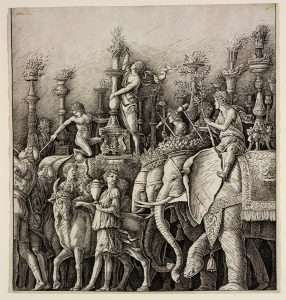
'light oxen': "I bring up an individual type as a point of departure to talk about {'harbour'?}. The one that is strongest will pull you first....." [Page 4 'Stopping and Seeing' / T. Cleary].
And/or: ''....On this battlefield {'struggle' / ''duality'' link} previously unacknowledged parts of oneself demand to be recognised - demand 'a place in the sun'....." [Page 15 'The Lover and the Serpent' / Llewellyn Vaughan-Lee].
All as a means....?
''....But once he realizes that he himself has a shadow, that is enemy is his own heart, then the conflict begins and one becomes two. An awareness {'sunshine'?} of the opposites in ones own nature at first brings conflict....experiences an inner battle as opposing aspects of oneself fight it out. On this battlefield....." [Same book].
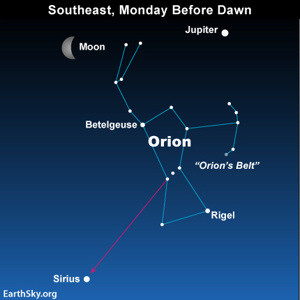
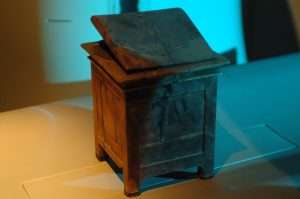
Solitary 'tooth' {and liver} found in a 'square' box belonging to Hatshepsut. The 'BOX' that is!
A {working?} example i.e.,something to be 'figured' out - from a different perspective: "Traditionally Canis Major has been seen as a dog, but Homer uses the same stars to give TWO different manifestations of the usual configuration of the stars of Canis Major. When Achilles is seen as the entire constellation in human form, the brighter stars are highlighted by descriptions of his HEART {i.e., Sirius, the brightest star}, his chest, liver, forearm, hands, knees, and feet to give the impression of a man. Stars defining his shield, helmet, and sword, add the accoutrements of WAR to this outline {animate/inanimate?}. In Book 18, Achilles mother, Thetis, suggests yet another image of the significantly brighter stars of the constellation when she describes her son as a young sapling who will grow into a mighty warrior...This variant image of Achilles as a young tree helps fix the arrangement of Canis Major standing on its 'tail'...Homer also uses Canis Major to reiterate his idea of the celestial sphere when in Book 23 of the Iliad, Achilles tosses this way and that during a restless sleep." ['Homer's Secret Iliad']. Tail end of something begins...?
''Heart'' and ''war'' in relation to ''18'' {''sapling'' therefore 'tree'} and ''23'' {''restless'' therefore 'one way or the other'}. Anything?
Coincidence or a meaningful one?
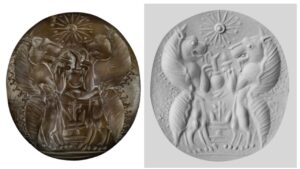
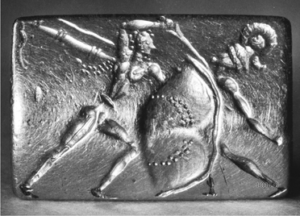
Griffin warrior. Figure of 'eight' for a shield.
And/or: Like the grave of the Griffin Warrior {Pylos}, the two family tombs contained artwork emblazoned with mythological creatures. An agate sealstone featured two lion-like creatures called genii standing upright on clawed feet. They carry a serving vase and an incense burner, a tribute for the altar before them featuring a sprouting sapling between horns of consecration, Stocker said.
Above the genii is a sixteen-pointed star. The same 16-pointed star also appears on a bronze and gold artifact in the grave, she said.
“It’s rare. There aren’t many 16-pointed stars in Mycenaean iconography. The fact that we have two objects with 16 points in two different media (agate and gold) is noteworthy,” Stocker said.
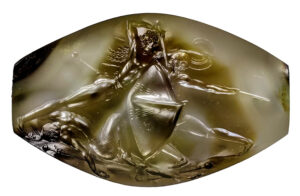
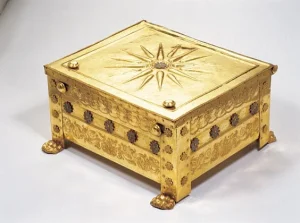
The tomb of Phillip II was found in the modern Greek village of Vergina, the site of Aigai. Objects from the tomb included an ivory head {bedpost}, a gold wreath with myrtle leaves and flowers; a gold quiver cover; a gold larnax, or ossuary, decorated with a sunburst {'SIXTEEN' pointed} or star likely containing Phillips remains; and a gold ornament of the gorgon Medusa.
The genius motif appears elsewhere in the East during this period, she said.
“One problem is we don’t have any writing from the Minoan or Mycenaean time that talks of their religion or explains the importance of their symbolism."
Side note: Agate was given its name by Theophrastus, a Greek philosopher and naturalist. He discovered the stone c. 350 BCE along the shoreline of the River Achates (Ancient Greek: Ἀχάτης), now the Dirillo River, on the Italian island of Sicily, which at the time was a Greek territory.[4]: 52, 162 bols,” Stocker said.
Demeter/Persephone?
A larnax (plural: larnakes; Ancient Greek: λάρναξ, romanized: lárnax, plural: λάρνακες, lárnakes) is a type of small closed coffin, box or "ash-chest" often used in the Minoan civilization and in Ancient Greece as a container for human remains—either a corpse (bent back on itself) or cremated ashes.
Aries-Pisces?
The first larnakes appeared in the Minoan period of the Aegean civilization, when they took the form of ceramic coffers designed to imitate wooden chests, perhaps on the pattern of Egyptian linen chests. They were richly decorated with abstract patterns, octopuses and scenes of hunting and cult rituals.[1]
Pylos (UK: /ˈpaɪlɒs/, US: /-loʊs/; Greek: Πύλος), historically also known as Navarino, is a town and a former municipality in Messenia, Peloponnese, Greece. Since the 2011 local government reform, it has been part of the municipality Pylos-Nestoras, of which it is the seat and a municipal unit.[2] It was the capital of the former Pylia Province. It is the main harbour on the Bay of Navarino. Pylos has been inhabited since Neolithic times. It was a significant kingdom in Mycenaean Greece, with remains of the so-called "Palace of Nestor" excavated nearby, named after Nestor, the king of Pylos in Homer's Iliad. In Classical times, the site was uninhabited, but became the site of the Battle of Pylos in 425 BC, during the Peloponnesian War.
Something extra: Something learned?....

April Ashley - the Pathfinder. 'Holloway'?
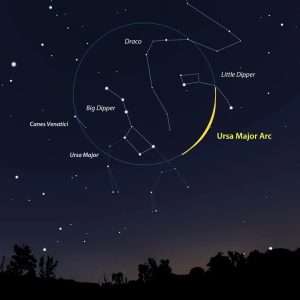
''Bears were venerated by our ancients as being the strongest animal to roam the land.'' And/or: ''Hyades, in Greek mythology, daughters of the Titan Atlas and the Oceanid Aethra, the five (or more) sisters of the Pleiades who nursed the infant wine god, Dionysus, and as a reward were made the five stars in the head of the constellation Taurus, the bull....held by the ancients to indicate rainy weather when they rise with the sun.''
In Greek mythology, the Hyades were the five daughters of Atlas and half-sisters to the Pleiades. After the death of their brother, Hyas, the weeping sisters were transformed into a cluster of stars that was afterwards associated with rain.
As a naked-eye object, the Hyades cluster has been known since prehistoric times. It is mentioned by numerous Classical authors from Homer to Ovid.[13] In Book 18 of the Iliad the stars of the Hyades appear along with the Pleiades, Ursa Major, and Orion on the shield that the god Hephaistos made for Achilles.[14]
In England the cluster was known as the "April Rainers" from an association with April showers, as recorded in the folk song "Green Grow the Rushes, O".
Gregor Clegane or Bronn? {Game of Thrones}.
''When i was a kid and i got scared; the rain man would come to see me.'' [Tom Cruise / 'Rain Man' / 1988].
'The Talking Tree' / W. Gray.
"I {Thetis} bore him fair and strong, hero among hero's and he shot up as a sapling; I tended him as a plant in a goodly garden' - This variant image of Achilles as a young tree helps fix the arrangement of Canis Major standing on its tail.." ['Homer Secret Iliad'].
Side note: In the Odysseus 'story' the main character meets Achilles in the 'underworld' - after mixing a concoction of foods ''untouched by fire'' {i.e.,honey, milk, sweet wine and white barley meal}. He {Achilles} so dislikes it that he would prefer to return to the physical world as a servant - than be Lord of the underworld.
To understand why define {''see''} the following: REFRESHER: "Gudea made offerings of honey and butter when the foundations were laid; when the building was finished an auspicious day was waited for, and when it came the image of the god was removed to the new temple, and Gudea sprinkled the ground with oil, and set out offerings of honey, butter, wine and dates, grain mixed with milk, food untouched by 'fire', for the gods." [ Chapter 3, 'The Sacred Bee']. Recall what 'food' represents, [e.g., put ''butter'' or ''honey'' or ''milk'' in the 'search box'].

Cedar or Sycamore as a means...?
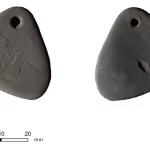
Made from shale. Question: What is shale made from?
"Every animal endowed with sight and able to stand above the ground, or on an eminence, is most likely aware of what we call the horizon...The experience of all round boundaries {'Saturn' link? and/or ''running the fields''?} is thus a universal factor to sentient beings. But it is reserved for the human species to experience in the fullest sense what the meridian means - for by standing erect the human 'spine' {Abydos?} extends the radius of the globe on the surface of which we walk freely {'upright'?}. Strictly speaking the meridian is the circle of longitude which passes through the point overhead. It is a celestial, or a terrestrial, circle. However, in these studies, wherever we have spoken of the meridian, we have considered it in projection as a line {'line of sight'?} - more precisely, as the diameter of the meridian circle which links the point overhead {zenith} and the point underfoot {nadir}. The diameter passes through the center of the earth, representing therefore at every point on the surface of the globe, the line along which gravity operates. As man stands erect, his spine follows more or less this line of gravity - the plumb line - which, if prolonged downward, reaches the earth's center, and, upward, meets the vault of the sky at the zenith. The erect spine is one of the basic characteristics of humanity {'natural' link?}. It is the mark of the human ego, the signature of the human consciousness. What makes a consciousness ''human'' is not only the development of the mental faculties {related to the development of the hand and brain}, but also the power to stand as an independent center of being - an ego. The human person is an ego because he is a direct projection of the center of the earth - a radial expression of that center. He is a tree which has become free to orientate itself at will, free to make its own plumb line connection with the earth center and to select its own zenith, its own longitude and latitude...Because we stand erect {Osiris?} we are longer entirely subservient to the collective energies which move along the horizontal line... " [From the chapter 'The Tenth House' within the book 'The twelve Astrological Houses' by Dane Rudhyar].
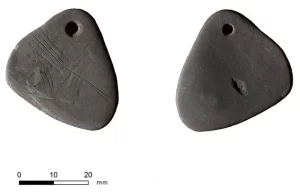
Purposely deposited into a lake of 'fresh' water. Wooden objects and platforms made of 'tree' parts also found within same. Geometrical 'lines' together with the 'hole'. Longest one in the middle. Triangular in shape but now smoothed {'subtle'?} with the effects of water. 'HUNG' around the neck {i.e., top of the 'spine'}. Any 'plant' specimens found? Nazca LINES to ''SEE'' it from a different perspective. In a different FORM!
'Longwood'?
Stretcher to enlarge.

Foundation Stone within the Dome of the Rock. A 'HOLE' in its S/E Corner.
By contrast, one of the most unusual items from Star Carr is a small shale pendant etched with a series of parallel lines and smaller markings drawn at right angles (pictured – see also CA 314). While these engravings are difficult to see with the naked eye, experimental archaeology suggests that when freshly cut they would have been vibrantly white against the darker background, and similar artefacts are known from southern Scandinavia. Possible interpretations of the markings are numerous – stars, a map, a bird, the lines on the palm of the hand, a river with channels diverting water, a tree, a leaf, the Star Carr platforms, or a form of writing working in a similar way to the medieval Irish script Ogham – but, whatever its purpose, the pendant seems to have been deliberately placed in the lake, hinting at practices whose meaning has long faded from memory.''
Put those keys together {i.e.,as one example - what 'constellation' represents the 'tenth' house?} - to get closer to defining Homer's secret Iliad - AND/OR - therefore the subject as a whole.
Refresher: ''Horus is the 'STAR' at the head of the sky''.
Spine of Osiris?
The 'tail' end of something begins the process of...
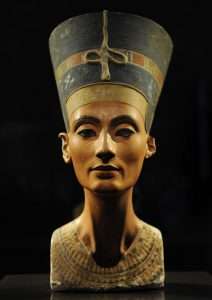
Plaster = clay?
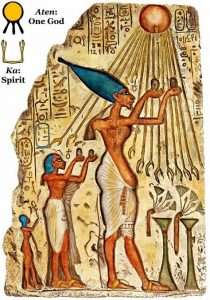 A working example: {in its abstract, alchemical form}: ''A 'decapitation' signifies the obtaining of the arcane substance {Bran the Blessed?}....an epithet being the ''Meridian of the Sun''....This striking off of the golden head, in alchemy is synonymous with 'gold'. Gold as Michael Maier says, is the circulatory work of the sun. Shining CLAY moulded into the most beauteous substance, wherein the solar {'Aten'?} rays are gathered together and shine forth...Others say 'gathered' in quicksilver {'Mercury'?}...from the 'invisible rays' of heaven.'' [Page 72 'Alchemical Studies' / C. G. Jung].
A working example: {in its abstract, alchemical form}: ''A 'decapitation' signifies the obtaining of the arcane substance {Bran the Blessed?}....an epithet being the ''Meridian of the Sun''....This striking off of the golden head, in alchemy is synonymous with 'gold'. Gold as Michael Maier says, is the circulatory work of the sun. Shining CLAY moulded into the most beauteous substance, wherein the solar {'Aten'?} rays are gathered together and shine forth...Others say 'gathered' in quicksilver {'Mercury'?}...from the 'invisible rays' of heaven.'' [Page 72 'Alchemical Studies' / C. G. Jung].
Side step: Dog {in reverse?} = god. Analogy? Gog. And/or Magog = gog-AM in relation to: "Latin is often without the inclusion of the verb ''to be,'' so that this sentence is actually saying: ''and in Arcadia, i am.'' [www.philipcoppens.com/arcadia]. Enlarged elsewhere.

'gog' link to ''red cave''?
'STRETCHED'?
"The first of the TWO names occurs in the book of Ezekiel, where Gog is an individual {rural? and/or 'spirit'} and Magog is his land {'city'? and/or 'soul'}; in Genesis 10, Magog is a person, son of Japheth son of Noah, but NO Gog is mentioned. In Revelation, Gog and Magog together are the 'hostile' nations of the world." [Wiki/'Magog'].
Question. Rural/city in relation to a 'struggle' as a means...?
Something extra?: ''Anglesey is also home to the village with the longest name in Europe - LlanfairpwllgwyGOGerychwyrndrobwilliantysilioGOGOGoch....'' ['Readers Dijest' / April 2021].
Translates as: ''The church of St. Mary, of the pool {hollow?} of the white hazels, near a rapid whirlpool and the church of St. Tisilio near the red cave.'' ['Mystic Britain: Isle of Druids'].
The above 'name' {New one?} a combination of three local hamlet names.
'T'aormina to enlarge.
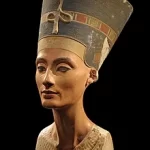
Noble lasses? Stretched neck?
Side note: ''If you head forwards toward the first tower, this is called Anne Boleyn's Gateway. It functions as the entrance to King Henry VIII's apartments and leads to Clock Court where you can see the Astronomical Clock above the arch.''
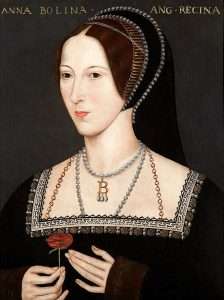
'' A stroll through the 16th-century section of Hampton Court Palace offers an interesting “overlook” at Henry VIII’s famous residence, which has become known as Anne Boleyn’s Gateway. Built within the loop/bend {'semicircle'} of a river.'' N.B. Identified with the falcon.
Continued: ''Because Welsh is a Celtic language like Gaelic in Ireland or Breton in Brittany - they were all dominated by the Druids according to Caesar.'' [same].
"Breton (/ˈbrɛtən/ BRET-ən, French: [bʁətɔ̃]; endonym: brezhoneg [bʁeˈzɔ̃ːnɛk] ⓘ[5] or [brəhɔ̃ˈnek] in Morbihan) is a Southwestern Brittonic language of the Celtic language group spoken in Brittany, part of modern-day France. It is the only Celtic language still widely in use on the European mainland, albeit as a member of the insular branch instead of the continental grouping.[6]
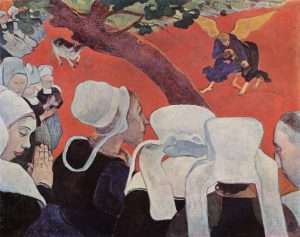
"Vision after the Sermon (Jacob Wrestling with the Angel) is an oil painting by French artist Paul Gauguin, completed in 1888. It is now in the Scottish National Gallery, Edinburgh. It depicts a scene from the Bible in which Jacob wrestles an angel. It depicts this indirectly, through a vision that the women depicted see after a sermon in church. It was painted in Pont-Aven, Brittany, France." N.B. Older women in background with grimace contours of mouth {downward}, as opposed to the {content?} expression of the younger ones {upward}. Bitter/sweet. Old/young. Crone/Virgin. Waxing/Waning as a means.... Question. Opposite side of a tree? + Cow approaching from west {Mona?} = emotions/etheric link? Question 2. In relation to whom?
Breton was brought from Great Britain to Armorica (the ancient name for the coastal region that includes the Brittany peninsula) by migrating Britons during the Early Middle Ages, making it an Insular Celtic language. Breton is most closely related to Cornish, another Southwestern Brittonic language.[7] Welsh and the extinct Cumbric, both Western Brittonic languages, are more distantly related, and the Goidelic languages (Irish, Manx, Scottish Gaelic) have a slight connection due to both of their origins being from Insular Celtic.
Having declined from more than one million speakers around 1950 to about 200,000 in the first decade of the 21st century, Breton is classified as "severely endangered" by the UNESCO Atlas of the World's Languages in Danger.....Breton is spoken in Lower Brittany (Breton: Breizh-Izel), roughly to the west of a line linking Plouha (west of Saint-Brieuc) and La Roche-Bernard (east of Vannes). It comes from a Brittonic language community that once extended from Great Britain to Armorica (present-day Brittany) and had even established a toehold in Galicia (in present-day Spain). Old Breton is attested from the 9th century.[8] It was the language of the upper classes until the 12th century, after which it became the language of commoners in Lower Brittany. The nobility, followed by the bourgeoisie, adopted French."
Druid/Mona links?
''Meaning: noble or aristocratic. Mona is a girl's name of Italian origin. This name translates to “noble” and “aristocratic.” It is thought to be derived from the name Madonna, which is famously associated with the Virgin Mary in Christian theology.''
''Regardless of the language, Lisa's meaning is spiritual; the name is said to mean "oath from God," "devoted to God," or "my God is bountiful." The Hebrew meaning is derived from the name Elisheba, which also references the lily flower.''
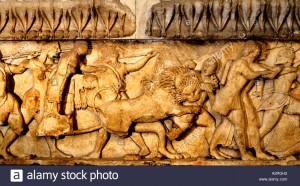
Greek city states built 'treasuries' along the Sacred Way {to Delphi}. The ''fanciest'' treasury was built by one of the smallest {'child' link} Greek states - Sifnos. It had an elaborate frieze that ran around its outside like a ribbon {'girdle' link}. At its heart two lions pulling a chariot = ''The struggle between the gods and the giants to rule the world." ['Treasures of Ancient Greece: The Age of Hero's' / Alastair Sooke. BBC 4]. The narrator sums it all up within such phrases as ''political power'' for the sake of ''political competition'' - ''All of it communicated by art''. Understand those 'keys' to define something 'inner''.
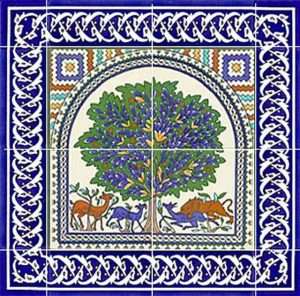
The Tree of life tile mural is a reproduction of a mosaic floor in Jericho, dating from the 6th century. {Jerusalem Pottery}. Odysseus to enlarge.
"We are shown that we aught to control our forces as the Gnosis figure governs the 'lion' from a 'higher' level- [in relation to the 'Strength' card of the Tarot]. If we learn to hold our ''Lions mouth'' with the ''grip of advantage'' [link to 'grasp' symbolism], we may also feed or starve our forces, prevent them from injuring ourselves or anyone else, examine their ''teeth'', or the effectiveness of their ''bite'', work silently or with a roar, and in fact do 'What We Will' with our Lions share of 'strength'; always providing we do this with a firm and kindly knowledge in the name of beauty and harmony. This is the real spiritual Strength, which must never be confused with violence of any description." [Extract taken from the 'Talking Tree' by W. Gray]. Try ''lions paw'' to understand its relevance to other 'doctrines' [or cultures]. Question. Coincidence or a meaningful one?
Side note: Of all the creatures alive today, the saltwater crocodile (Crocodylus porosus) has the strongest known bite force, at 16,460 newtons (newtons measure force magnitude), a 2012 study in the journal PLOS One found. For comparison, 1 newton equals about a quarter pound of force.
Sobekneferu or Neferusobek (Ancient Egyptian: Sbk-nfrw meaning 'Beauty of Sobek') was a pharaoh of ancient Egypt and the last ruler of the Twelfth Dynasty of the Middle Kingdom. She ascended to the throne following the death of Amenemhat IV, possibly her brother or husband, though their relationship is unproven. Instead, she asserted legitimacy through her father Amenemhat III. Her reign lasted 3 years, 10 months, and 24 days, according to the Turin King List.

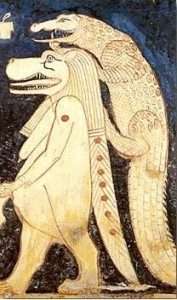 Distinguishing herself from prior female rulers, Sobekneferu adopted the full royal titulary. She was also the first ruler to associate herself with the crocodile god Sobek through her name. Contemporary evidence for her reign is scant. There are a few partial statues – one with her face – and inscriptions that have been uncovered. It is assumed that the Northern Mazghuna pyramid was intended for her, though this assignment is speculative with no firm evidence to confirm it. The monument was abandoned immediately after its substructure was completed. A papyrus discovered in Harageh mentions a place called Sekhem Sobekneferu that may refer to the pyramid. Her rule is attested on several king lists....
Distinguishing herself from prior female rulers, Sobekneferu adopted the full royal titulary. She was also the first ruler to associate herself with the crocodile god Sobek through her name. Contemporary evidence for her reign is scant. There are a few partial statues – one with her face – and inscriptions that have been uncovered. It is assumed that the Northern Mazghuna pyramid was intended for her, though this assignment is speculative with no firm evidence to confirm it. The monument was abandoned immediately after its substructure was completed. A papyrus discovered in Harageh mentions a place called Sekhem Sobekneferu that may refer to the pyramid. Her rule is attested on several king lists....
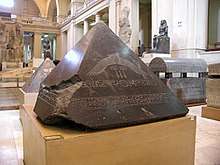
Benben or benbenet.
Sobekneferu is thought to be the daughter of Pharaoh Amenemhat III,[5][18] but her mother's identity is unknown.[19] Amenemhat III had two known wives, Aat and an unnamed queen, both buried in his pyramid at Dahshur. He had at least one other daughter, Neferuptah, who had a burial at his second pyramid at Hawara that was eventually moved to her own pyramid.[20] Neferuptah appears to have been groomed as Amenemhat III's heir as she had her name enclosed in a cartouche.....
Sobekneferu was one of the few women that ruled in Egypt,[27][28] and the first to adopt the full royal titulary, distinguishing herself from any prior female rulers.[5][29] She was also the first ruler associated with the crocodile god Sobek by name, whose identity appears in both her birth and throne names.
Continued: ''Teeth'' as seen on a {lion?} figure at Gobekli-tepe. Coincidence or a meaningful one?
A working example: The brooch of Odysseus shows a lion or wolf with the head of a deer in its mouth. Question. Killing or 'wrestling'?
''Known formally by his royal name, K'inich Yax K'uk Mo, he reigned for eleven years. His name is translated {among others}...'Sun in the Mouth of the Quetzal Bird'. The many interpretations of his name are reflected in the various theories regarding his origins." [www.ancient.eu/yax_k'uk_mo].
[3]. REFRESHER: Hence the link to the bible story...Moses= ‘Prince of Egypt’, i.e., ’dark’ land, seeking out...together with all those aspects of his 'lower' self...[ i.e., ‘Children’ of Israel ]...his higher self, [ 'Yahweh', i.e., ’Light', [by way of 'Adonai', i.e., 'Lord']. Higher over lower. ''Light'' over ''darkness''....in the ‘'wilderness’'. Finally to ‘meet’ up with his higher self ‘. On top of’ mount Sinai. Or more to the point. The ‘higher self’ coming to terms with its ‘lower self’, before ‘moving on’. Indicative of.
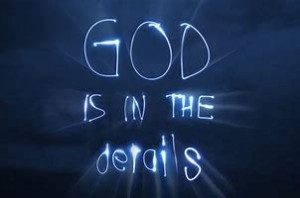
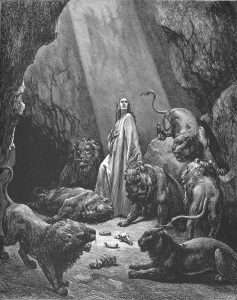
"Daniel replies that his God had sent an angel to close the jaws of the lions, "because I was found blameless before him". And/or: "When the Jews were again being held in captivity, this time in Babylon, the prophet Daniel was thrown into a den of lions and the cave blocked shut for the night. In the morning Daniel was unharmed, because, he said, an angel had stopped the lions mouths." [Page 150 'The Sacred History' / J. Black]. 'Lion couchant'? Gebel Barkal to enlarge. Question. What does that say for the "collective mindset" PRIOR to captivity?
N.B. Mount Sinai - representing the middle [key] of that journey.
Understanding that universal framework defines the above. The real question however is why go to all this effort. Nothing more than to verify a subject? Generation by generation?
"An interesting sidelight is thrown on the concept of the Moon as the governor of men, when we remember that the last Hebrew migration was from Sinim [that is, from the Land of the Moon] and that Sinai, the mount on which Moses received the Tablets of the Law , is the Mountain of the Moon." [Chapter 12, 'Women's Mysteries: Ancient and Modern'. Mentioned elsewhere].
Hence the link to the real meaning; and intention; of the name Moses....out of water, 'drawn from water'. See anything?
Primordial mound link? The beginning of something? Recall Part 1.
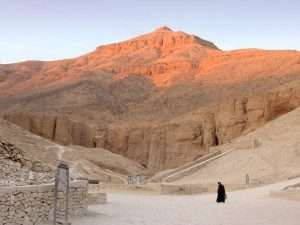
''She who loves silence'' Coincidence or a …..?
"And indeed, have we sent forth Moses with our messages: "Lead your people out of the depths of darkness into the light, and remind them of the days of god". Truly, in this there are messages for those who are firmly patient and constant". [Quran 14:5].
''Patience is the mother of will. If you have no mother, how can you be born?" Gurdjieff.
Analogy: "A true 'magician' is brought forth as such from his mothers womb. Others who assume the function will be unhappy..." Grimoir Verum, 14th Century. [Taken from the chapter entitled 'A Boy to Magic Born' from the book by Douglas Monroe].
And/or: ''There were Giants...' is a story which is location specific {in this case below Tintagel S/W England}. It focuses upon one geographic location, and only ONE: The Cave. CAVES were primeval Celtic symbols of the 'womb and the tomb'..." Same book.
Question. Shadow/anima - which and why?
And/or: S/W = 'Tomb'? S/E = 'Womb'?
Try ''Chacoan'' to see something else from a S/W perspective. Part 3.
Question. Any ''caves'' within that location?
A side step: "I, King, have dealt with the gods for three generations of men, and i know that they dazzle our eyes and flow in and out of one another like eddies on a river, and nothing that is said clearly can be said truly about them." [From 'Till We Have Faces' by C. S. Lewis].
Those three 'generations' that in number symbolism are represented by the number '120' {'Micro'?}.
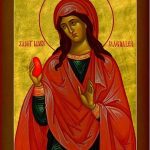
What does the 'egg' represent within that MIND SET.
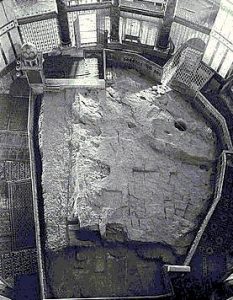
Foundation stone. 'Hole' S/E.
Side note: ''Neither the New Testament nor the Church Fathers allude to Mary Magdlene's fate after the resurrection. Likely she was among the one hundred and twenty in the Upper room, participating in the beginnings of the early Church formation {'Foundation'?}: Beyond that different traditions offer possibilities about how her life continued....'' [ Page 97 'Mary Magdalene: Insights from Ancient Magdala' / J. Ristine].
Macro ?
Continued: "There they find an enclosed chamber which is, however, lit brightly as by an interior sun. This is a common statement of those who had penetrated the ancient Mysteries: that they had gone into the 'underworld' and 'seen the sun shine at midnight' - or had found the starry universe within rather than beyond the earth." [Same book]. Among others try ''midnight sun'' {Manifested?}.
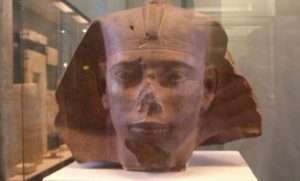
Side note: {something hinted at - in 'story' form {''method'' link}: " And so the deep teachings begin...Making the sign of the Three Rays....It will be the 'white' raven {north?} not the 'black' one, which will show the way....The white raven, magical, impossibly rare, unseen in common hours. 'Teacher, what does it mean?'....'Riddle me this Bear Cub,' Merlyn replied, ''If a man were convinced to believe that such a bird existed, how many need be produced? Three? five perhaps?'' The ball was in my court {Mayan ball court link?}. ''Why one of course''...." Exactly so,'' the Druid replied, ''Res ipsa loquitur - the thing speaks for itself, the correct answer is self evident {'midnight sun' link}, no explanations needed. Just one undeniable example will serve as proof of anything..." [Page 37 'Deeper Teachings of Merlyn' / D. Monroe]. Enlarged elsewhere.
'Grimes cave' ? {UNmanifested?}. Enlarged elsewhere.
Geocentric?
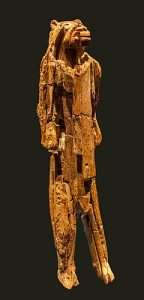
Lion Man.
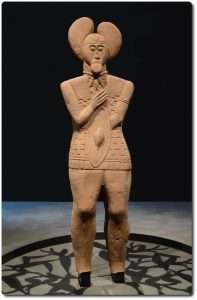
Torc closed {with three petals?}. Hands, navel, chin to the top of the head {crown space?} - central to a THEME ? A blossoming - within a 'line of sight'? i.e., What signs of the zodiac represent the hands, throat and head? Any legs and feet? Above below the navel? Gemini / Aquarius?
''Three Rays'' in relation to: ’The Mark’. By M. Nicoll. A link to the wet/dry way. Freemasonry equivalent of similar, the 'lions paw' in relation to the 'Eagle's claw grip',[i.e., 'animal' in relation to 'bird'], as explained as part of 'becoming' a 'master mason' within the book ' The Hiram Key'. Mentioned elsewhere. Chapter one ], i.e., "There remains a third and peculiar method, known as the Lions Paw or Eagles Claw Grip". Think about it, in relation to the symbolism of... to grasp and or 'scratch' something, by way of, 'three' symbolism and the 'cant' language, together with lower [lion], higher [eagle]. [All explained within] in relation to the 'purpose' of Freemasonry. All still in the 'lower' state, until an 'awareness' dawns, i.e., enlightenment surfaces......
Side note: "In Canis Minor lay a part of the contracted {kneeling?} forearm, or Paw, of the early Lion {Asad}; the other, the Extended Paw, running up into the heads of Gemini...Canis Minor lies to the S/E from the feet of Gemini, its western border over the edge of the Milky Way, and is separated by Monoceros from Canis Major and Argo." [Page 133, 'Star Names and Their Meaning'].
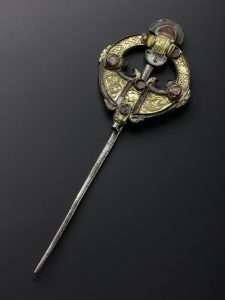 Question. The 'head' of Gemini in relation to the extended 'paw' of the Sphinx = Northern or Southern 'gateway'?
Question. The 'head' of Gemini in relation to the extended 'paw' of the Sphinx = Northern or Southern 'gateway'?
''Beethoven's fifth is morse code for the letter 'V'.....'' ['The Chase']. And/or: ''Five is the human soul. Just as mankind is comprised of both good and evil, so the five is the first number made up of even and odd.'' ['The Mystery of Numbers' / A. Schimmel].
Side note: "Aries {Ram} = 'head'. Gemini {Twins} = arms. Leo {Lion} = heart. Libra {Scales} = pelvis. Sagittarius {Man-horse} = thighs. Aquarius {Waterman} = lower leg. Taurus {Bull} = neck and throat. Cancer {crab/crayfish} = chest and breasts. Virgo {Virgin} = stomach, womb. Scorpio {Scorpion} = sexual parts. Capricorn {Goat-fish} = knees. Pisces {Fish} = feet.
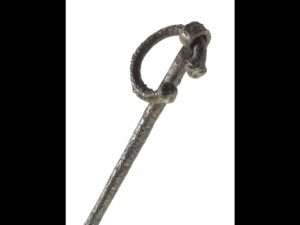
"Every part of the human being is linked with some part of the cosmos. We wished we had a mediaeval image of the zodiacal man to show the zodiacal rulerships...
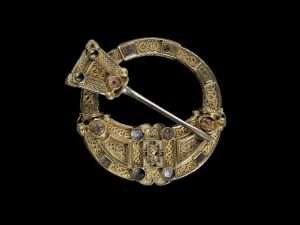
Tara brooch?
The head is ruled by Aries, the throat by Taurus, the feet by Pisces. You see then that the head and feet were linked with the two extremes of the zodiac. In the zodiac circle they touch..." ['The Zelator'].
Side note: The Westness brooch was a product of changing fashions during the 8th century, but was found with the body of a woman buried around a hundred years later in a Viking-style cemetery. Thanks to careful excavation, we know that the brooch-pin’s missing studs were already lost by the time it was placed in the grave. This suggests that it was a precious heirloom, probably passed down through generations. Similarly, the Hunterston Brooch had Norse runes carved onto its back some 200 years after it was made, showing it was still a cared-for possession.
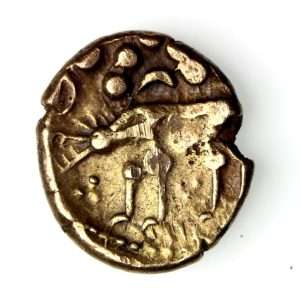
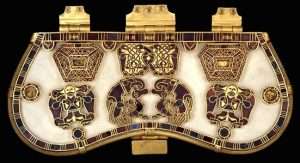
Sutton Hoo purse clasp: Wolfs / eagles and ducks.
The Westness brooch-pin was discovered by accident when a farmer was burying a dead cow in 1963. It was only recognised after it had been dug out of the soil, in the spoil heap! When the archaeologist arrived, she discovered a disturbed grave in a stone chamber: an elite, Scandinavian-style female burial from the first generation of Viking migrants to Orkney in the early 9th century. This remains the richest female Viking-age burial yet discovered in Scotland, in terms of the amount of grave goods and the range of material (including items of gold, silver, bronze, glass, iron, antler and textile).
Brooch-pins like these are a product of changing fashions in the 8th century. Horseshoe-shaped or penannular brooches had been the most popular dress-fastener among the elite for hundreds of years. These brooches had a pin which could move around the hoop, effectively locking both the brooch and clothing in place. In time, fashions changed: the pin was made longer and the brooch hoop became just a decorative ring at the top, a place to add more decoration rather than a functional feature. The Westness brooch-pin has what looks like a miniaturised Hunterston Brooch placed at the head of a pin. This is why it has a projecting beast-head beneath the hoop terminals, its mouth used to grip a chain or cord, now lost, which would have attached to the pin.

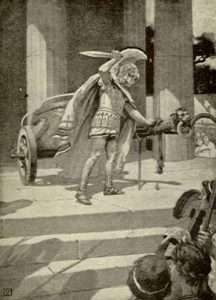 Side note: ""The ancient Egyptian word 'Ren' means ''name''. The name is an essential attribute to the personification of a being....The ancient symbols of which are ''mouth'' and water''. The name is sometimes found encircled by a 'rope of light' called a cartouche...." [Page 137 'Egyptian Book of the Dead' / M. Ashby].
Side note: ""The ancient Egyptian word 'Ren' means ''name''. The name is an essential attribute to the personification of a being....The ancient symbols of which are ''mouth'' and water''. The name is sometimes found encircled by a 'rope of light' called a cartouche...." [Page 137 'Egyptian Book of the Dead' / M. Ashby].
A scroll (from the Old French escroe or escroue), also known as a roll, is a roll of papyrus, parchment, or paper containing writing.
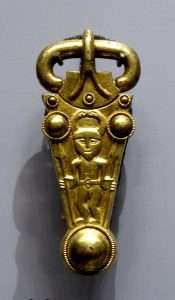 REFRESHER: ''And with some final ceremonial words...she circumnavigated the circle for the last time that night. Returning to the east, she turned and faced us: 'Our circle is open but never broken. Merry meet, and merry part, and merry meet again!'...Joy filled the room...Freedom swept aside the 'terrors' that had once constrained....Where a 'knot' had once filled my heart, now i felt 'movement' and possibility. I stepped outside of the circle, changed by the 'fire' magic we did that 'moonless' night when the dark orb was in Cancer and the sun in Leo.'' [ Page 131 'The Book of Shadows' / P. Curott].
REFRESHER: ''And with some final ceremonial words...she circumnavigated the circle for the last time that night. Returning to the east, she turned and faced us: 'Our circle is open but never broken. Merry meet, and merry part, and merry meet again!'...Joy filled the room...Freedom swept aside the 'terrors' that had once constrained....Where a 'knot' had once filled my heart, now i felt 'movement' and possibility. I stepped outside of the circle, changed by the 'fire' magic we did that 'moonless' night when the dark orb was in Cancer and the sun in Leo.'' [ Page 131 'The Book of Shadows' / P. Curott].
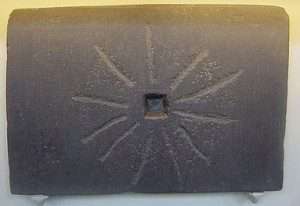 And/or: .........Its brilliance can vary, but its size is the same . And it is also by means of this 'star' that the individual soul passes from one body to another in the cycle of birth and rebirth. However many times a man is burned or buried, the blue star will always stay the same. It leaves the body at death, but stays at the place of death for 'eleven' days. [Link to the ''eleventh hour.'' This readers input]. Afterward, [link to the 'twelfth hour'], according to destiny, it carries the soul with its sins and virtues to different worlds. The blue star is the 'self propelled vehicle' of the individual soul. When the individual is born again, the blue star is born with it. When the star exploded, my cycle of coming and going had ended. The vehicle had broken down, so how could i come and go anymore? This breaking may also be called the piercing of the knot of the heart.
And/or: .........Its brilliance can vary, but its size is the same . And it is also by means of this 'star' that the individual soul passes from one body to another in the cycle of birth and rebirth. However many times a man is burned or buried, the blue star will always stay the same. It leaves the body at death, but stays at the place of death for 'eleven' days. [Link to the ''eleventh hour.'' This readers input]. Afterward, [link to the 'twelfth hour'], according to destiny, it carries the soul with its sins and virtues to different worlds. The blue star is the 'self propelled vehicle' of the individual soul. When the individual is born again, the blue star is born with it. When the star exploded, my cycle of coming and going had ended. The vehicle had broken down, so how could i come and go anymore? This breaking may also be called the piercing of the knot of the heart.
Supernova?
3:2 to enlarge.
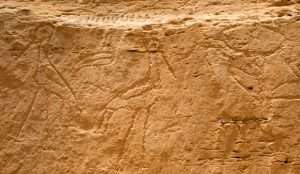
The Ibis bird between two Storks. The most ancient hieroglyph found {Abydos}. The very first one or at least the very first one found to mean ''horizon''. Migratory birds that can rise above the horizon to new realms; new dimentions - to stretch ones boundaries. Something in flight - towards an end result. Like the achievement of wisdom - represented with....? BACK TO BACK? 'Thoth' to enlarge.
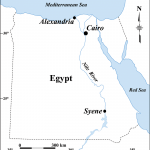 And/or: ''.....Osiris rises up as the divine integration of his two sacred sons, Anubis and Horus. As you become completely upright, the neteru, the seraphim, the angels and fairies, the star beings - all the spirit beings of the universe surround you as you are resurrected.'' [Page 190 'Shamanic Mysteries of Egypt'].
And/or: ''.....Osiris rises up as the divine integration of his two sacred sons, Anubis and Horus. As you become completely upright, the neteru, the seraphim, the angels and fairies, the star beings - all the spirit beings of the universe surround you as you are resurrected.'' [Page 190 'Shamanic Mysteries of Egypt'].
Abydos in relation to Denderah. 90 degrees V 180.
Spirit/Soul - as a means...?
The palace of Ramesses the Great recently found at Abydos - a walled up door/gateway, that led to it - along with the burial site of the Scorpion king - who he went out of his way to be identified with same. Just as the Ptolemies {later on} did with Ramesses. Enlarged elsewhere. ['Lost Treasures of Egypt' / 7/3/21].
And/or: ''I have already said too little and too much about the Stone of the Philosophers. Why should i not speak more plainly still? Why shouldn't i, too, prise open a small door in the King's shut palace? [ Page 369 'Mercurius' / P. Harpur].
3:12 to enlarge.

The ''eighth'' . Question. The beginning or end of a cycle?
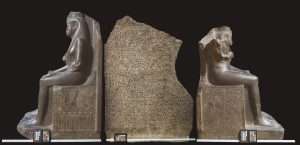
What's between them?
And/or: ''The Qing Dynasty of China - ruled by Father/Son and Grandson 1644 - 1912- The first of the Qing was named the ''Upright One'' ....Built China's largest empire. Created the essential shape of China today.'' [Michael Woods 'The Story of China' / PBS America / 18.2.16].
''James the Just''.
Three parts land one water?
'Hook' shape?
Recall the conjunction of Jupiter/Saturn {Part 1} - The Tudor Dynasty / Qing Dynasty . East/West. A beginning . An end. Opposite ends on the same pole.
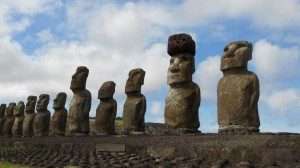
Volcanic 'Cliffs' on one side of the island - out of which the 'creation' of the Moai. On the OTHER side obsidian 'glass' quarried and spread all over the island. - Some IN AXE HEAD FORM. Spirit and soul as a means....? Which and Why? And/or: The most special place on the island is a spring of FRESH WATER purposely enclosed in a RIGHT ANGLED quadrant. UPRIGHT PILLAR that once supported the lone Moai { 'fallen' purposely nearby}. Palm trees grown with the FRESH WATER. Palm trees once covered the whole island. A beginning / end. Everyone speculates as to why the Moai were PURPOSELY laid FACE DOWN. Question. What do plants/tress {especially Palm trees} REPRESENT? Recall the 'flower head' found at Abydos.
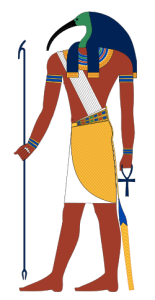
Thoth (from Koine Greek: Θώθ Thṓth, borrowed from Coptic: Ⲑⲱⲟⲩⲧ Thōout, Ancient Egyptian: Ḏḥwtj, the reflex of ḏḥwtj "[he] is like the ibis") is an ancient Egyptian deity. In art, he was often depicted as a man with the head of an ibis or a baboon, animals sacred to him. His feminine counterpart is Seshat, and his wife is Ma'at.[2] He is the god of the Moon, wisdom, knowledge, writing, hieroglyphs, science, magic, art, and judgment.
Thoth's chief temple was located in the city of Hermopolis
Henry ? {retrograde?}.
Conjunction of Saturn/Jupiter or just the Saturn cycle? As a means....?
Face to Face?
''Seven must die before the 'treasure' is found''. {'Curse of Oak Island'}.
A working example: ''Menkaure built a smaller pyramid than the other two - which was OBVIOUSLY unfinished at the time of his 'death'. Herodotus offers an explanation for this early death. An oracle reached Menkaure from the town of Buto, which said, 'Six years only shall you live on earth, and in the seventh your days will end'. Menkaure being a ''pious man'' - unlike his father and uncle {according to 'legend'} asked why. He was told that Egypt was fated to suffer affliction for one hundred and fifty years {'150'}: 'The two kings who preceded thee upon the throne understood this - you have not understood it'. [Page 112 'Ancient Egyptian Magic' / B. Brier].
144 / Pious Pelican / 150 / ''hoeing'' to enlarge.
Question. Was Hero-dotus a member of any ''Mystery club''?

'stretched'?
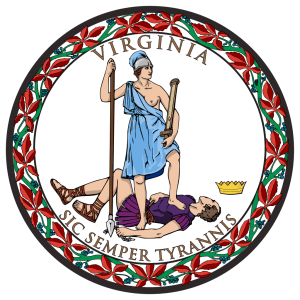
Pocahontas country.
A working example: ''The master of the house said to me: 'You have stretched your neck upward and attempted to see what is done. The brazen man is the priest who sacrifices and is sacrificed and spews forth his own flesh. Power is given to him and this water and over the people who are punished'. At last i was overcome with the desire to mount the seven steps and to see the seven punishments, and, as was suitable, in a single day; so i went back in order to complete the ascent. Passing it several times i at length came upon the path. But as i was about to ascend i lost my way again....discouraged i fell asleep....saw a barber in a robe of royal purple who stood outside the place of punishments. I followed him to the place ....He entered and was consumed by fire....I understood this to be the barber as the brazen man....Further on he meets ''an old man whitened by years,'' {Agathodaimon the leaden man}, who asks: ''Why are you stretched out''....who later on ''changes'' from lead to silver to gold. And/or ''Meridian of the Cinnabar'' in relation to the ''fourth step'' and ''from the east a person with a sword and a person behind ''clad in white and comely to see who was named Meridian of the Sun.'' All of which ''concerns the liquids in the art of the metals... a procedure called embalming'' [Page 61-64 ''Alchemical Studies'].
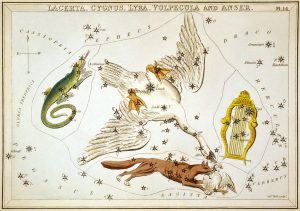
In the late 17th century, the astronomer Johannes Hevelius created Vulpecula. It was originally known as Vulpecula cum ansere ("the little fox with the goose") or Vulpecula et Anser ("the little fox and the goose"), and was illustrated with a goose in the jaws of a fox. Hevelius did not regard the fox and the goose to be two separate constellations, but later the stars were divided into a separate Anser and Vulpecula. Today, they have been merged again under the name of the fox, but the goose is remembered by the name of the star α Vulpeculae: Anser.
Continued: "The birds foot constellation was linked in Skidi Pawnee tradition with the Morning Star, seen by Chamberlain as Mars, the protector of the warriors. Its 'mark'...three straight lines, converging to a single point to form a 'v' shape........."The hawk and eagle were both symbols of the Morning Star. The Birds Foot constellation is occasionally named as 'eagle claw'. [Chapter five, 'The Cygnus Mystery' by A. Collins].
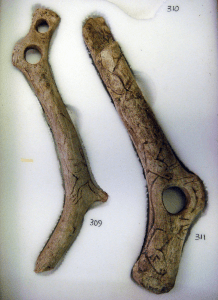
Magdalenian culture: Upper paleolithic reindeer antler tools with figurative art. Horse sculptured not carved. What could be 'feathers' on the right shoulder. Pegasus? {'Strange Things' S2 EP2 50min}.
''The pes anserine bursa is found in the knee joint, between the tibia and the pes anserinus tendons that connect the tibia and hamstring muscles. This group of tendons were named after their appearance — Pes anserinus is Latin for "goosefoot." [Wiki].
Side note: Skeletons found under the Moai statues platforms on Easter Island. Knee's of same purposely 'disjointed' i.e., can no longer be used in after-life. Something not yet completed. Question inner or outer? Recall Al -Qurn.
And/or knee's in relation to Saturn and Genuflecting with right or left knee.
And/or: ''To engage with Nature without losing our unique sense of being human is to stand {'upright'?} in the middle of a Medicine Wheel. Plato talked of the eight spheres of 'heaven', that are attached to a spindle that ''turns on the knees of necessity''. This spindle is the world tree, and our own axis. From this perspective we view the eight major directions about us that join in a circle to form the perimeter of our world view.'' [ Page 215 'Fruits of the Moon Tree'].
Bee's knees?
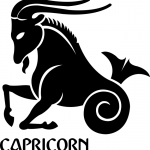
Coincidence? 'Spinning' a tale?
Three parts water one land?
Something extra: 'Sign of the Three Rays'. Page 112 'The 21 Lessons of Merlyn' / D. Monroe.
 Cygnus, which some call the Northern Cross, the emblem of which is the Swan. Question. What does the 'swan' represent?
Cygnus, which some call the Northern Cross, the emblem of which is the Swan. Question. What does the 'swan' represent?
"The white swan is mythologically represented as the vehicle or mount of Brahma the 'creator'. The sacred 'hansa', said to have the power of extracting milk from a mixture of milk and water, is thus a symbol of spiritual discrimination." [Extract from the book 'Autobiography of a Yogi'].
Question. Why milk? Clue. What does it represent?
''In Botany the root that stabilizes a plant is called an anchor root.'' AND/OR: ''When water is added to grain it is called Oat milk.'' ['The Chase' / 11.3.22].
Side note: {A working example?}: ''Without blemish'' - a title given to women by Amenhotep the third.
And/or: ''Your lamb shall be without blemish, a male of the first year; to be taken out from the sheep or the goats; to be kept until the fourteenth day of the same month; to be eaten with unleavened bread and bitter herbs 'roasted with fire'....on the eve.'' [Exodus 12:5].
Drachma to enlarge.

All wool: Emphasis on right 'breast' and 'knees'? "Hands"?
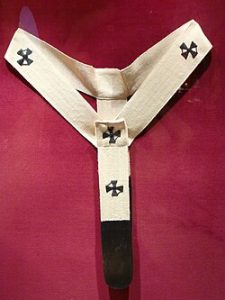
Fork in the road?
And/or: Tre Fontane Abbey (English: Three Fountains Abbey; Latin: Abbatia trium fontium ad Aquas Salvias), or the Abbey of Saints Vincent and Anastasius, is a Roman Catholic abbey in Rome, held by monks of the Cistercian Order of the Strict Observance, better known as Trappists. It is known for raising the lambs whose wool is used to weave the pallia of new metropolitan archbishops. The pope blesses the lambs on the feast of Saint Agnes on January 21. The wool is prepared, and he gives the pallia to the new archbishops on the Solemnity of Saints Peter and Paul, the Holy Apostles.
Belonging to the monastery are three separate churches. The first, the Church of St. Paul of Three Fountains, was raised on the spot where Paul of Tarsus was beheaded by order of Nero. Legend accounts for the three springs (fontane) with the assertion that, when severed from Paul's body, his head bounced and struck the earth in three different places, from which fountains sprang up.[1] These still flow and are located in the sanctuary.
Pegasus?
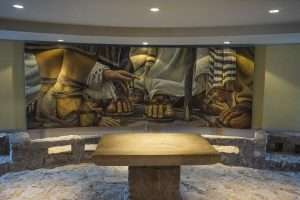
'Pure' touch?
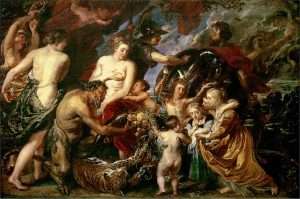
"Minerva protecting Peace from Mars or Peace and War is a painting by Peter Paul Rubens." REFRESHER: An enactment at Thebes within the Sed Festival of Amenhotep showing - monkey, pintail duck and a leaping bull calf in relation to: 'A new royal body has to be roasted and created by the female {Hathor} if the king is to be reborn again...The coming of 'gold' that reinfuses him with life and vitality, initiating him to a new shining existence at dawn.'' [Pages 27/8 'Hathor Rising' / A. Roberts].
REFRESHER: 'The star of your Being is rising'? Can u SEE the 'triangular' formation of figures in the MIDDLE. The apex of which is the metal helmet. The fruits of ones labours?
Continued: Analogy {i.e.,Egyptian culture} but because that key {i.e.,''milk''} is universal - more information can be 'extracted' from it - more 'information' that defines the parts within the whole: "Alabaster probably originated from limestone in a liquid or muddy state, whence come its grey, brown, or rosy whorls floating in it like veils, as if this matter were in a state of becoming from a more terrestrial state toward a more subtle, flowing, state that could be compared to cream rising to the top of milk. It is curious, in this connection, to note that 'ankh uas' {the sap of life} is one of the designations of milk, and that 'ankh'{ life} sometimes also serves to designate alabaster or some object executed in this material. But the term most specifically designated alabaster is 'ches', a phonetic group which, depending on the determinative, can also mean an edible grain, or something precious. Alabaster is frequently qualified as clear or pure, followed by the name of its place of origin, the most famous being 'Hat-nub' {''house of gold''}. It is the name of an important alabaster deposit in the Arabian Mountain, located about 20 kilometers S/E of Tel el-Amarna...Among the famous monumental masterpieces in alabaster is the sanctuary of Thothmes III at Karnak, designed to house the sacred boat of Amon; each of its walls is made from a single piece of alabaster 8 meters in length..." ['Sacred Science' / R. A. Schwaller De Lubicz]. Try ''grain'' and/or ''becoming'' and/or ''wet/dry'' {i.e.,''muddy''} and/or ''Amarna'' and/or ''Amon''.
'Milk Hill'. Whiltshire. S/W England.
'EIGHT'?
Exercise: If the ''house of the sacred boat'' represents a becoming of something - what does the boat represent - and what 'materials' would be used?
''In Botany the root that stabalises a plant is called an anchor root.'' AND/OR: ''When water is added to grain it is called Oat milk.'' ['The Chase' / 11.3.22].
Mosses are small, non-vascular flowerless plants in the taxonomic division Bryophyta (/braɪˈɒfətə/,[3] /ˌbraɪ.əˈfaɪtə/) sensu stricto. Bryophyta (sensu lato, Schimp. 1879[4]) may also refer to the parent group bryophytes, which comprise liverworts, mosses, and hornworts.[5] Mosses typically form dense green clumps or mats, often in damp or shady locations....Mosses do not have seeds and after fertilisation develop sporophytes with unbranched stalks topped with single capsules containing spores. They are typically 0.2–10 cm (0.1–3.9 in) tall, though some species are much larger. Dawsonia, the tallest moss in the world, can grow to 50 cm (20 in) in height. There are approximately 12,000 species.[2]
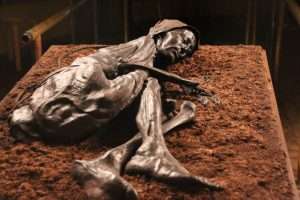
Peat bog?
Mosses are commonly confused with liverworts, hornworts and lichens.[7] Although often described as non-vascular plants, many mosses have advanced vascular systems.[8][9] Like liverworts and hornworts, the haploid gametophyte generation of mosses is the dominant phase of the life cycle. This contrasts with the pattern in all vascular plants (seed plants and pteridophytes), where the diploid sporophyte generation is dominant. Lichens may superficially resemble mosses, and sometimes have common names that include the word "moss" (e.g., "reindeer moss" or "Iceland moss"), but they are fungal symbioses and not related to mosses....The main commercial significance of mosses is as the main constituent of peat...

Spots of.....?
Moss has threadlike rhizoids that anchor them to their substrate, comparable to root hairs rather than the more substantial root structures of spermatophytes.[17] Mosses do not absorb water or nutrients from their substrate through their rhizoids.[citation needed] They can be distinguished from liverworts (Marchantiophyta or Hepaticae) by their multi-cellular rhizoids. Spore-bearing capsules or sporangia of mosses are borne singly on long, unbranched stems, thereby distinguishing them from the polysporangiophytes, which include all vascular plants."
Something to ponder on: "Upon entering the tomb and catching the first glimpse of the treasure trove it had been harbouring for thousands of years, Howard Carter uttered two words in response to Lord Carnarvon question: 'What do you see'? ''Wonderful things'' replied Carter. Interestingly, those also happen to be the words inscribed on one of the first of many objects they discovered on that first day: the magnificent alabaster chalice - inscribed with prayers and wishes for the boy king. It read: ''May you live thousands of years. May your eyes 'see' wonderful things." [Readers Digest. December 2019].

Steering wheelof {of say} a chariot/car or just a 'solar' symbol?
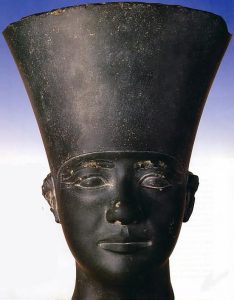
Follow the sides of the {crown?] down to the chin. What does the ''inverted'' triangle represent? And/or Lotus shape?
'Wonderful things' also seen within temple complexes - that took over from ''pyramid'' construction - from the 5th Dynasty onwards. Beginning with Userkaf. Alabaster bowls {shaped like flower heads?} SET within a square frame {'squaring the circle' motif?} - that contains Purified water that is allowed to 'flow' into channels that 'journey' east-west. All temples orientated north-south - the beginnings of which {foundations?} in the MIDDLE between Saqqara and Giza {i.e., Abu Ghurab}. The narrators speculate as to why : ''To much stone used by previous rulers''.
Try ''octave'' to get closer ''to the mark''.
Fire / Water as a means.......

From a different perspective i.e., 'fire' / 'water' link.
And/or: The river flowing down into the capital of Ankor Wat {ALSO north-south} - has ceremic plates embedded purposely all along the river bed - of the 'square and circle' symbol.
Return to the source?
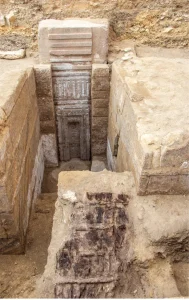
The newly discovered Tomb of Prince Userafra, son of Userkaf, containing a pink granite false door before which is an inscribed circular offering table.
Side note: A new Fifth Dynasty tomb has been discovered at Saqqara by an Egyptian mission led by the Supreme Council of Antiquities and the Zahi Hawass Foundation for Antiquities and Heritage. The 4,400-year-old tomb belongs to Userafra, a previously unknown son of King Userkaf (the founder of the Fifth Dynasty, c.2494-2487 BC), whose titles describe him as Hereditary Prince, Vizier, Judge, ‘Chanting Priest’, Royal Scribe, and Governor of Buto and Nekheb. The tomb contained a huge pink granite false door (4.5 metres in height), the first of its kind to be found at Saqqara, in front of which is a red granite offering table, 92.5cm in diameter, inscribed with offering lists. A secondary granite entrance on the eastern façade was inscribed with the name of Userafra and the cartouche of King Neferirkara, the third king of the Dynasty (c.2475-2455 BC).
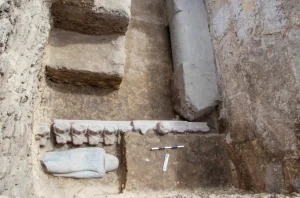
The statue of Djoser, his wife, and ten daughters that was placed in the tomb during the Late Period.
The team also discovered a black granite statue of a man measuring over a metre tall, with hieroglyphic inscriptions on his chest. The statue, dating to the Saite Twenty-sixth Dynasty (c.664-525 BC), suggests the tomb was reused during the Late Period. A rare statue depicting the Third Dynasty king Djoser (c.2667-2648 BC), with his wife and ten daughters, was found as well. This was probably taken from the Step Pyramid complex at this time, although the reason it was moved to the tomb is not known.
Ishon or 'giant'? Younger or 'elder'?
And/or: ''The scribal palettes are life-size, but there are no holes for ink nor for stylus. Evidently, they were made for burial, but it is also notable that Amenhotep {High Steward} had several of them.....It might relate to his title of 'Kings Scribe'.....'' [Page 30 'Ancient Egypt' / Sep-Oct 2023].
Tattoo's?
''Thoth was the god of the moon, sacred texts, mathematics, the sciences, magic, messenger and recorder of the deities, master of knowledge, and patron of scribes. His Egyptian name was Djehuty, which means “He who is like the Ibis.” He was depicted as an ibis bird or a baboon.''
Senenmut to enlarge.

Wearing one?

Who is the patriot?
REFRESHER: "Gudea made offerings of honey and butter when the foundations were laid; when the building was finished an auspicious day was waited for, and when it came the image of the god was removed to the new temple, and Gudea sprinkled the ground with oil, and set out offerings of honey, butter, wine and dates, grain mixed with milk, food untouched by 'fire', for the gods." [ Chapter 3, 'The Sacred Bee'].
"O children of Adam. Indeed, we have given you garments to cover your 'nakedness',[key] and as a thing of beauty;...but the garment of god-consciousness is the best of all. This is one of gods messages....that human beings might take it to heart". [Quran 7:26].
''The beautiful lady has come''?
Side note: That ''heart'' that was missing on the body of Tut. But of which the Scarab beetle - which is normally represented with the heart - was instead found over 'his' navel. The MIDRIFF of the human form. In other words when the time comes for Akhenaten to be found - he will be found not with Nefertiti but with the heart of Tutankhamun - which REPRESENTS the feminine aspect - just as the Shulamite does with Solomon. Other clews throughout.
''Seat of First Occasion''?
Question. What will be the ''feminine'' aspect - when found within the Giza complex? [OR what represents the ''Giza complex''].

A 'birthing'. Recess or gateway?
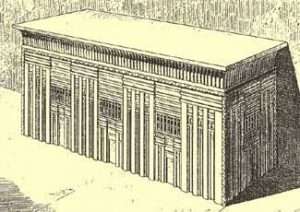
Unconscious = 'shadow' = ''recesses'' = 'crevice'?
Side note: ''This concept of Celli Wig, a seat of government and therefore symbolic of the central recess of Arthurs soul, raises the whole question of the significance of the topographical description insisted on throughout this myth. That a 'boar hunt' should range from the west of Ireland, across the Irish Channel, to West Wales, thence to South Wales as far as the river Severn, and now be threatening Cornwall, clearly indicates some psychic concept.'' [Page 163 'A Celtic Quest' / J. Layard].
And/or: The name Demelza is girl's name of Cornish origin meaning "fort on the hill". Complex and challenging modern Cornish name derived from a place name. The given name began to be used in the U.K. in the 1950s via the serialization on British TV of the Poldark novels of Winston Graham, whose heroine was named Demelza.'' [Wiki].
A work in progress: ''Descending Mount Nimrod....we came to another important Commagene sanctuary at Eski Kale {the old fortress}....most probably the main spiritual shrine of ancient Commagene as it was very much more accessible to the capital of Arsameia-ad--Nymphaeum, and unlike the peak at Mount Nimrod, could be visited all year round.'' [Page 127 'Magi: Quest for a Secret Tradition'].
Muses?
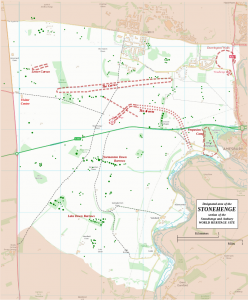
Woodhenge/Stonehenge. Descend/Ascend / Manifest/Unmanifest / Which and why? Question. Wooden posts? placed into external holes {'fiftysix'?} PRIOR to the 'creation' of those internal Stone ones? Burnt? BEFORE the blue ones placed? Hence ''ashes'' found. Question 2. Human bones only or Oak?
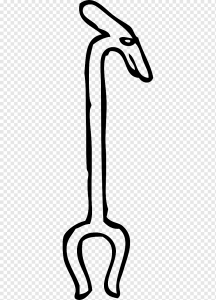
REFRESHER; ''thirty and sixty were expressed by certain figures made with the left hand, while a 100 was the circle formed by the thumb and index finger of the right hand = ''fulfilment and eternal life.'' [Page 240 'Mystery of Numbers'].
Question. Karnak = ''manifested'' ?
Question. ''Manifested'' in what sense? Recall Mr Jung's statement in the ''Help'' section.
Then try ''child''.
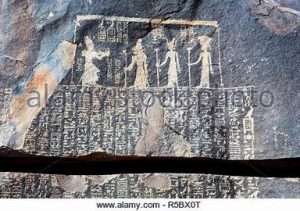
Entry or exit?

Folded or UNfolded? 'GAP' between fingers?
''Hieroglyphs at Philae's temple of Isis refer to milk as ankh-was {'uas'}, or 'life and power'. Milk seems to be infused with this magical element of transferring life and power to the one who is deceased, much in the way that the breast milk of the mother keeps her infant alive and growing....There seems to be this connection in the mind of the Numbians. For the Nubians, then, milk would have been the ideal offering to aid in the rebirth of Osiris. Milk libation rituals would have been performed during annual funerary rites of Osiris. Known as the Festival of Entry - during the month of Khoiak, in the early FALL, when the Nile flooding reached its peak...Nubian inscriptions found on such buildings as the Gate of Hadrian and a room in the temple of Isis known as the Meroitic Chamber....The longest such inscription at Philae as well as in Egypt {twentysix lines}-dated April 10 AD 253 gave a command by the king of Meroe to throw a party/feast {'joy/grace' link?} - for the entire district...celebrated for eight days. From A LONG colonnade along the west side of the island people could watch the entourage cross the Nile to the Abaton sanctuary on Bigga to worship Osiris.'' [ Page 30/1 'Archaeology' / Nov/Dec 2021].

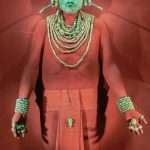
Palenque: Red tongued?
Side note: In ancient Egypt, the ostrich feather was the hieroglyph for Maat, goddess of right order. In later dynastic times, it was thought that the heart of the deceased was weighed against the feather of Maat. Depending on the result, the dead entered the land of the blessed, or was swallowed into the void, suggesting that the heart of one who had lived life in balance should be at the end “light as a feather.”..........
Reincarnation or Resurrection?
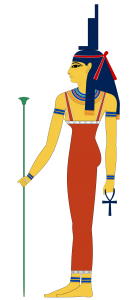 Smith/ Jones to enlarge.
Smith/ Jones to enlarge.
Feathers are sensitive to the slightest wind, and thus are emblems of psyche’s capacity to pick up “invisible and imperceptible currents” (von Franz, 49). If we take note of these and follow up on them, as happens in some fairy tales, we can be shown new possibilities, or discover where psychic energy is tending. Thoughts, intuitions, imagination are often depicted as feathers that are caught up and carried on the breath of inspiration. Feathers form the wings with which one can transcend the concrete, escape confinement and soar to creative heights or spiritual vision. Alchemy conveyed by the changing colors of the feathers of the bird of spirit the stages of the opus: In the nigredo they were black, since much was still in the dark; in the albedo, white, since understanding had brought things into the light; and in the rubedo, red, for the actualization of the insights that had dawned. {The Book of Symbols / Taschen}.
Rising sun? Summer or winter. Solstice or equinox?

Denys - A present day hero from the Ukraine. ['Panorama' / BBC1].
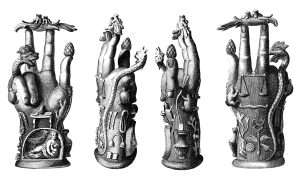
The hand of Sabazios. Thumb = pinecone?
''Sanctuary of the Soul''? [Page 2 'The Hero and the Goddess: The Odyssey as Pathway to Personal Transformation' / J. Houston].
The favorite of her 26 books.
Taj Mahal to enlarge.
Side note: Hadrians Gate in relation to Hadrians Wall relative to: ''Ancient Egyptian name for Philae = Pilak = 'Island of Time' or 'Island of Extremity'- may have been of Nubian origin.''
'Sycamore Gap' to enlarge.
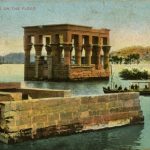
Kiosk at Philae facing east. Rising sun?
25th Dynasty. What does 'twentyfive' represent? Synchronistic link?

'Eleven'?
Side note: ''The Shabaka Stone, sometimes Shabaqo {'shabatu'?}, is a relic incised with an ancient Egyptian religious text, which dates from the Twenty-fifth Dynasty of Egypt.[1] In later years, the stone was likely used as a millstone, which damaged the hieroglyphs....The stone's dedicatory introduction claims that it is a copy of the surviving contents of a worm-ridden, decaying papyrus found by the pharaoh Shabaka in the Great Temple of Ptah.[6] Homer W. Smith dates the original text to the First Dynasty, calling it "the oldest written record of human thought".[7]
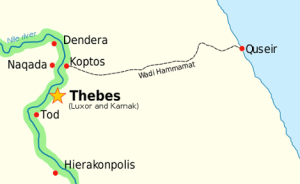
Recall the dry river beds at Abydos and Petra.
Breasted, Adolf Erman, Kurt Sethe, and Hermann Junker all dated the stone to the Old Kingdom.[8] The stone is archaic, both linguistically (its language is similar to
that used in the Pyramid Texts of the Old Kingdom) and politically (it alludes to the importance of Memphis as the first royal city).
In 1901, James Henry Breasted identified the stone as a rectangular slab of black granite.[11] While other scholars postulated that the monument was a slab or basalt or a conglomerate stone, a recent analysis by a scientist of the British Museum revealed the stone to be green breccia originating from Wadi Hammamat.''
'Coptos' to enlarge.
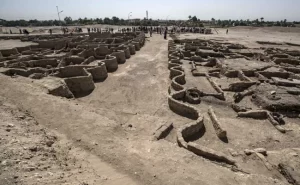
The new city: ''The signs Gemini and Virgo are alloted to Mercury. This association accounts for Virgo sometimes represented with the caduceus.''
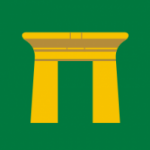
Something 'new'.
Continued: ''Curiously enough, one of the few, if not the only, archaeological evidences of a cult of Virgo is to be found in Roman Britain. The prefect of a cohort stationed at the eleventh fort on Hadrian's Wall in Northumberland in the time of Severus emperors {third century}, raised an inscription to Virgo, in which the familiar figure, bearing her usual attribute, the ear of corn {specifera}, is the object of a syncretist worship which combines the Carthaginian Queen of Heaven, Virgo Caelestis, with the mother of the gods, with Ceres, with Atargatis, the Syrian goddess, yet she is still the JUST virgin goddess of the golden age: 'inventress of justice, foundress of the city'....'' ['Astraea: The Imperial Theme in the Sixteenth Century' / F. A. Yates].
Something extra: "According to Geoffrey of Monmouth, a 12th-century British cleric and writer, Ursula was the daughter of Dionotus, ruler of Cornwall. However, this may have been based on his misreading of the words Deo notus in the second Passio Ursulae, written about 1105. The plot may have been influenced by a story told by the 6th-century writer Procopius about a British queen sailing with 100,000 soldiers to the mouth of the Rhine in order to compel her unwilling groom Radigis, king of the Varni, to marry her.
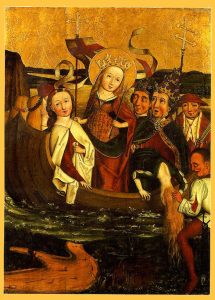
Common factors? Beginning or end? East or west?
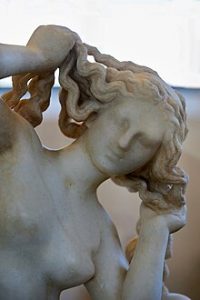
Scholars in the late-nineteenth and early-twentieth centuries, accepting Hesiod's "foam" etymology as genuine, analyzed the second part of Aphrodite's name as *-odítē "wanderer"[8] or as *-dítē "bright".....Hesiod derives the name Aphrodite from aphrós (ἀφρός) "sea-foam",[4] interpreting the name as "risen from the foam", 'EXPAND'?
This was subsequently misread or misinterpreted as undicimila ('eleven thousand'), thus producing the legend of the 11,000 virgins.[14] In fact, the stone bearing the virgin Ursula's name states that she lived eight years and two months. Another theory suggests that there was only one virgin martyr, named Undecimilla, "which by some blundering monk was changed into eleven thousand".[15] It has also been suggested that cum [...] militibus, "with [...] soldiers", was misread as cum [...] millibus, "with [...] thousands".[16] Most contemporary sources, however, cling to the number 11,000. The Passio from the 970s tries to bridge conflicting traditions by stating that the eleven maidens each commanded a ship containing one thousand virgins. Implicitly, the legend also refers to the twelve heavenly legions, mentioned in Matthew 26:53.
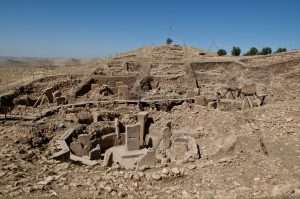
Quantity/Quality: The ''quality'' is an internal process/journey. BACK through those layers. A return to the 'source'. A centering within. 'Young' = virgin/seed link. The beginning of something. A solitary tree was found on top. 'Perseus' to enlarge from the mythical SENSE of the word.
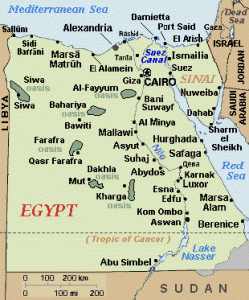
Hypotenuse?
As seen from a different perspective: "No, the problem at Gobekli-Tepe is the pristine, sudden appearance, like Athena springing full-grown and fully armed from the brow of Zeus, of what appears to be an already seasoned civilization so accomplished that it 'invents' both agriculture and monumental architecture at the apparent moment of its birth...Yes. But the strange thing is that there was a clear collapse in the effort that was made as the centuries went by... The truly monumental structures are in the older layers; in the younger layers they get smaller and there is a significant decline in quality...So the oldest is the best?...Yes, the oldest is the best...And you don't find that puzzling?...The answer to the mystery is of course obvious but, because it is repellent to the prevailing cast of modern thinking, it is seldom considered. Gobekli-Tepe was not a development but a legacy..." ['Magicians of the Gods'].
Question. Manifested/UNmanifested - as a means...?
'twentythree' layers?
Question 2. Where within that mountain of a monument would the feminine aspect be represented? Has it been discovered yet? Has the author touched on it if only in the synchronistic sense of the 'word'? Try ''Hatshepsut'' for a 'direction' to follow.

"Not out but through" {C. Jung}.
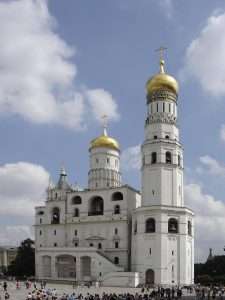
Onions. "Layers" of a different kind. From a different perspective. 'Right angle'?
"Well, we hope that eventually we will discover even older layers and that there we will see the small beginnings that we expect but haven't yet found...We are used to things starting out small and simple and then progressing - evolving - to become ever more complex and sophisticated, so this is naturally what we expect to find on archaeological sites. It upsets our carefully structured ideas of how civilizations should behave, how they should mature and develop, when we are confronted by a case like Gobekli-Tepe that starts out perfect at the beginning and then slowly devolves until it is a pale shadow of its former {'elder'?} self..." Same book.
Question. Top/down or bottom/up as a means...?
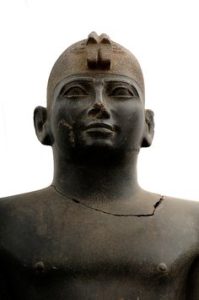
Dragons and serpents: ALL Kushite pharaohs wore two serpents.
From a different perspective: "Christians believe that the story of the fall and redemption is a story of two Adams, and sometimes refer to Christ as the "Second Adam".
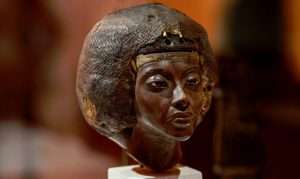
Tiye: 'The great of dread in the foreign lands'. Berber origins?
The first Adam sins and causes humanity to fall; the second Adam atones for that sin with his death and redeems humanity. The story behind original sin is told in the Old Testament book of Genesis: God originally made a perfect world. He created Adam and put him to live in the Garden of Eden - a blissful place where he had nothing to do but take care of the garden.
God told Adam that he could do anything he wanted, except eat the fruit of the tree of the knowledge of good and evil. Later, God created Eve to be Adam's wife. Eve was tricked by the serpent into eating the fruit of the tree of the knowledge of life and death. She gave some of the fruit to Adam and he ate it too. Adam and Eve realised that they were naked and hid in shame. When God next visited the Garden he realised that they had disobeyed him. God banished them from the Garden of Eden into the harsh world outside. God also banned them from eating the fruit of the tree of life, and so death entered the world."
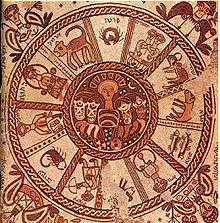
'Eleven' or 'twelve'?
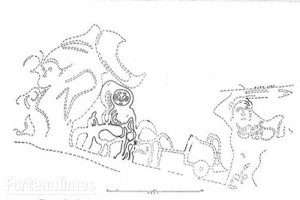 Giant/Dwarf to enlarge.
Giant/Dwarf to enlarge.
Side note: Gogmagog (also Goemagot, Goemagog, Goëmagot and Gogmagoc) was a legendary giant in Welsh and later English mythology. According to Geoffrey of Monmouth's Historia Regum Britanniae ("The History of The Kings of Britain", 12th century), he was a giant inhabitant of Albion, thrown off a cliff during a wrestling match with Corineus (a companion of Brutus of Troy). Gogmagog was the last of the Giants found by Brutus and his men inhabiting the land of Albion.
The effigies of Gogmagog and Corineus, used in English pageantry and later instituted as guardian statues at Guildhall in London eventually earned the familiar names "Gog and Magog".
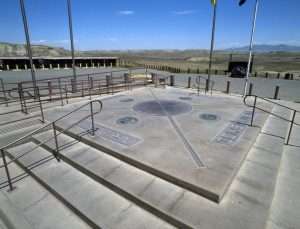
"Four Corners Monument, marking the only spot in the United States where four states (Arizona, Utah, Colorado, and New Mexico) come together."
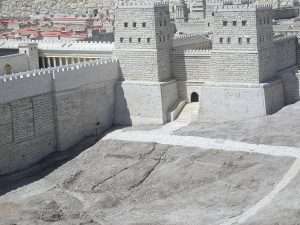
A corner of the Temple Mount.
Continued: OR put another way involution v 'evolution' IN THE SPIRITUAL SENSE OF THE WORD.
Geocentric?
Something hinted at: ''Profound progress in thinking will not come about by the demonstration of a new geometric theorem. In what way is evolution assisted by showing the relationships of the Golden section to the pentagon and that into a hexagon, as well as all the logical sequences of the Platonic solids - i know these things - as such they only represent mental satisfaction. It is more important for me to discover, in the functions of Phi, of Pi, and of the pentagon, the function that compels them to be what they are. It is more important to know why, through the spring equinox, the male mollusk becomes female..." [ Page 60 'The Egyptian Miracle'].
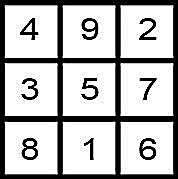
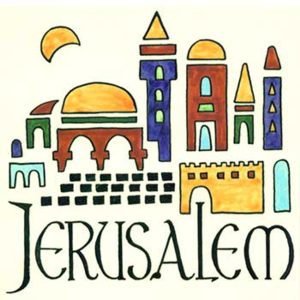 AND/OR: Something hinted at {i.e.,in the 'archetypal' sense of the word}: "Saturn 'invented' agriculture; this god of the earth and the peasant, the harvest and the Saturnalia, is ruler of 'fruit and seed'. Even his castrating sickle is a 'harvesting' tool. It would have to be 'Saturn' who invents agriculture: only the senex {''old man'',i.e., elder link} has the patience equalling that of the soil and can understand the soil's conservation and the conservation of those who till it; the ability to abstract so as to master the geometry of 'ploughing', the essence of seeds..." ['Saturn and the Theoretical Foundation of an Emerging Discipline'. Emphasis, this readers].
AND/OR: Something hinted at {i.e.,in the 'archetypal' sense of the word}: "Saturn 'invented' agriculture; this god of the earth and the peasant, the harvest and the Saturnalia, is ruler of 'fruit and seed'. Even his castrating sickle is a 'harvesting' tool. It would have to be 'Saturn' who invents agriculture: only the senex {''old man'',i.e., elder link} has the patience equalling that of the soil and can understand the soil's conservation and the conservation of those who till it; the ability to abstract so as to master the geometry of 'ploughing', the essence of seeds..." ['Saturn and the Theoretical Foundation of an Emerging Discipline'. Emphasis, this readers].
Therefore ''old/elder man'' = 'Ploughing'? What about 'hoeing'?
Queendom to take a step further.
Try ''Saturn'' to see a possible beginning/end {start point?} - in the astrology {night sky} - sense of the word. Especially in relation to ''essence''.
''The head of the 'fish' should face the eldest.'' Chinese dining custom. Coincidence or a...?
Therefore the 'tail end' begins...? {S/E?}.
Put those ''keys'' together to 'see' the parts within the whole. To define the inner workings of our ancestors. Question. Anthropology?
N.B. Whether or not you agree with the statement - ''that it 'invents' both agriculture and monumental architecture...." - the most important word within those opinions is the final one {i.e.,'legacy'}.
REFRESHER: "The children of Seth [Set] first possessed that peculiar sort of wisdom, which is concerned with the heavenly bodies",[chapter five.' The Sirius Mystery'], i.e., from an 'unknown'[and/or 'negative', and/or 'shadow' origin. Possible link to 'sacrifice'?] start point, with a purpose in mind. All as a representation of something...outside, of the obvious.
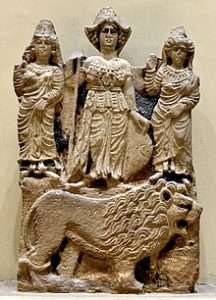
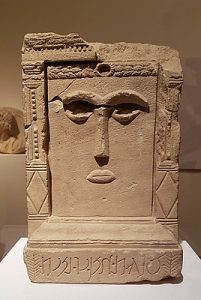
Square on? Face to face?
"He who aspires to be a sage and to know the Great Enigma of Nature must be the heir and despoiler of the Sphinx: his the human head, in order to posses speech; his the eagles wings, in order to scale the heights; his the bulls flanks, in order to furrow the depths; his the lions talons, to make a way on the right and the left, before and behind." [Quote taken from the chapter entitled 'The Candidate' from the book by E. Levi]. Try ''furrow'' then ''paw''.
And/or: ''These 'angels' are described as a composite of Ox, Lion, Eagle and Man. They are the 'Elements' themselves on a higher level, being the Fixed signs of Taurus, Leo, Scorpio, and Aquarius...Strength and Patience for the Ox, courage and nobility with the Lion, swiftness and aspiration with the Eagle, and intelligence and devotion with Man.'' [Page 31 'Ladder of Lights' / W. Gray].
And/or: from a different perspective ,i.e., the 'ritual' one. But because those {concepts?} are universal - sense can be got from it; if only to determine a MINDSET - especially when including {and therefore considering} - that universal ''bit'':
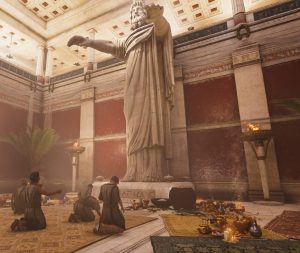
Extended {'stretched'?} arms and hands? To where?
"If you are uncertain about making these pieces of equipment you can meditate upon the four Tarot aces, or visualize pictures of the 'magical' work you wish to do....As you work on each item, think of how it is an extension of a part of your inner self. The 'pentacle' is your shield of self sufficiency; the 'cup' {and/or cauldron} your ability to feel and sympathize; your 'sword' or knife is the part of you that can make a way clear ahead and get round obstacles; the 'wand' is your purpose, your Will to succeed and the application of your inner strength." [Page 98 from the book by Marian Green].
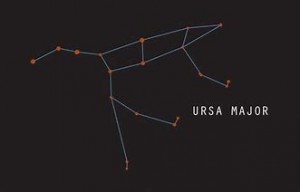
Tail end = the ''handle'' on something?
Something extra: {something hinted at}: "Mystery surrounds many manmade stone markers and edifices. They defy explanation until we connect them with the zodiacal 'religion'. The Sphinx is undoubtedly the foremost among them, because everything points to it being a zodiacal monument. It represents the four cardinal points of the compass and cross within the circle of the zodiac. This enigmatic edifice could well be the symbol for Nebo, the Winged Man, with the human head representing Aquarius/ Water; the body of the bull represents Bel/Taurus, the Earth; the paws of a lion for Leo/Fire, the Winged Lion, Shamash the Sun; and the wings of an eagle for Scorpio/Air ruled by Ninib. This symbolizes the constellations of Leo and its opposite house, Aquarius....The four figures of the Book of Revelation were the Lion/Ox/Man/Eagle. The Sphinx faces the eastern horizon where the sun rises in the spring and autumn equinoxes....Most cathedrals are built in a cruciform ground plan on an axis east-west and the internal emphasis on the eastern end where the 'altar' is placed {altar of 'sacrifice'?}. The construction of the early European cathedrals....demonstrates the specific architecture that incorporates twin pillars at the west end, drawing worshippers into the 'holy' place down the nave towards the east. The word nave = Latin for 'ship' - is where everyone congregates. The ship features in legends - as in the 'arc' {key} of heaven, whose pilot Ursa Nebo traversed the heavens, and Noah's arc of the great flood..." [Page 9/15 ' Pathways to the Zodiac' / E. Winstanley].
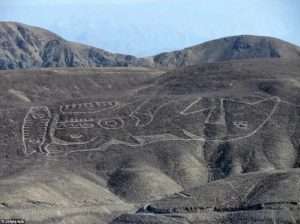
The Nazca killer whale.
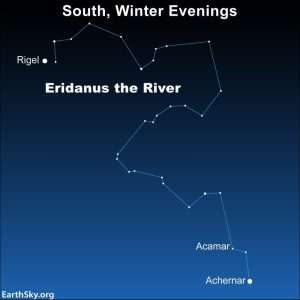
Inner guardian? {of the 'threshold'}. Cetus to enlarge.
Compass of the Heart?
''The inner guardian is our true North, the keeper of the charts.'' Try 'map' / 'whale'.
Try ''Leo/Aquarius''.
Temple of the winged lion at Petra.
A practical example: ''I was the shyest creature in the world, but i had a lion inside me that wouldn't stay quiet.'' Ingrid Bergman.
''There's a fire within my soul.'' {'Mamma Mia' / Abba].
Try Red lion / Green lion to get closer to a mindset.

Spot the difference.

Chumlee Russell or James Horncastle?
Refresher: "In Canis Minor lay a part of the contracted {kneeling?} forearm, or Paw, of the early Lion {Asad}; the other, the Extended Paw, running up into the heads of Gemini...Canis Minor lies to the S/E from the feet of Gemini, its western border over the edge of the Milky Way, and is separated by Monoceros from Canis Major and Argo." [Page 133, 'Star Names and Their Meaning'].
The above is a good example of this subjects purpose, to the reader, of its depth of 'understanding' by way of symbolism. What the authors of the 'The Master Game' loosely term as Talismanic thinking. If the authors had as deep an understanding of the subject as a 'whole' and not just in its historical context, then they would understand that "the father of light",[chapter thirteen.'The Master Game']... does indeed appear in the bible, especially in the Old Testament, 'by way' of 'Yahweh',[''Adonai''] One of its most frequently used words. Explained above, but more importantly, it explains why.
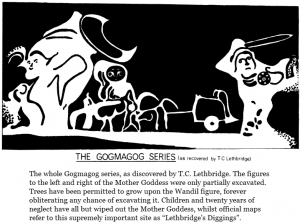
''The round object in the goddess' left hand is thought to be an 'Apple of Life'. [Page 53 'GogMagog'].
Side note: "The metal worker knows the mystery of 'fire' transmutation. The tinker and jobbing blacksmith knows the mystery of metal and has the Horseman's Word - the means of controlling animals, the lingua franca {i.e., a 'bridge' language} or shelta {i.e., 'cant' language} of all smiths. And as such people were under the patronage of the goddess Brigid, so the alchemist pays careful attention to the service of the Anima Mundi of Our Lady Earth. The alchemist was the midwife and priest of transmutation...." [Page 203 'The Western Way'. Vol 2].
Think about it in relation to the language of 'oc', [Occitania. Explained elsewhere], together with the Romany 'cant' language, of which it is said a secret was given to same, at the fall of the Egyptian rule. All enclosed within 'picture' cards. Those same picture cards that the author of 'Meditations on the Tarot' ['A Journey into Christian Hermeticism' ], refers to as 'arcana'.
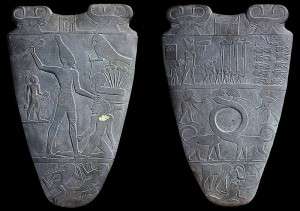
The Narmer Palette. A representation of the union of upper and lower Egypt. Found in the city of the FALCONS. Plenty of keys [arcana] in which to understand the whole. Red in relation to white. Falcon in relation to the tool used in the opening of the mouth ceremony. [Made of iron]. Flail in relation to head gear. Kneeling relative to upright, both of which are standing over fleeing naked individuals. Indicative of something outside of the obvious. Other keys to decipher - bald chap, sandals, basket, cow, bull. Its most important key however, being those two animals that unite with their necks. A picture representation of same. Using a collar as its main key. Recall what collar represents. The neck being the bridge between the head and the body. As it is with the head and body of the Sphinx. Indicative of higher and lower Indicative of the benefits of that understanding. That understanding of a union. [Potential of]. That same union {i.e.,Festival of the Re-union - enlarged elsewhere} - that within this subject is represented {in part} with the heart key. Notice the shape of what those keys - what all that 'information' are inscribed within. That same shape that could also, be referred to as an arrow point. Recall what its symbolism, represents. Both when understood, by way of objective reasoning , have a common factor the analogy of which, could be described by way of cupids arrow. N.B. 'Consort' of Cupid = 'Psyche'. This subjects primary ''teaching'' aid. Question. Coincidence? Or a meaningfull one?
"An arcanum is that which is necessary to 'know' in order to be fruitful in a given domain of 'spiritual' life. [i.e.,the same meaning as ''esoteric'',i.e.,'inner' or 'within'. Check it out]......
'The fruit of ones labours' = The 'Horn of Plenty'?
.....It is that which must be actively present in our consciousness - or even in our subconscious - in order to render us capable of making discoveries, engendering new ideas, conceiving of new artistic subjects. In a word it makes us fertile in our creative pursuits, in whatever domain of spiritual life. An arcanum is a 'ferment' of an 'emzyme' whose presence stimulates the spiritual and the psychic life of man and woman. And it is symbols which are the bearers of these 'ferments' or 'emzymes', which communicate them - if the mentality and morality of the recipient are ready, i.e.,"if he is poor in spirit" and does not suffer from the most serious spiritual malady...self complacency." [Page 4, first chapter].
OR - before those first impressions [lower self?] dictate something else - "An arcanum = a key that one has to know in order to be able to orientate oneself..." [Quote from within the book by Tomberg]. OR...
"...Arcanum - that which one needs to know in order to make discoveries of each arcanum." [same book].
"Everyone has an internal thought process: that silent other self who speaks to you; the one you debate with." [First sentence; first paragraph; first page of the book by Q. S. Lam].
"Serious mysteries may be describable only in terms of paradox, or in what passes for jest. Cupid continues to jest and make merry during..." [Extract from the book by G. Knight].
A working example: "The constellation Felis the Cat - a word which Latin lexicographers now write Faelis, was formed by La Lande {1805}....Its inventor said of it: 'I am very fond of cats. I will let this figure scratch on the chart. The starry sky has worried me quite enough in my life {the study of it?} - so that now I can have my joke with it.'...It has long been discontinued in catalogues and charts. Proctor assigned this title to Canis Minor, but no one has followed him in this change." [Page 221 'Star Names and Their Meaning'].
Analogy of same principle ''...a symbol is a key to reach a field of knowledge or/and to go from the exterior towards the interior..." [Extract taken from the book 'The Experience of Reality' by J. Dubuis].
As it is when understanding any subject.
As an example, i.e.,with this subject in mind... "Sokar is the latent spiritual principle within all living things, the spirit embedded in the deepest regions of matter that awaits arousal." [Chapter two, 'The Sacred Tradition in Ancient Egypt].
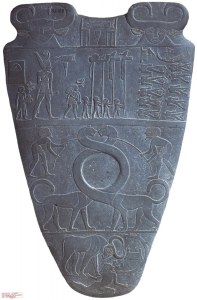
''First attested in English in 1785, the word camelopardalis comes from Latin, and it is the romanization of the Greek "καμηλοπάρδαλις" meaning "giraffe", from "κάμηλος" (kamēlos), "camel" + "πάρδαλις" (pardalis), "spotted," because it has a long neck like a camel and spots.''
Side note: "It is as if each class represented all possibilities of development, at times carrying certain characteristics to an extreme beyond any utilitarian ends that could be determined by simple logic...We can understand the marvelous equilibrium of the supple panther's four limbs, as skilful at climbing as at leaping, but the excessive neck of the giraffe never ceases to amaze..." ['Sacred Science' / R. A. Schwaller De Lubicz]. Try ''panther''.
All as a means...?
''As tall as a giraffe, the now extinct guetzalcoatlus is thought to be the largest ever creature to fly...There is a South American bird called quetzal, and the Quetzalcoatl {which is a word within that dinosaur name} - is the winged serpent god of Aztec myth.'' ['The Chase'].
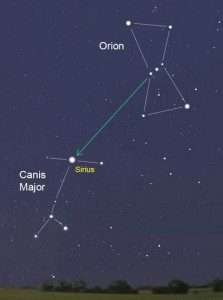
The ''beginning'' of something?
Yet another analogy with the same intent - different time period - different author. Question. A universal conspiracy?..."To raise the evanescent ''real'' man to a state of 'perfection' [called] ideal man, is the great Arcanum... It is the great secret , that may be understood by a child, but will forever be incomprehensible to him who, living entirely in the realm of sensual perceptions, has no power to grasp it. This attainment of 'spiritual consciousness' is the Magnum Opus, the great work, of which the alchemists said..." [Quote from the book by F. Hartman].
The word 'cant' as explained in the dictionary..."Language peculiar to a specified group."
That word 'peculiar' used by many authors to define something that they just cant get their heads around. Almost there, yet not there. Another description of the same word relates to the 'angle' of a ship [and/or 'oblique/sideways 'look'. Think about it in relation to the Egyptian picture 'profile' symbolism]. Or even the 'corner' of something, [root of]. In its abbreviated form a link to 'canticles', i.e., Song of Solomon.
Understanding the above defines such statements as..."At the commencement of the Masonic ceremonies, it is pointed out that Freemasonry is a 'peculiar system of morality, veiled in allegory'. I thought i knew what an allegory was, but i still looked up the word in an Ox{ford} Dictionary to ensure i had a correct interpretation. The answer stated was: ''narrative describing one subject under the guise of another''. " [From the book by K. Gest].
Example {of same?} - from someone who is aware of this subject..."It is important to state unambiguously that our data are not in conflict with ''science,'' as the naive will imagine - in fact, we will provide several scientific explanations for all of it - but it is, grotesquely and awkwardly, in total conflict with common sense. It is perverse, paradoxical and preposterous. One might say, ''its damned funny," and if a child asked innocently, ''Do you mean 'funny ha ha' or 'funny peculiar'?" I'd have to say, ''Both." [Extract from the book by R. A. Wilson].
Finally..."The children of Seth [Set] first possessed that peculiar sort of wisdom, which is concerned with the heavenly bodies". [Chapter five. 'The Sirius Mystery'].
"It is because of this knowledge that Seth is so named, his name meaning ''Gift of God.'' In his hand is the key to the [divine] gifts in all their variety and relations [and/or reflections. This readers input]. God bestowed him on Adam, as his first unconditional gift, bestowing him as coming from Adam himself, since the son is the inner reality of the 'father,' issuing from him and to him, returning." [Chapter 2, 'The Bezels of Wisdom']. Try ''hand''.
'Mans Search for Meaning' / Viktor Frankl.
"Now, ''the magnificent gifts'' of which it is a matter here are not the magical phenomena but rather revelations in the inner life of intuition and inspiration." [Extract from the book by Tomberg. 'Letter seventeen' ]. Recall how those two 'aspects' [highlighted] can only be achieved.
That link to ''fall'' symbolism. Purpose of. Together with.... "God unites the polarities of qualities ['aspects'] only in Adam, to confer a distinction on him. Thus he says to Lucifer, 'What prevents you from prostrating to one whom i have created with my two hands?' [Quran 38:75] .
What prevents Lucifer, is the very fact that he [man] unites [in himself] the two modes...the Cosmos, and the Reality, which are his two hands. [i.e.,this authors way of describing that unknown / known potential. Unknown in the sense to those individuals who only see this world [physical/material] as it is [with the 'naked' eye]. Compared to those who 'see' the fullness of that potential [i.e.,by way of ''the minds eye'' in relation to this subject], in relation to the 'whole journey'. What this author finally defines as ''Reality''. Same book, chapter one ].
Recall the link between ''fall'' and ''Lucifer,'' i.e., all 'aspects' , one way or another, relate to an individual. One individual.
The main point to the inclusion of the above, however, is to make known that the word ''hands'' are also symbolic. Anything ''naked'' represents that ''unknown'' aspect. When 'clothing' of any description is associated with same; then it denotes an understanding has taken place [i.e.,now ''known'']. In the above example 'gloves' would be that indication. Other examples found within i.e.,the Seb Jubilee 'skirt', or 'head' gear. Question. Can you determine, what each represents?
Narmer Palette? and/or Mithras cult? Enlarged elsewhere.
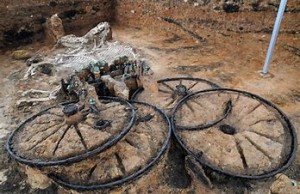
Oldest one found {in complete form} on this Island. CHALK roads found nearby.
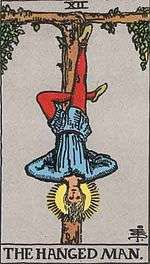
HANDS AND FEET: 'Flower' pot head?
Only mentioned to indicate the importance of understanding the subject as a whole, in the context of other subjects. For example... "One of the arguments which might be raised against placing the Israelite Exodus in the 13th Dynasty is the fact that scholars have always believed it was the Hyksos who introduced the chariot into the Levant and Egypt. Therefore the Egyptians could not have assembled a chariot force to pursue the Israelites until they had acquired the technology from their foreign Hyksos oppressors....."One further important clue has to do with gloves! [Emphasis authors, not mine]. Egypt possesses a hot climate and it will be obvious to you that the ancient Egyptians did not wear gloves in order to keep their hands warm. When you see leather gloves amongst Tutankhamun's treasures in the Cairo museum you immediately recognize that these are 'chariot gloves' which the boy king wore to protect his hands from the chafing of leather reins. When we look at a wall relief from the el-Amarna tomb of Ay, 'Master of Horse', showing the tomb owner wearing gloves at a royal investiture in his honour, we again know that these gloves are part of the trappings of a charioteer - in this case the commander of the chariot forces of Egypt. These chariot gloves were clearly a status symbol to be displayed as a mark of rank, singling out the wearer as a member of his majesties elite troops." [Chapter 13, 'A Test of Time' by D. Rohl].
'Fits the hand like a glove.'
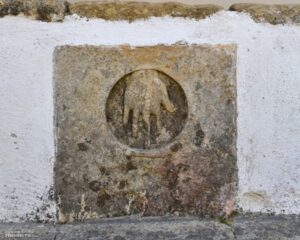
Tomar- Portugal
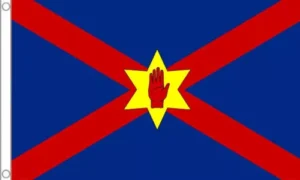
Ulster Flag.
And/or: The red gloves of Aye-Gaythelos {Ay} + eighteen gold torcs relative to the red hand on the Ulster flag - as speculated within the book Scota: Egyptian Queen of the Scots' / R. Ellis {page 146}.
Zaragoza to enlarge.
And/or: "One other possibility is that the glove symbology was linked in some manner to the hands of the Aton. The Aton sun disk was always portrayed as having rays that ended in small hands, which caressed the royal couple or offered them the ankh, the symbol of life. It is entirely possible that this imagery turned the humble hand into a potent symbol of god, and the power of the gods to protect and give life. It may have been through this route that bthe symbol of the governor or army commander became linked to a glove. The red colour used for these gloves no doubt reflected the redness that was always associated with the Lower Egyptian royalty." [Page 147].
Right hand of god?
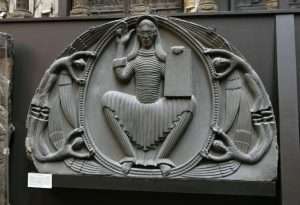

Mind set?
A working example: "Elsewhere in his book he deplores the lack of interest in that which is worth while, at the same time analyzing the word “pastime.”....He says, “The world, out of its own use of this word, renders judgment against itself. For it is concerned with amusements and pleasures which do not really satisfy the mind....and fill it with the sense of an abiding and satisfying joy; they serve only, as this word confesses, to pass away the time, to prevent it from hanging, an intolerable burden, on man's hands; all which they can do at the best is to prevent men from discovering and attending to their own internal poverty and dissatisfaction and want."
Side note: Hector of Troy legend = 'Tamer of Horses'. While recalling Paris who 'stole' Helen. And/or the Trickster character that stole 'fire'. A negative that has to be ''turned'' {precession?} into a positive.
Continued: The author attempting to change 'dates' in order to verify a hypothesis of which, amongst other things, Solomons Temple; he believes, will most likely be found, {i.e.,in a different epoch strata}. To understand its true intent put 'temple' in the 'search box'. Then try ''chariot''.
''Fits like a glove''.
Leather is always identified with Hathor,[recall her main 'symbol'] of which all 'rulers' regardless of 'time' or period have to identify with [one way or another] as part of their 'calling' [i.e.,Kingship]. Other words [keys] highlighted.
Can you put them all together to understand something other than the obvious?

Wagons in relation to chariots. 'Ramp' to enlarge.
As is: "It looked like the original curves of the horses legs...but it turned out to be chariot with a pole joining it to the legs of the animal. This puzzling find in no way helped to explain Gogmagog….In all other ways the chariot complicated matters. It did not look as if it was an Iron Age vehicle. It had the appearance of a Roman classic type added at a later date while the horse was of the Iron Age....The horse, lady and chariot had been drawn as if they were on a white road {'chalk'} leading up to the earthwork....The roadway was probably a sacred path heading for something within the earthen ring." [Page 32 'GogMagog' / T. Lethbridge].
REFRESHER: ''Error runs down a plane while truth has to laboriously climb uphill."
Something extra?: ''Anglesey is also home to the village with the longest name in Europe - LlanfairpwllgwyGOGerychwyrndrobwilliantysilioGOGOGoch....'' ['Readers Dijest' / April 2021].
'Circle of Giants' link? Therefore those ''blue stones''?
Question. What would be the 'longest' name in Asia?
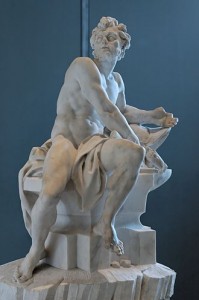
'Vulcan' / N/E / Phaistos links. Anything? Right foot = S/W? Right hand pointing to S/E? Looking towards ….? All as a means....
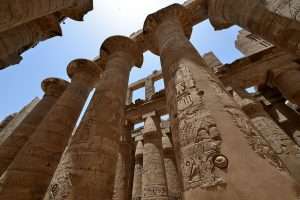
karnac: A forest of totems?
A {working?} example: "What I have written in this book should serve as a terrible warning to those who light-heartedly embark on a search for 'giants'. A problem, which did not seem of any great moment to me, has plunged me into months of fieldwork, blistered hands, scratched ears and rheumatic joints. It has led me also far down paths of investigation, which I had never intended to tread....I see now that one might spend a lifetime of this kind of thing and still have more to do at the end of it. But it is worth doing, for it opens up a glimpse of the ideas of men in Europe long ago.....In chasing the old religions of Europe, we seem to be able to watch the spread in every direction of one great belief. It came on top of vague and scattered beliefs in some form of totemism. It was so much higher in the scale of ideas, that people jumped at it, as later they did with Christianity. Although the thoughts of many men probably went to form it, one suspects that only one really great thinker hammered it into shape. In attempting to appreciate how this idea was thought out...." [Page 154/5 'GogMagog'].
'Blacksmith'?
Try 'Dead Sea Scrolls' as ONE example.

Made of pine.
 Side note: Largely unnoticed and ignored by the daily influx of visitors to Stonehenge are three round white concrete discs set into the tarmac of the site's car-park.
Side note: Largely unnoticed and ignored by the daily influx of visitors to Stonehenge are three round white concrete discs set into the tarmac of the site's car-park.
Measuring about a metre across these discs mark one of the most interesting yet least understood phases of the development of the Stonehenge landscape. During excavations for the building of the car-park, three pits were discovered which contained pieces of bone and fragments of charcoal - the pits had evidently held large wooden posts.
When this pine charcoal were carbon dated it was found to be some 10000 years old, over twice the age of any other structure at Stonehenge. At this time the during the Mesolithic period the whole area would have been covered with forests of birch, pine, hazel, oak and elm with scattered patches of open grassland.
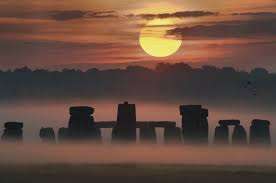
Mortise and tenon. N/W 'tip' of Europe. Peninsula?
As yet we know little about why these three timbers were erected, whether an area was cleared {Grove?}, whether it was a natural forest glade, or even how tall the timbers were. If and when the whole Stonehenge area is redeveloped, with the road, car-park and visitors centre removed, we may find further clues to explain the function of this enigmatic structure. {internet}.
Continued: "Here I shall leave the quest for the moment. It has been most fascinating, and I think I have only reached a halting place on the road. Innumerable questions still keep tumbling into my mind. Was the Highland water - horse, for instance, only an idle tale of imagination formed from vague stories of the hippo in Egypt? Same book.
.............
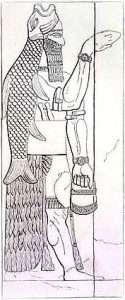
A sow's ear or a silk purse?
A side step: "It shared with Antares the title Ta Who, and was the central one of the seven lunar asterism making up the Azure Dragon...But individually Graffias seems to have been known as the Four Horse Chariot of Heaven, and was worshipped by all horsemen..........

Amongst the most recognisable silks and colours were those of Her Majesty Queen Elizabeth, which combined purple, scarlet and gold braiding. Horses owned by JP McManus are also instantly recognisable to racegoers and spectators at home thanks to their bold combination of green with gold hoops.
The Ricci family, meanwhile, have their jockeys wear baby pink silks with bright green spots, while the silks worn by jockeys riding the Thoroughbreds of Prince Khalid Abdullah are equally famous with their green and white combination embellished with a pink sash.
It probably was also Fu Kwang, the Basket with Handles, and highly regarded as presiding over the rearing of silkworms, and as indicating the commencement of the season of that great industry of China...Graffias is said to be of an unknown derivation...more than likely from the word ''crab''....as it is well known that the ideas and words for crab and scorpion were almost interchangeable in early days, from the belief that the latter creature was generated from the former...It was included in the 15th manzil {'Crown of the Forehead'}, just north of which feature it lies...The Hindu's knew the group {which contains Graffias} as their 15th nakshatra {'Propitious or Successful'} - they figured it as a Row or Ridge which the line of component stars indicate {''line of sight''?}..." [Page 367-8 {'Scorpio'}, from the book 'Star Names and Their Meanings'].
Try 4 horse chariot and/or ''Ridge'' - To 'see' something other than the obvious.
Another example..."The Djed column, with its four capitals, symbolises stability and duration in the Osirian world. Lying on the ground it expresses death, and its setting up, by the king in person, signifies the resurrection. This ceremony was a joyous one, in the Temple of Abydos the scene of the erection of the Djed columns is followed by that of the Offering of Cloths, in which the column is clothed in the manner of a statue. "[Extract from the book {in its 'middle' pages} by the author L. Lamy]. Horizontal/vertical link. Try ''four'' and ''garment'' for a deeper read.
Abydos in relation to Thebes. Question. What lies in the middle of both? Question. Any similarities to Stonehenge?
That link to Enoch "as to the invention of 'language' itself. Because according to the secret doctrine, all languages originated with the giving of names to the heavenly bodies". That 'language' that predated the Tower of Babel. [For further information on 'Enoch' as represented in different forms throughout all cultures see chapter seven 'The Secret History of the World'].
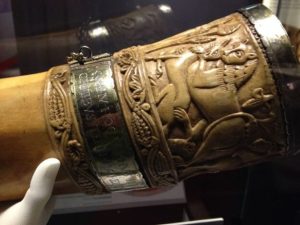
What comes first {in the sense of a 'departure'} - sight, sound, smell or taste?

Red thread?
Continued: "Whenever a gnostic receives a spiritual intuition in which brings him new 'spiritual' knowledge and new spiritual graces, [he should know] that the form he contemplates [i.e., 'information' assessed within this 'subject'. This readers input] is none other than his own essential self, for it is only from the tree of his own self that he will garner the fruits of his knowledge." [Same chapter, same book, i.e.,'Bezels of Wisdom'].
'Tree' in relation to 'tower'. Wood in relation to stone. {'heart of stone'?}. Anything?
For other examples put in the 'search box'.....''the fruit of ones labour.''
"The truth is that man gets the fruit of his actions from 'above', and the fruits correspond to the nature of his actions." [Part one, 'Play of Consciousness'. Mentioned elsewhere].
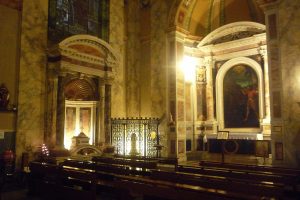
San Paolo alle Tre Fontane (Italian), in English "St Paul at the Three Fountains" is a Roman Catholic church dedicated to Paul the Apostle, at the presumed site of his martyrdom in Rome. In Latin it is known as Sancti Pauli ad Aquas Salvias ("St Paul at Aquae Salviae"). The church located on the grounds of the Tre Fontane Abbey located on Via di Acque Salvie 1 in the Quartiere Ardeatino (Q. XX.). Since 2010 the church is a cardinalatial diaconia, with Mauro Piacenza as its cardinal deacon. AND/OR: In Arthurian legend the occurrence of a beautiful lady at a fountain is almost commonplace in the introduction to a story of inner adventures and enchantment. In the subjective economy of things such a symbolic scene represents a power point in the aura. These are known in the East as chakras. They are upwelling life-giving force centres from the depths; sources of kundalini or the life force.....
Of considerable importance in this sequence, although easily overlooked in the welter of symbolism, is the fact that this process of dividing the worthy from the unworthy, at the border between inner and outer levels, takes place in a garden around a fountain. The fountain, together with a garden, orchard, or grove of trees, is an almost invariable feature of entrances to the inner planes in esoteric mythology....After the unworthy have been dismissed there is a pregnant silence {'pause'?} within the garden. This silence in itself is a mighty symbol. It is the stillness of the great feminine archetype, whether in the silence of the Sephirah Binah on the Tree of Life, the great temple of form of all the spheres; or in the great silent Unmanifest Sea of the Ain Soph beyond Kether, the ultimate feminine principle. {'The Rose Cross and the Goddess: The Quest for the Eternal Feminine Principle / G. Knight}. 'SEE' anything?
Refresher: {i.e.,a 'work in progress' representation of}: "...In Book 18, Achilles mother, Thetis, suggests yet another image of the significantly brighter stars of the constellation when she describes her son as a young sapling who will grow into a mighty warrior. Homer also uses Canis Major to reiterate his idea of the celestial sphere when in Book 23 of the Iliad, Achilles tosses this way and that during a restless sleep." ['Homer's Secret Iliad']. Enlarged elsewhere.
Example that explores [and possibly 'describes'] that inner intent [or 'goal']...
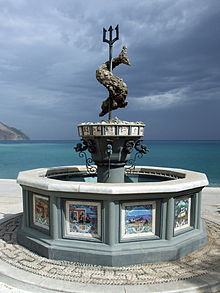 "In this particular dream i live in California, Colorado or another sunny somewhere. Amid a throng of people i sit within a lush and riotous flower garden and courtyard, the same garden i've seen pictured within a deck of Tarot cards. A balding, older man, toga-clad {'wool'?} - like Socrates, stands before the crowd, lecturing to us on how this garden was a sacred Egyptian garden. Before me to the right, i see a small, magical fountain - almost like a baptismal font - built into the side of a building. There water dribbles and bubbles into a pink marble basin in the shape of a shell. Above the flowing water i notice the face of a pink marble angel. Beside the fountain, on the east side of the stucco building, there is an arched wooden door without a handle or a window. In my lap, i hold these strange cards, unlike any Tarot deck i have ever seen. As i say, one card bears the picture of the same garden and fountain where i sit. I raise my hand to ask, "Where in Egypt is this fountain? I want to go and see it." The speaker points to the 'fountain' in front of me. "Right there. There is the fountain." "NO, NO i say, "I mean the real fountain. Where is it?" Again he says, "Right there. That is the fountain!" I turn to the fellow seated beside me and complain, "He doesn't understand my question." "No the fellow replies. "You do not understand the answer. THAT is the fountain."
"In this particular dream i live in California, Colorado or another sunny somewhere. Amid a throng of people i sit within a lush and riotous flower garden and courtyard, the same garden i've seen pictured within a deck of Tarot cards. A balding, older man, toga-clad {'wool'?} - like Socrates, stands before the crowd, lecturing to us on how this garden was a sacred Egyptian garden. Before me to the right, i see a small, magical fountain - almost like a baptismal font - built into the side of a building. There water dribbles and bubbles into a pink marble basin in the shape of a shell. Above the flowing water i notice the face of a pink marble angel. Beside the fountain, on the east side of the stucco building, there is an arched wooden door without a handle or a window. In my lap, i hold these strange cards, unlike any Tarot deck i have ever seen. As i say, one card bears the picture of the same garden and fountain where i sit. I raise my hand to ask, "Where in Egypt is this fountain? I want to go and see it." The speaker points to the 'fountain' in front of me. "Right there. There is the fountain." "NO, NO i say, "I mean the real fountain. Where is it?" Again he says, "Right there. That is the fountain!" I turn to the fellow seated beside me and complain, "He doesn't understand my question." "No the fellow replies. "You do not understand the answer. THAT is the fountain."
Shadow, animus or soul?
''The term 'sky-blue-pink' is used in jest to describe a non-existent colour.'' ['The Chase' / S15 EP17].

Stillness? Which one is the illusion?
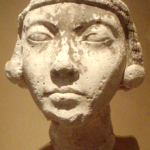
Kiya
Side note: ''The source for our longing is the longing for the ''Lost Beloved of the Soul'' who is really some part of ourselves split off and disowned. The marriage of a man to an anima figure or a woman to an animus figure is marriage to illusion and projection, which results in loss and grief. One finds oneself shouting at the person behind the illusion we have projected, saying: 'You don't understand me!' Certainly the shadow within might well shout back at us, 'No. You don't understand me!'' [Page 85 'Dreams of Isis' / N. Ellis].
And/or: ''Ptah {bald headed} and Sekhmet had a 'child', a beautiful {'nefer'?} BALD headed boy named Nefertem. Each dawn he emerges from a thousand petaled lotus like a child pushing out of his mothers womb and each night he returns to the lotus as it closes its petals and sinks back under the water.''
Shadow aspect?
Working example: "The concluding event of the third act of the myth, the elevation of the divine pair Dionysos and Ariadne to the heavens, was based on the appearance of the goddess, in her full radiance, in the sky. Where the myth had reached this stage of humanization, as in the Theban story of the god's birth, Dionysos, fed by his nurses and grown strong, went down to the underworld and brought his mother back. Here there could be NO question of a marriage....
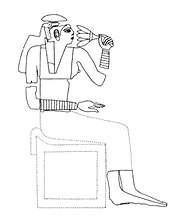
Wife / Mother / Grandmother of the Old Kingdom pharaohs.
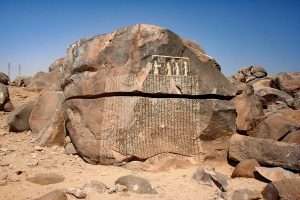
Pre or Post?
The marriage of Dionysos and Ariadne was a special one, an enhanced marriage that harkened back to an early stage, and in the Naxos myth was so interwoven with the ascent to heaven that we cannot tell which element came first. Even in the Cretan myth this marriage was placed in a definite setting: not the cave, but a small island, scarcely more than a rock in the sea. In the Greek text of the clay tablets, the island was given an eloquent name: "Dia." This is the name of a small island off the Cretan coast, facing Amnisos, one of the harbors of Knossos. The Naxians claimed that Naxos was originally called "Dia, so closely was this name identified with a marriage of the gods in which the bride played no less a role than the bridegroom.
In this context "Dia" can scarcely be associated with the name "Zeus," but seems rather to be connected with the linguistically related names of goddesses: with the Latin "Dea" / "Dia" or with "Diana," all names signifying the light of the full moon. The scene of this marriage was somewhere in the Aegean Sea. It is characteristic not only of the Minoan religion but also of the prehistoric religion of the entire island world.
In the sixth century B.C., the Naxians began to build a magnificent temple on the rock facing the harbor of the city of Naxos. Today the enormous marble frame of a gate —assuredly erected for Dionysos on the site of the sacred marriage- is still standing. According to another tradition, Dionysos took Ariadne to the small, round island of Donus or Donusia, east of Naxos, which may thus also be taken into consideration as a marriage island. A very definite picture of the marriage island passed into ancient art, and the rock facing the harbor of Naxos is quite compatible with this picture. The harbor, from which a marriage procession could sail out in small boats to celebrate the union or reunion of the divine pair, is visible in the background. {'Dionysos: Archetypal Image of Indestructible Life' / C. Kerenyi}.
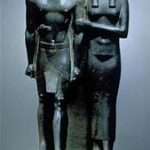
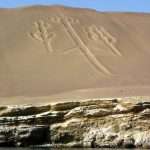 Continued: ''His name means 'beautiful being' but 'tem' has a double meaning. It means simultaneously 'to be whole, perfect and complete' as well as 'to not exist'....a reminder of the mystery of life, death and rebirth....Likewise, in the alchemical tradition, occultist MacGregor Mathers describes the Union of the Queen Mother with the King by saying that the two are initially one; then they are seperated and later rejoined in order to bring about a greater resolution.''
Continued: ''His name means 'beautiful being' but 'tem' has a double meaning. It means simultaneously 'to be whole, perfect and complete' as well as 'to not exist'....a reminder of the mystery of life, death and rebirth....Likewise, in the alchemical tradition, occultist MacGregor Mathers describes the Union of the Queen Mother with the King by saying that the two are initially one; then they are seperated and later rejoined in order to bring about a greater resolution.''
Tiy {Tiye}? and/or Menkaure/Khafre's/Khufu's Mother?
Seven into 'eight'?
'Grandmother'?
Tetisheri to enlarge.
A working exmple: ''Sometime before the SEVENTH regnal year of her young nephew King Thutmose III, Queen Hatshepsut, the daughter, wife, and probably granddaughter of kings, was herself crowned king, assuming explicitly the power that she had been wielding unofficially since his accession. In conceiving her kingly role and presenting herself to her people, she took three groups as models: male kings, King's Mothers, and queens regnant. From her association with each of these groups, Hatshepsut derived her legitimacy as a female pharaoh. These models illuminate the nature of her kingship and the reasons for her apparently unorthodox coronation....A number of women had ruled Egypt before Hatshepsut. Most had ruled as 'mwt nswt', 'Kings Mother'', an important title from the very beginning of Egyptian history.'' [Page 9 'Hatshepsut: From Queen to Pharaoh' / The Metropolitan Museum of Art].
And/or: "The reason is that each religion or philosophy that comes into the world is a Benjamin of humanity and insures its own life by 'destroying' its mother. It is because the symbolic serpent turns ever devouring its own tail; it is because, an essential condition of existence, a void, is necessary to every plenitude, space for every dimension, an affirmation for each negation: herein is the eternal realization of the phoenix allegory." ['Transcendental Magic' by E. Levi].
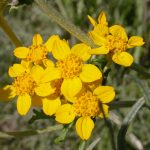
 Continued: '''Child' and lotus alike begin in the dark depths....they emerge as the luminous image of the 'redolent flower, the soul of Ra'. The god is not the flower itself, but manifest within the flower is the force {'god'} that drives the flower. Likewise 'God' manifests in human form, in babe, in lotus, in Nerfertem. The Pyramid Text of Unas declares: 'It is Unas {as} the flowers that have sprung from pure earth....Unas gleams as Nefertem, as the lotus at the nostril {nose} of Ra.' Ra, the NEW sun, is Nefertem, the child emergent at dawn after his death in the west and his twelve hour passage through the dark underworld of the Duat...He becomes Aufu-Ra, literally the flesh made of light...represented with the winged beetle Kheperi {'carapace'}. It lacks consciousness {i.e., not yet assimilated or made manifest}...but its activities are the food of the soul. The ancients remind us that: 'The seeing of the eye, the hearing of the ears, and the breathing of the nose bring messages to the heart. It is the latter that causes all decisions to be made - but it is the tongue that reports what the heart has thought out.'' [Pages 81/151/2 'Dreams Of Isis' / N. Ellis].
Continued: '''Child' and lotus alike begin in the dark depths....they emerge as the luminous image of the 'redolent flower, the soul of Ra'. The god is not the flower itself, but manifest within the flower is the force {'god'} that drives the flower. Likewise 'God' manifests in human form, in babe, in lotus, in Nerfertem. The Pyramid Text of Unas declares: 'It is Unas {as} the flowers that have sprung from pure earth....Unas gleams as Nefertem, as the lotus at the nostril {nose} of Ra.' Ra, the NEW sun, is Nefertem, the child emergent at dawn after his death in the west and his twelve hour passage through the dark underworld of the Duat...He becomes Aufu-Ra, literally the flesh made of light...represented with the winged beetle Kheperi {'carapace'}. It lacks consciousness {i.e., not yet assimilated or made manifest}...but its activities are the food of the soul. The ancients remind us that: 'The seeing of the eye, the hearing of the ears, and the breathing of the nose bring messages to the heart. It is the latter that causes all decisions to be made - but it is the tongue that reports what the heart has thought out.'' [Pages 81/151/2 'Dreams Of Isis' / N. Ellis].
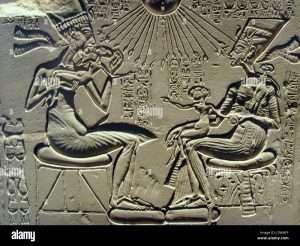
'Truncated' seating arrangement's? 'Queendom' to enlarge.
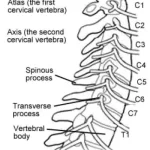
Atlas = ''the first cervical vertebrae.'' Ladder to 'heaven'?
'Golden tongues' to enlarge.
Refresher: ''The elephant has its nostrils at the end of its trunk.''
'Serpent hands'.
Analogy: ''The lord is my rock and fortress, and my deliverer...my shield {'buckler'}, the horn of my salvation and my high tower {'Bower'?}....The sorrows of death encompassed me, and the floods of ungodly men made me afraid. I called and he heard my voice, my cry came before him, even unto his ears. Then the earth shook and trembled; the foundations and hills moved and were shaken {Poseidon'?}. There went up a smoke out of his nostrils and fire out of his mouth devoured: coals were kindled by it....
Karnac-Luxor?
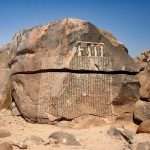
Broad?
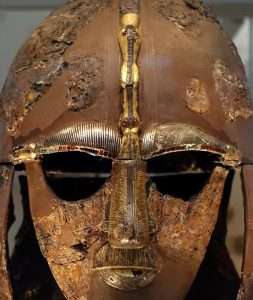
Dragon? Above or below the clouds?
He made darkness his secret place; his pavilion round about him were dark waters and thick clouds of the skies...He sent out his arrows and shot out lightnings. Then the channels of waters were seen, and the foundations of the world were discovered at thy rebuke - at the blast of the breath of thy nostrils...He drew me out of many waters...He brought me into a broad place.'' [Psalm 'eighteen'].
A working example: ''Aligned to either side of the Aten, the seated images of Akhenaten and Nefertiti facing one another - a representation of the horizon which replaces the hills used in the hieroglyph that writes akhet {'horizon'}. The king holds meritaten close to him, and the closeness of their mouths suggests that he is granting to her the breath of life that originates in their heavenly father - the shining sun disc at the top of the scene. This has parallels with Spell 81 of the Coffin Texts, which appears to say of Shu, the son of the creator Atum: 'It is with his nose that he bore me, and it is from his nostril that i came forth. That he might kiss me as he placed me at his neck.'' [Page 19 'Ancient Egypt' / March-April 2023].
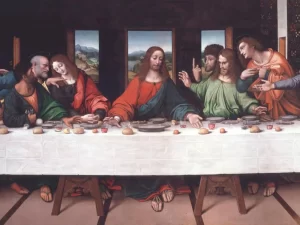
Any bread? What about wine?
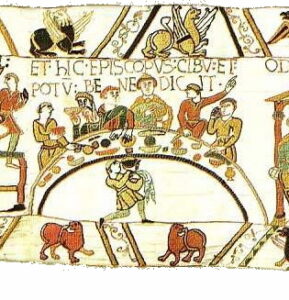
Bayeux Tapestry.
Refresher: Therefore, every Israelite is actively engaged in searching for the King’s Daughter so as to return her to her Father, just as she was in her girlhood. This is the mystery of the verse, “She shall return to her father’s house as in her girlhood, and then she can eat of her father’s bread” (Leviticus 22:13).
And/or: Tamar (Hebrew: תָּמָר) was an Israelite princess. Born to David and Maacah, who was from Geshur, she was the only full sibling of Absalom. She is described in the Hebrew Bible as being exceptionally beautiful, as is her brother. In the narrative of 2 Samuel 13, she is raped by her paternal half-brother Amnon (born to David and Ahinoam, who was from Jezreel) before fleeing with torn robes to Absalom's house; David is angered by the incident, but does nothing, as Amnon is his heir apparent. Absalom, infuriated by the rape and David's inaction, keeps Tamar in his care and later assassinates Amnon to avenge her, subsequently fleeing to Geshur, which is ruled by his and Tamar's maternal grandfather Talmai. Three years later, he returns to Israel and leads an armed revolt against the House of David, but is killed by David's nephew and army commander Joab during the Battle of the Wood of Ephraim. Tamar is described as being left "a desolate women in her brother's house" and the sole guardian of her orphaned niece, who is also named Tamar.
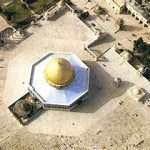
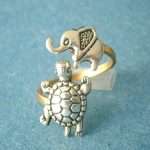
'Wedding' ring? carapace?
REFRESHER: Something extra {add it all together to 'see' something}: "As to our assertion that scriptures applies the notion of ''influence'' to 'God', compare: 'They have forsaken me, the fountain of living waters" {Jer.ii.13}, i.e.,the 'Divine' influence that gives life or 'existence'; for the two are identical. Further, ''For with thee is the fountain of life'' {Ps.xxxvi.10}, i.e.,the Divine influence that gives existence. The concluding words of this verse, ''In thy light we 'see' light,'' express exactly what we said, namely, that by the influence of the intellect which 'emanates' from god we become wise, by it we are guided and enabled to comprehend the Active intellect. Note this." [Page 171 'Guide for the Perplexed'].

Any symbols?
".....Through the symbols themselves my dream almost seemed to shout at me. "Stop thinking so much! Logic will never get you to the truth you seek. Everything you need to know lies inherent in the symbol." Intuition instructs the soul in ways logic never could. As the writer Doestoevsky reminds us, "Reason is a fine thing...but reason is only reason and satisfies only the reasoning capacity of man." [Part three to the book 'Dreams of Isis' by Normandi Ellis]. Continued [ enlarged ] further on. Put ''fountain'' in the usual box to understand 'its' relation towards defining a subject and therefore the 'individual.'
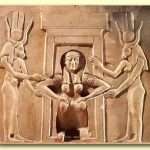
A 'birthing' on 'mud' brick
"What else can it be that draws hundreds and thousands of people, as though by some ineradicable instinct, to search for the 'fountain of Kunewara'? Our Grailsword is broken and it can only be mended, as the legend tells us, at the fountain of the Beginnings, whose waters are forever murmuring in the secret recesses of every human soul. Not in external historical events do we find this 'fountain', but in the soul of the Human Being..." ['The Flaming Door'].
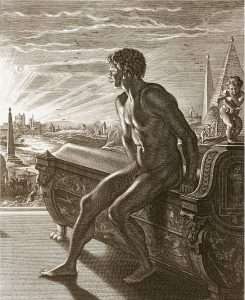 A working example: "Welcome to a place called Little Galilee on the top of the Mount of Olives. Victory! The lord has risen. On this Easter sunny day on top of the Mount of Olives. BEHIND me is the bell tower and to my left across the field is the Tower of the Ascension Church of the Holy Monastery of the Ascension. We are here in this 'secret garden' within the monastery where we can see flowers and fruit all around us. The church with its two crosses and bell tower glinting in the sunshine. As St. John in his first letter says: the prince of the world has been defeated.....Victory also for St. Michael against the angels and dragon. [Day 47 {fortyseven}: Pilgrimage: Lent 2024].
A working example: "Welcome to a place called Little Galilee on the top of the Mount of Olives. Victory! The lord has risen. On this Easter sunny day on top of the Mount of Olives. BEHIND me is the bell tower and to my left across the field is the Tower of the Ascension Church of the Holy Monastery of the Ascension. We are here in this 'secret garden' within the monastery where we can see flowers and fruit all around us. The church with its two crosses and bell tower glinting in the sunshine. As St. John in his first letter says: the prince of the world has been defeated.....Victory also for St. Michael against the angels and dragon. [Day 47 {fortyseven}: Pilgrimage: Lent 2024].
 Severn Estuary?
Severn Estuary?
A {working} example: "This celestial figure is more of a question mark in marble, than a regenerative fount of life which refreshes our emotions." ['The Secret Zodiac'].

Satyr?
As one example: "Socrates who is more or less hidden behind his 'best disciple,' Plato." [Quote by Friedrich Nietzsche]. Think about it, relative to ''archetypes.'' Understanding that 'framework' gives a 'broader' view. A plausible one. Can you see it yet? If only in relation to ''Socrates''. Purpose of?
''I know that I know nothing." {Socrates}.
''The shadow has either a personal or a collective form of appearance depending on whether it belongs to the realm of the collective unconscious. Accordingly, it can either appear as someone we know or have seen etc., or as a dark mythological figure such as a sorcerer, satyr, devil, etc. The shadow stands on the threshold of the collective unconscious. Only when we come to terms with it can we proceed to the second stage of the 'Self' - the anima - meaning soul.'' [Page 118/9 'Mercurius'].
Plato's threshold?
Someones ''second nature''?
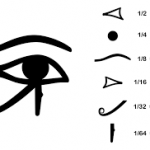
Spirit or soul?
And/or: ''Everyone who contemplates one of the busts of Socrates that has survived may be struck by the lively, satyr like quality of his physiognomy....There is some dispute, as to whether or not Socrates was an initiate....He committed suicide by drinking hemlock. He died forgiving his executioners. The oath against suicide was one of the most terrible taken by initiates." [Page 267 'The Secret History of the World'].
Analogy?: "Jung had 'spirit guides' one of whom was named Philemon. Jung observed that Philemon...brought home to me the crucial insight that there are things in the psyche which i do not produce, but which produce themselves and have there own life." ['www.philipcoppens.com/jung.html'].
"....as Amipsias put it - he was born to spite shoemakers." [Chapter entitled 'The Teaching Mission of Socrates. From the book 'Alexandria' / Vol 3].
Question. Do satyr's wear shoes?
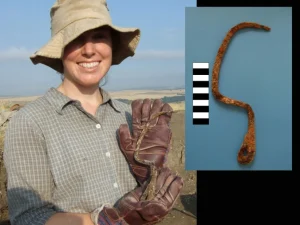
Laconian key to enlarge.
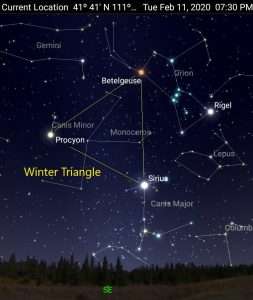
On the Shoulders of giants?
"Lahiri Mahasaya was no bookish interpreter of the scriptures. Effortlessly he dipped into the 'divine library' {Akashic records link}. Foam of words and spray of thoughts gushed from the fountain of his omniscience. He had the wondrous clavis that unlocked the profound philosophical science hidden ages ago in the Vedas. If asked to explain the different planes of consciousness mentioned in the ancient texts, he would smilingly assent." [Extract from the book 'Autobiography of a Yogi'].
"Clavicula: This term translates to both “little key” and “collarbone.” It is derived from the Latin word clavis, which means “key.” Interestingly, the collarbone is called the clavicle because its long, slender shape with a slightly bent lateral end resembles a key. Additionally, the bone rotates along its axis like a key when the shoulder is abducted."
And/or: ''Without having 'met' John the Baptist Jesus may not have become the person we know today...Throughout the 4 Gospels the Baptism is reworked again and again, each time giving Jesus more and more spiritual authority....The meaning of it is reworked.......The very last words that we hear from John as he sees Jesus ON THE HORIZON: 'Jesus must grow greater, i must grow less'. That is precisely what happens in history...'' ['Head of John the Baptist' / Nat. Geo. / 2012].
Higher/lower?
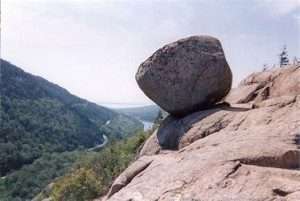
 Practical example?..."Church leaders, travelers, and cartographers began now to find firm geographical clues in the Bible that revealed the true location of the Garden of Eden, which many now concluded had existed in the Bible lands themselves. According to the book of Genesis, as well as various apocryphal and pseudepigraphical works of Jewish, Christian, and Muslim origin, the Garden of Eden was watered by a single stream that took its rise from a spring or fountain that emerged from the base of the Tree of Life. After exiting the garden, the stream then split into four rivers..." The author of Gobekli-tepe attempting to define where the Garden of Eden may be located. Very similar to the author of 'A Test of Time' {enlarged elsewhere}. Define the parts to understand the whole {i.e.,subject material} - relative ONLY to the self.
Practical example?..."Church leaders, travelers, and cartographers began now to find firm geographical clues in the Bible that revealed the true location of the Garden of Eden, which many now concluded had existed in the Bible lands themselves. According to the book of Genesis, as well as various apocryphal and pseudepigraphical works of Jewish, Christian, and Muslim origin, the Garden of Eden was watered by a single stream that took its rise from a spring or fountain that emerged from the base of the Tree of Life. After exiting the garden, the stream then split into four rivers..." The author of Gobekli-tepe attempting to define where the Garden of Eden may be located. Very similar to the author of 'A Test of Time' {enlarged elsewhere}. Define the parts to understand the whole {i.e.,subject material} - relative ONLY to the self.
''...emerged from the base of the Tree of Life.'' Understand the ''divine bit'' relative to A/B/C to narrow down those choices. Then try ''fountain''.
Primordial 'fountain' in relation to Primordial 'mound'{''Duku''}. Top/down relative to bottom/up - as a means...
'A river of thoughts'. The means by which an understanding takes place. Purpose of - relative to the whole. Represented as a 'journey'.
A working example: ''The river is like wine. Its rushes are Ptah. Sekhmet is its foliage. Iadet its buds, Nefertem its lotus blossoms. Gold is in joy - when earth brightens in her beauty. And Memphis is a bowl of fruit placed before the merciful of face.'' ['A New Kingdom love poem' from Memphis : from the book 'My Heart My Mother' / A. Roberts].

From the depths.....?
"In Arthurian legend the occurrence of a beautiful lady at a fountain is almost commonplace in the introduction to a story of inner adventures and enchantments. In the subjective economy of things such a symbolic scene represents a power point in the aura. These are known in the East as chakras. They are upwelling life giving force centers from the depths; sources of kundalini or the life force." All as a representation of something.
Question. What is that something, and WHY? In other words what is that final intent, i.e.,what aspect of the 'psyche' relative to ''the thinking process'' [in order to define something; in order to understand something] - does it represent?
"The NaIads dwell in a cave in a mountain, an image that we shall encounter more than once. They are of the class of being known more generally as Nereides or water nymphs, of whom there are many, all daughters of Poseidon, the 'god' of the sea. However, whereas the Nereides were creatures of the great waters, [i.e., salt] the Naiads were associated with inland water sources, [i.e., fresh] particular fountains." [Both paragraphs taken from part two, of the book 'The Rose Cross and The Goddess' by G. Knight].
[4]. Hindu/sandscript equivalent= ‘Asura’, [ ‘Nature beings’ ]...In relation to ‘Devas’, [ 'Shinning ones' i.e.,'enlightenment', by way of an understanding, within a subject]. i.e., lower/higher. The link between the two = ‘Muses’. Those nine aspects of...the still in ‘unconscious’ state until an ‘awareness’...surfaces.
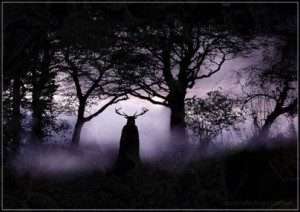
To many lagers?
A {working?} example: ''Were they the creatures I saw by the road from Abbergavenny, of the Deva world?'' I asked. ''They were indeed,'' Merlyn replied....a true inhabitant of the 'shadow' world which is typically invisible to our mortal eyes, and so they often clothe themselves in the myths and thought-forms which various races of mankind have created through the years....Known as 'Nature Spirits', who accept 'command' under no man, unless their loyalties be won over by 'word' {logos? and/or therefore ''understanding''} or deed. " [Douglas Monroe].
Archetypes?
That link to 'Ten', i.e.,part of the now 'whole'. [Chapter six.'Esoteric Orders and their Work'.By Dion Fortune]. Buddhist equivalent, the 'three heads' and 'six arms' of Brahma. That link to the 'Graces of Hermes', 'by way of'.... the 'language of the birds'. Chapter seven. 'The Sirius Mystery'.
Sufi equivalent = 'Parliament of the Birds' by Hakim Sanai. Or 'The Universal Tree and the Four Birds' by Ibn Arabi.
[5]. Christian equivalent = ‘Demons/Angels’. The link between the two...'Stations of the Cross'. Think about it, in relation to Cross symbolism. Explained elsewhere. Monastic equivalent 'The Lords Prayer',[Paster Noster]...in relation to a 'repetitive' action in order to 'bridge' something in the positive sense. Keep in mind what the word 'Lord' is symbolic of. Together with...
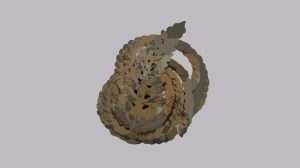
Spirals and threads. An inclination towards.....?
"An 'angel' [in a general way,i.e.,Archetype; in the main i.e., more often than not] is a spiritual reality with its own unique content, qualities, and 'character'. What distinguishes one angel from another is not the physical quality of spatial apartness but difference of level- one being above or below another- with respect to fundamental causality in terms of some difference in essence. Now as we have said, angels are 'beings' in the world that is the domain of emotion and feeling: and since this is the case, the substantial quality of an 'angel', may be an impulse or a drive-say, an inclination in the direction of 'love' or a seizure of fear, or pity or the like. "[Page 8, 'The Thirteen Petalled Rose'. Mentioned within].
Yet another analogy with the same intent: but with a deeper meaning to it..."Enquiry is everything'' as i once wrote in my own 'magickal' journal; to break down the buffers that allow us to maintain the sense of separation within our selves and to others. If you cannot communicate clearly within yourself, what chance for you to communicate with your fellows? If you cannot communicate with your fellows, what chance of communicating with more ethereal constructs? and if you cannot talk to 'Angels', what chance of ''walking with god''. [Quote by A. Crowley. Extract from the book 'The Magister'. Mentioned elsewhere. Emphasis - this readers].
And/or..."For convenience, all of the models discussed above and to be discussed as we proceed can be summed into two meta-models. {1} It is all done by our own nervous systems. As we advance towards 'higher intelligence', our brains can increasingly affect the universe, by quantum inseparability, creating first coincidences, then Jungian synchronicities, then seemingly 'external superhuman beings', who are really masks of the greater selves we are evolving into..." [Extract from the book 'The Cosmic Trigger'].
Question. Why is the subject of 'psychology' used as this subjects main teaching aid?
"...Enquiry is everything...'' = Objectivity. Benefits of.
'On Having No Head: Zen and the Rediscovery of the Obvious' / D. E. Harding.


Does he talk/sing from his gut or piss sack? Or is that only reserved for someone's ''fcking stereo equipment''? A sincere apology or a smirky arse one?
An alternative? view..."Some of the intensified experiences were ''merely subjective,'' but nonetheless tremendously important to the author, in ways that even the skeptic would admit were non - pathological. For instance, on one occasion, the entity spoke directly, in a melodious and angelic voice, to say: 'They live happiest who have forgiven most.' This is rather trite, one admits; all the major religions preach forgiveness. What was impressive was {A} the timing - the struggling writer was very pissed off, that week, at certain publishers who were slow in paying monies owed; and {B} - the pragmatic emphasis, tailored to the Libertarian's hedonic philosophy at the time. It did not say, 'Forgive, because god demands it'; it said, 'Forgive, and you will be happier.' The Libertarian Hedonist tried it, and still is trying it, and it works." [Same book].
Practical example of such..."The Abyss represents a significant event in the life of the 'magician-mystic'. As such, it is a culmination of thousands of hours of work towards its attainment. It is not a vision, nor can it be visualised. Nor can it be simply attained by taking the 'Oath of the Abyss' at any moment of your life. It is an emergent property of a fundamental re-orientation of awareness in relation to the universe, given divine grace by its reception within the individual. It is the moment to which the HGA ['Higher Guardian Angel' i.e., as one example - a seraph?] designs to lead us, at which point it too vanishes, as it was never there. The HGA is the edge of light, the bridge, interface, component of awareness that arises from the shadow of the abyss - the amaneusis of the soul. When the remembrance of the true state is attained the light is entered and no longer casts a shadow nor has an edge {'ridge'?}." [Same book. Emphasis, this readers].
''re-orientation'' = H/V link? and/or 180 and/or semicircle?
Question. Where would that be represented within {say} a landscape?
Summary: ''...the bridge," - in relation to a ''gap'' filled in by a [eureka?] moment. Representation of. ''Magical'' up to that point, i.e.,a potential yet to be realized. ''Mystical'' - once realized. Those two words ''magical/mystical'' only used because of the subject matter {i.e.,'spiritual' stuff}. That realization of something - however- is universal - regardless of subject [i.e.,by study] - of which those ''thousands of hours'' can also represent - depending on the individual. Some sooner, some later depending on ones interest in subject material. Yes or No?
Think about the above in relation to a ''connectedness'' because of the ''divine bit''. That universal {primary? and/or ''Real'' - see below} - principle, that all attempt to define in one form or another. From the dawn of human kind. From when man/woman first began an attempt to define themselves within the whole. That development ongoing, throughout the ages {eons?} up to the present time.
Understanding the above -defines the following - or at least gives one the chance to...
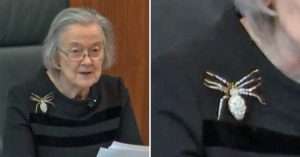
Arachne rising?
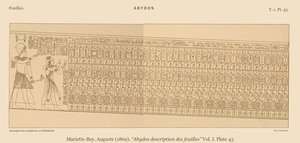
''The incribed list of kings {at Abydos} is found in the Mortuary Temple of Seti I, on the right wall of the passage coming from the second Hypostyle Hall, referred to as the Gallery of Lists. Seti I is on the left wearing the blue crown, holding a censor in one hand and gesturing towards the right with the other. In front of him, young prince Ramesses is shown holding a papyrus to read from with an accompanying text before him: Reciting praises by the hereditary prince; the eldest, of his body, his beloved (son), Ramesses, justified, true of voice.'' SIDE NOTE: "When we read a story, we inhabit it. The covers of the book are like a roof and four walls. What will happen next will take place within the four walls of the story. And this is possible because the stories voice makes everything its own." [John Berger].
Continued: ''The text runs in six vertical columns above Ramesses, and is the speech given by Seti I: Words spoken by King Menmaatra. Bringing the god to his food offering, the making of offerings for the kings of Upper and Lower Egypt. Greetings to thee, Ptah Sokar, who is South-of-His Wall! Come, that I may make for thee these (things) which Horus made for his father Osiris.
The first fiftysix names shows an orderly progression of legitime rulers of Memphis. The kings who are not included are those whose rule over the Two Lands is questioned or who had some measure of political/religious bias towards them, for example, not ruling from Memphis. The list consists of three rows of thirtyeight cartouches on each row. The upper two rows contain names of the ancestral kings, while the third row repeats Seti I’s throne- and birth-names. In all, seventysix kings are mentioned. The hieroglyphics are read from left to right, the upper row is read before the lower. The cartouches of the kings are preceded by the words n nisu, which translates as "To king.....". The third row with Seti’s names is preceded by "By the gift of....." Question. Any GAPS real or otherwise?
"This triune principle being wholly spiritual...And it is complete in itself...Beyond it stretches what is called The Abyss. This doctrine is very difficult to explain; but it corresponds more or less to the 'gap' in thought between the Real, which is ideal, and the UNreal, {physical world?} which is actual. In the Abyss, all things exist...but are without any possible meaning {until 'manifested'. This readers input}. Hence the final sentence..."for they lack the substratum of spiritual Reality." [Extract from the book 'Little Essays Toward Truth' by A. Crowley].
''UNreal'' could also be defined as 'cause and effect' without the divine bit {i.e.,UNmanifested}. That link to the subject of Astrology {i.e.,in the 'real' sense of the word - once the 'divine bit' is added and/or 'activated' i.e.,'manifested' } - Its true meaning and purpose. Relative to an understanding, that is - 'per' individual. Enlarged elsewhere.
And/or: "...the melting of individuality in the reality of god's oneness; and the centrality of 'love' in the soul's development." [Back cover to the book 'Signs of the unseen' by J. Rumi].
Horizontal/vertical link. And 'Love' in relation to 'grace'. See it?
'The Waters of the Gap' by R. Stewart.
Or, { in a more abstract sense?}... "The 'self' is the individual's center of consciousness. The 'self' is the Cosmic mind. In Idealism, the self is not the originator of its own consciousness, as it is in materialism, but 'borrows' consciousness from the 'self'. 'The self' is sometimes conceived of as undifferentiated, and sometimes its thoughts are experienced as 'gods' or 'angels'. Lorna Byrne has told me that she sometimes sees all angels 'connected to god' by a cord." [Chapter twenty, 'The Sacred History'].
Or by ''live coals''? Try 'Seraph'. 4:1
Understanding that basic framework, together with its most common 'theme' clarifies; if only for this reader; such 'statements'. What the author defines throughout the same book, as "mind before matter", [in relation to primary / secondary. Explained within].
The real questions however are the usual ones - fact or fiction - A possibility or not?
"Angels are the powers hidden in the faculties and organs of man." Quote by Ibn Arabi.
REFRESHER: "The saying of our sages, the 'angel' is broad as the 'third' part of the universe, or, in the words of Bereshit Rabba {chap.x.}, that the angel is the third part of the world..." [ Page 166. 'Guide for the Perplexed' / Moses Maimonides].
Transcendent third?
When achieved = ''face to face''?
[6]. Or even the Celtic equivalent...‘Fairies’, i.e., ethereal qualities. Or the Alchemy equivalent, Mercury. Or more to the point...’mercurial’. In relation to an awakening of something, i.e., represented as from that ‘somethings’ positive/negative boundaries/parameters, relative to an 'understanding'. As indicated in such books as...’The Underworld Initiation’ and ’The well of light’. Both by R. J. Stewart. To be taken/read with an extra large pinch of salt.
Or more commonly represented in the form of ‘fairy stories’, [ keep scratching ]. With the same intent. Which most know has a central ongoing factor to them. The seeking of a ‘treasure’ or that elusive ‘pot of gold’ at the end of the rainbow/journey .
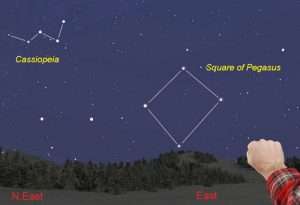
In what sense of the 'word'? Angles? or 1st/4th/7th/10th? or S/E - S/W - N/W - N/E ? A beginning or end?
Islam, [Sufi] equivalent..."I was a Hidden Treasure,and i loved to be known",so i created the world." Chapter Three. 'The Eleventh Hour. By M.Lings. Think about it ...in relation to a possible 'potential' within ABC. Orthodox equivalent... ‘The Sword in the Sun’. By A. Duncan.
And/or: A student in their first year at Hogwarts School of Witchcraft and Wizardry was called a first-year (with a hyphen).[1] Those who received their Hogwarts letter at age eleven were permitted to attend.[2]
First-years were typically eleven or twelve years of age, and began the year by boarding the Hogwarts Express at exactly 11 am on 1 September from King's Cross Station, from which they travelled to Hogwarts.[3] If they lived in Hogsmeade, they of course did not need to catch the train.
![]() From there, first-year students were accompanied by the Keeper of Keys and Grounds (or another suitable teacher if the Keeper was absent), along a shady path that led to a fleet of small boats, which sailed themselves across the Black Lake before arriving at a small landing stage near the base of Hogwarts Castle.[3] Students would frequently fall into the lake during this trip, and the boat ride during the start of the 1986–1987 school year was the first time no students fell into the lake in the school's history.[4]
From there, first-year students were accompanied by the Keeper of Keys and Grounds (or another suitable teacher if the Keeper was absent), along a shady path that led to a fleet of small boats, which sailed themselves across the Black Lake before arriving at a small landing stage near the base of Hogwarts Castle.[3] Students would frequently fall into the lake during this trip, and the boat ride during the start of the 1986–1987 school year was the first time no students fell into the lake in the school's history.[4]

A beginning or end?
Students would then await their turn to be Sorted into their houses in the Great Hall.[5][6] A teacher would take them to a small room where they would await the Sorting ceremony.[7]
Continued: Or represented in the Pagan world simply as the differences between ‘animals’ and ‘birds’. Example of such, as represented on those same ‘T’ shaped pillars. ’Geese/ducks’ on each base. A direct link to ‘Cygnus’..,and its relation to the ‘Cross’ symbolism. [ Explained elsewhere ]. Indicated in such books as...’Cygnus Mystery’. By A. Collins. Or ‘The Flight of the Wild Gander’. By J. Campbell ]. In relation to a representation of lower/higher self within an overall journey, i.e.....
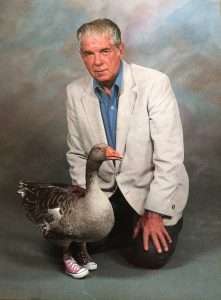 ''like a duck takes to water. (simile, idiomatic) Very naturally; without effort. She started skating and learned quickly, like a duck takes to WATER.''
''like a duck takes to water. (simile, idiomatic) Very naturally; without effort. She started skating and learned quickly, like a duck takes to WATER.''
A working example: The King and Queen will not be presented with dead ducks when they arrive in Jersey next week – with locally laid eggs set to be used in place of the traditional gift during the environmentally-themed visit.
It has been confirmed that, in a break from tradition, King Charles III will be presented with two locally laid duck eggs when he arrives in Jersey on Monday 15 July.
'Fifteen'?
The date has been confirmed as a public holiday for islanders following a vote in the States Assembly. The visit will mark the first time in 19 years that the island has played host to a reigning monarch. During previous visits to the island, Queen Elizabeth II was presented with two dead female dabbling ducks {surface eaters} - on a silver platter.
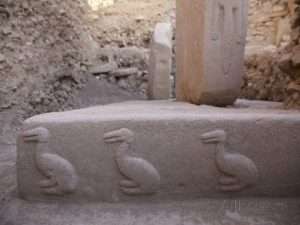
Gobekli-Tepe: Ducks or geese? abstract 'M'?
'Nineteen'?

Sutton Hoo purse clasp: Wolfs / eagles and ducks.
The six seigneurs of Jersey have been giving British royalty the same present for 800 years as an obscure act of homage to the successors of William the Conqueror, who was the last man from their side of the Channel to beat the English. But this year, locally laid duck eggs will instead be used to provide a symbol of sustenance. The decision to replace the dead ducks with duck eggs is understood to have been taken in consultation with the Palace in recognition of changing times. The King is also due to receive another gift more in-keeping with tradition – seven Jersey cows. The gifts align with the wider eco-focus of Monday's visit, which will see the Royals attend a 'Jersey Expo' at the Weighbridge.
Ducks in a row means having everything well-organized or fully prepared before taking on a project or anything else. The origin comes from the idea of a mama duck leading her adorable line of ducklings in a neat row behind her. Now, imagine having your tasks or responsibilities neatly aligned and ready to go.
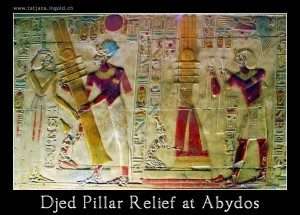
''Raising''?
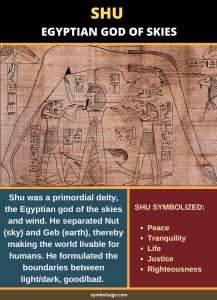
Khnum is the soul of Shu. {P44 'Ancient Egypt' / July-August 2023}.
Among those exhibiting will be the Jersey Beekeepers' Association and Jersey Dairy, alongside other members of the agricultural and aquaculture communities. The iconic Jersey potato, the Jersey Royal, will be a key feature alongside other Genuine Jersey produce, including Jersey Sea Salt. The King and Queen, who will later attend a tea party with islanders, will also hear about the island's climate, energy, and offshore wind farm plans, transport and natural environment.
Jersey will get a bank holiday when King Charles III and Queen Camilla visit the Channel Islands next month after politicians overwhelmingly backed the plans in the States Assembly this morning. Members voted by 36 votes to three in favour of the ministerial proposal for the holiday to coincide with the royal visit on Monday 15 July.
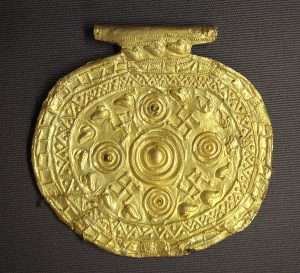
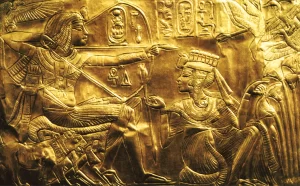
Giving directions?
The Royal Visit is set to include a special Sitting of the States Assembly and the Royal Court in the Royal Square followed by a large-scale, open-air exposition in the vicinity of Weighbridge Place and Liberation Square that will showcase the best of Jersey.
Guernsey confirmed last week that a public holiday will be held to mark the visit of Their Majesties to the island on the following day, Tuesday 16 July.
Fifteen/sixteen?
AND/OR: Jersey (/ˈdʒɜːrzi/ JUR-zee; Jèrriais: Jèrri [ʒɛri]), officially known as the Bailiwick of Jersey,[d][12][13][14] is an island country and self-governing British Crown Dependency near the coast of north-west France.[15][16][17] It is the largest of the Channel Islands and is 14 miles (23 km) from the Cotentin Peninsula in Normandy.[18] The Bailiwick consists of the main island of Jersey and some surrounding uninhabited islands and rocks including Les Dirouilles, Les Écréhous, Les Minquiers, and Les Pierres de Lecq.[19]
Jersey was part of the Duchy of Normandy, whose dukes became kings of England from 1066. After Normandy was lost by the kings of England in the 13th century, and the ducal title surrendered to France, Jersey remained loyal to the English Crown, though it never became part of the Kingdom of England.

To many lagers?
A bailiwick (/ˈbeɪlɪwɪk/)[1] is usually the area of jurisdiction of a bailiff, and once also applied to territories in which a privately appointed bailiff exercised the sheriff's functions under a royal or imperial writ.
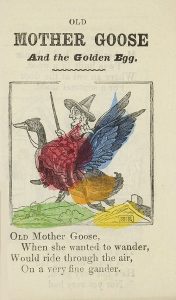 In English, the original French bailie combined with -wic, the Anglo-Saxon suffix (meaning a village) to produce a term meaning literally 'bailiff's village'—the original geographic scope of a bailiwick. In the 19th century, it was absorbed into American English as a metaphor for a sphere of knowledge or activity.
In English, the original French bailie combined with -wic, the Anglo-Saxon suffix (meaning a village) to produce a term meaning literally 'bailiff's village'—the original geographic scope of a bailiwick. In the 19th century, it was absorbed into American English as a metaphor for a sphere of knowledge or activity.
The term can also be used colloquially to mean 'one's area of expertise'
Heb-Sed?
[7]. ’King’ of the ‘animals’ = Cernuous = Highest ‘point’ in lowest division, i.e., Borderline [ Key ] between higher/lower mysteries. Common parlance 'leading a duck to water'. Think about it, in relation to a 'return' journey by way of a 'medium', i.e., water, [symbolism of]. "The great goddess sometimes has as her bird of epiphany, a swan, a goose or a duck."[ 'The Riddle of the Sphinx']. Recall the ''animals'' on the base of those 'T' shaped pillars.
'Fire' / Soul?
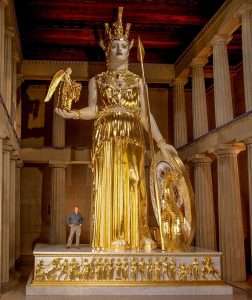
Athene with Nike in left hand: Chryselephantine statues were built around a wooden frame with thin carved slabs of ivory attached, representing the flesh, and sheets of gold leaf representing the garments, armour, hair, and other details. In some cases, glass paste, glass, and precious and semi-precious stones were used for detail such as eyes, jewellery, and weaponry.
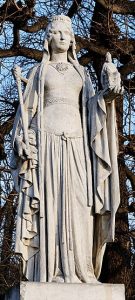
Statue of Bertrada by Eugène Oudiné, one of the twenty Reines de France et Femmes illustres in the Jardin du Luxembourg, Paris.
And/or: In the 20th century, Katherine Elwes-Thomas theorised that the image and name "Mother Goose" or "Mère l'Oye" might be based upon ancient legends of the wife of King Robert II of France, known as "Berthe la fileuse" ("Bertha the Spinner") or Berthe pied d'oie ("Goose-Footed Bertha" ), often described as spinning incredible tales that enraptured children.[10] Other scholars have pointed out that Charlemagne's mother, Bertrada of Laon, came to be known as the goose-foot queen (regina pede aucae).[11] There are even sources that trace Mother Goose's origin back to the biblical Queen of Sheba.[12] Stories of Bertha with a strange foot (goose, swan or otherwise) exist in many languages including Middle German, French, Latin and, Italian. Jacob Grimm theorised that these stories are related to the Upper German figure Perchta or Berchta (English Bertha).[13] Like the legends of "Bertha la fileuse" in France and the story of Mother Goose Berchta was associated with children, geese, and spinning or weaving,[14] although with much darker connotations.
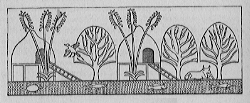 The idiom “cook someone’s goose” means to do something that spoils someone’s plans and prevents them from succeeding. The underlying idea behind this phrase seems to be that a goose was cherished and fattened up for a special occasion. Therefore, cooking it prematurely would spoil the plans for a feast. For example, if you tell someone that you can’t help them, you’re essentially “cooking their goose.”
The idiom “cook someone’s goose” means to do something that spoils someone’s plans and prevents them from succeeding. The underlying idea behind this phrase seems to be that a goose was cherished and fattened up for a special occasion. Therefore, cooking it prematurely would spoil the plans for a feast. For example, if you tell someone that you can’t help them, you’re essentially “cooking their goose.”
.............................
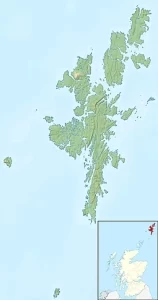
Other islands = Noss, Unst, Mousa. Enlarged elsewhere.
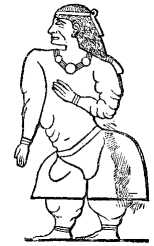
'Fat' of the land?
Side note: ''The name Foula (/ˈfuːlə/; Scots: also Foola; Norn: Fuglø), located in the Shetland archipelago of Scotland, is one of the United Kingdom’s most remote permanently inhabited islands. "Foula" derives from Old Norse Fugley, "bird island": compare the Faroese name of the island of Fugloy, "bird island", and Scottish Gaelic Fughlaigh.''
And/or: ''Foula continues to observe Christmas Day on the Sixth of January {Julian Calander}. Whereas all else changed over to the Gregorian calander in 1752.'' ['Pointless'].
The word ''epiphany'' used throughout in such programs as 'Will Self's Search For Meaning' {Radio 4/4pm/10.8.16}. Many opinions given about ''the nature of our existence'' as seen differently in all philosophy's and religions. Understand this one final subject to define all those convoluted questions and answers.
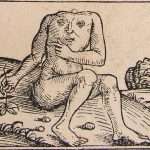
Thinking from the heart? Blemmyes to enlarge?
Something to ponder on: "Not every discovery from the tomb is so mysterious - some appear downright comical. A container in the shape of a cooked duck was found to contain the remains of a real mummified duck...." [Readers Digest on King Tut. December 2019].
Roasted or boiled? 'Untouched by fire'?
'To cook in its own juices' = Three parts water, one land?
Side note: ''Duck device'' and Boar device'' - with shields and spears. {Page 320 'White Goddess'].
Try goose / duck in relation to Akhenaten and his 'son' Tutankhamun - for an epiphany moment.
Lotus flower? Like the petals found - in the middle of the forehead - on the uppermost coffin within the yellow quartzite sarcophagus.
REFRESHER: "Gudea made offerings of honey and butter when the foundations were laid; when the building was finished an auspicious day was waited for, and when it came the image of the god was removed to the new temple, and Gudea sprinkled the ground with oil, and set out offerings of honey, butter, wine and dates, grain mixed with milk, food untouched by 'fire', for the gods." [ Chapter 3, 'The Sacred Bee'].
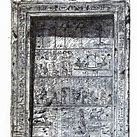
The Inventory Stela. ''A U-Shaped frame around an apparition 'window'...." {Wiki}. Isis related THEREFORE representing ALL ''female'' aspects {including ''maidenhood''?}.
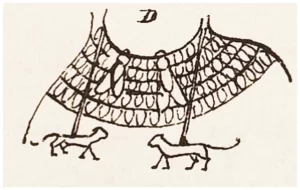 Side note: "She looked out of the window as white as any milk - and he looked in at the window as black as any silk... Hullo, hullo you coal blacksmith, and what is your silly song? You shall never have my maidenhead that i have kept so long!...Then she became a hare, a hare all on the plain, and he became a greyhound dog and chased her back again. And she became a duck, a duck all on the stream, and he became a water dog and fetched her back again. Then she became a fly, a fly all in the air, and he became a spider bold and dragged her to his lair..." [Extract from the folksong 'The Two Magicians' taken from the book 'Where is Saint George'. Mentioned elsewhere].
Side note: "She looked out of the window as white as any milk - and he looked in at the window as black as any silk... Hullo, hullo you coal blacksmith, and what is your silly song? You shall never have my maidenhead that i have kept so long!...Then she became a hare, a hare all on the plain, and he became a greyhound dog and chased her back again. And she became a duck, a duck all on the stream, and he became a water dog and fetched her back again. Then she became a fly, a fly all in the air, and he became a spider bold and dragged her to his lair..." [Extract from the folksong 'The Two Magicians' taken from the book 'Where is Saint George'. Mentioned elsewhere].
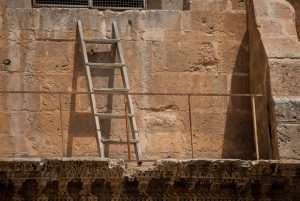
Looking in or out?
Analogy: Cressing is situated in central Essex between the towns of Witham and Braintree. The manor was given by Queen Matilda to the Knights Templar in 1137. Their management of the 1000 acre home farm was so successful that they soon needed to build two new barns {one for wheat and one for barley}, which still survive. They are the oldest and finest 13th century barns in the country.....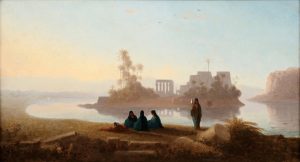 The fountain and knot garden can be seen to the west...Constructing the garden was a complex task, preceded by an archaeological investigation. The principal features are a viewing platform {'pavilion'?} replicating a raised terrace for which evidence was found in the excavations, overlooking a knot garden. AND/OR: "Knot gardens are arranged in a square with a formal symmetrical design. They are planted with evergreen hedging and were designed to be viewed from an upstairs window, so were often located close to the house." 'Philae' to enlarge.
The fountain and knot garden can be seen to the west...Constructing the garden was a complex task, preceded by an archaeological investigation. The principal features are a viewing platform {'pavilion'?} replicating a raised terrace for which evidence was found in the excavations, overlooking a knot garden. AND/OR: "Knot gardens are arranged in a square with a formal symmetrical design. They are planted with evergreen hedging and were designed to be viewed from an upstairs window, so were often located close to the house." 'Philae' to enlarge.
Knot of the heart?
Continued: "The only clear pictorial confusion between the hieroglyphs of a white fronted goose {in the normal hieroglyphic spelling of the name 'Geb', often followed by the addition of the -b- sign] and a Nile goose in the spelling of the name Geb occurs in the rock cut tomb of the provincial governor Sarenput the 2nd {12th Dyn. / Middle kingdom} on the Qubba el-Hawa desert - ridge {opposite Aswan}, namely on the left [southern] wall, near the open doorway, in the first line of the brightly painted funerary offering formula. This confusion is to be compared to the frequent hacking out of Akhenatens agents of the sign of the Pintail Duck [meaning 'son'] in the Royal title meaning 'Son of Re', especially in the Theban temples, where they confused the duck sign with that of the Nile Goose regarded as a 'form' of the then forbidden god Amon." [Wikipedia / Geb].

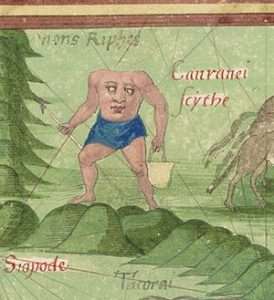
Unusual ''religious beliefs'' or a universal mind set? 'Green gold' {i.e., copper} in the bucket? WEST?
And/or: An enactment at Thebes within the Sed Festival of Amenhotep showing - monkey, pintail duck and a leaping bull calf in relation to: 'A new royal body has to be roasted and created by the female {Hathor} if the king is to be reborn again...The coming of 'gold' that reinfuses him with life and vitality, initiating him to a new shining existence at dawn.'' [Pages 27/8 'Hathor Rising' / A. Roberts].
REFRESHER: 'The star of your Being is rising'?
''The swan is white without spot..." quote by Leonardo da Vinci.
Side note: {A working example?}: ''Without blemish'' - a title given to women by Amenhotep the third.

LIGHT AND DARK: Side note: 'Feet' = S/W and S/E of picture frame. 'Head' {with metal helmet} = apex of a triangle. Aries/Pisces?
And/or: ''Moses called all the elders of Israel and said to them: 'Select lambs for yourselves, according to you clans/families, and kill the Passover lamb. Take a bunch of Hyssop and dip it in the blood that is in the basin and touch the lintel and two doorposts with it. And none shall leave the house till morning.[Exodus 12:21 + 12:48].
Evening/Dawn as a means....
Side step: 'Twentyone' = {3x7} + 48 = {6x8} = 'fourteen'.
''Hyssopus officinalis or hyssop is a shrub in the Lamiaceae or mint family native to Southern Europe, the Middle East, and the region surrounding the Caspian Sea....In the Old Testament hyssop was used to sprinkle blood as part of the Jewish Passover. Hyssop was mentioned in the Bible for its cleansing effect in connection with plague, leprosy and chest ailments and symbolically in cleansing the soul.''

“Most certainly, I tell you, one who doesn’t enter by the door into the sheep fold, but climbs up some other way, is a thief and a robber." 'Pan/ladle' to enlarge.
Side note: "Neophyte grade {MThIHD} ; meaning 'converted'. The root of the word 'converted', other than its obvious usage in religious terminology, is 'to turn around'. It signifies a turning around of attention to that which is not apparent. It is when the person in Plato's cave first wonders about the shadows on the wall and turns around to see from where they are being cast. This begins a new phase in their life, hence 'Neophyte', one 'new' to that direction...The word MThChIL is also similar to MThIChH meaning 'stretched', 'extended'. The conversion or transformation that goes on at Neophyte is one where the person is stretched...Interesting by gematria, the word has the value of 488 , the same value as PhThCh, meaning 'gate, 'entrance' 'insight'. " [Extract from the book 'The Magister' ]. Try ''gate'' and/or ''door''.
'Circumpolar'?
 CONTINUED: ''Unblemished lamb { ''with no broken bones''} to be sacrificed {'neck' cut} on the fourteen{th} day, the blood of which is painted on the doorposts and lintels with hyssop prior to leaving on Passover: ''The lamb of which is roasted and eaten while stood up {'upright'?} ''with their sandals on'' during the night prior to leaving.'' [Day eight. Pilgrimage: Lent 2023 / Magdala].
CONTINUED: ''Unblemished lamb { ''with no broken bones''} to be sacrificed {'neck' cut} on the fourteen{th} day, the blood of which is painted on the doorposts and lintels with hyssop prior to leaving on Passover: ''The lamb of which is roasted and eaten while stood up {'upright'?} ''with their sandals on'' during the night prior to leaving.'' [Day eight. Pilgrimage: Lent 2023 / Magdala].
Sheep Decans?
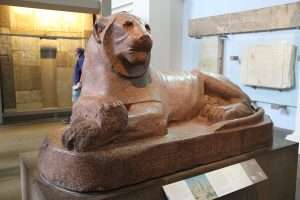
Gebel Barkal lions. At rest?
And/or: ''The birthday of the solar god, occuring at the winter solstice, is one of the oldest festivals in human consciousness, and celebration of the Great Mother and her holy child runs deep throughout all cultures in the ancient Near East....During the winter solstice, the brightest star in the Northern Cross - Deneb in the constellation of Cygnus; often depicted as a bird in flight with its wings stretched - marks the precise location of the vulva of the goddess. It is from this split in the legs that the child of Nut is born....Where the Milky Way appears to split into two seperate channels, the goddess's legs are formed....
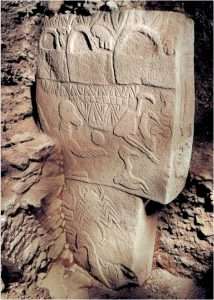
Side note: idiom. : to help, teach, or take care of (someone who is younger or has less experience) He took the rookie pitcher under his wing.

An objective eye?
''He will cover you with His pinions, And under His wings you may seek refuge; His faithfulness is a shield and rampart.'' {Psalm 91:4}. 'Fortress' to enlarge. S/W?
''Keep me as the apple of the eye; Hide me in the shadow of Your wings.'' {Psalm 17:8}.
''Behold, He will mount up and swoop like an eagle and spread out His wings against Bozrah; and the hearts of the mighty men of Edom in that day will be like the heart of a woman in labor.'' {Jeremiah 49:22}.
''......how often I have longed to gather your children together, as a hen gathers her chicks under her wings.....''
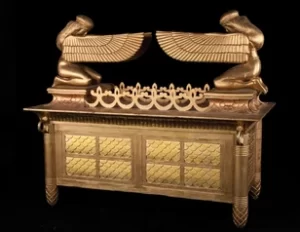
Gap?
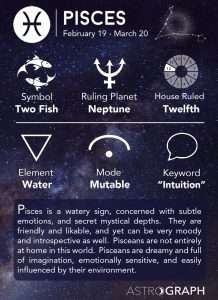 Continued: During the winter solstice the constellation Cygnus clears the horizon about two hours before sunrise {heliacal?}. The bright star Deneb rests slightly above the horizon....Around 7am on the solstice, the sun rises again exactly on the spot where Deneb previously occupied the horizon - and the days become longer....The original festival celebrating the sun's birth was called Mesut Re....represented with the Greeks to indicate the final month of the year, calling it mesore. The month of mesore begins in the Gregorian calandar on June fourteen{th}.... The celebration of the birth of the sun god likewise celebrates the Great Mother, the cow goddess, from whose udders stream the brilliant blue-white stars that form our Milky Way. Our word galaxy comes from the word gala, originally meaning 'milk'....The goddess of which represented with the horned diadem.'' [Page 71/2 'Feasts of Light: Egyptian Goddess Mysteries for the Seasons of Life' / N. Ellis].
Continued: During the winter solstice the constellation Cygnus clears the horizon about two hours before sunrise {heliacal?}. The bright star Deneb rests slightly above the horizon....Around 7am on the solstice, the sun rises again exactly on the spot where Deneb previously occupied the horizon - and the days become longer....The original festival celebrating the sun's birth was called Mesut Re....represented with the Greeks to indicate the final month of the year, calling it mesore. The month of mesore begins in the Gregorian calandar on June fourteen{th}.... The celebration of the birth of the sun god likewise celebrates the Great Mother, the cow goddess, from whose udders stream the brilliant blue-white stars that form our Milky Way. Our word galaxy comes from the word gala, originally meaning 'milk'....The goddess of which represented with the horned diadem.'' [Page 71/2 'Feasts of Light: Egyptian Goddess Mysteries for the Seasons of Life' / N. Ellis].
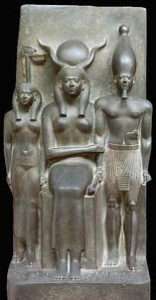
Hare top left.
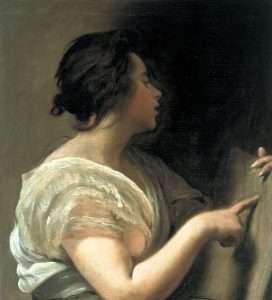
New blank slate? 'Finger' for a pen?
And/or: "So, as we finish our visit here in the tomb of the virgin Mary, i want to go back to the book of Isaiah. A visual image in prayer within the alcove tomb of Mary: 'He has clothed me in a robe of salvation and wrapped me in a mantle of justice. Like a bridegroom adorned with a diadem, like a bride bedecked with her jewels. Nations shall behold your vindication, and all kings, your glory. You shall be called by a new name, pronounced by the mouth of the Lord. You shall be glorious. Glorious crown in the HAND of the lord. A royal diadem held by your god.' This is what is awaiting us. This is what Mary opens us up to, as the lord brings her to him and holds her, as it says - as the Queen dressed in gold on my right, as it says in the Psalms.... In the Liturgy of the Assumption of Mary into heaven it says: in this place the Virgin Mother of god was assumed into heaven as an image of the churches coming to perfection and as a sign of hope and comfort for all pilgrims. Rightly, that you would not allow her to see the corruption of the tomb since from her own body, she marvellously brought forth your incarnate son, the author of life." [Day Nine / lent 2024 / Magdala].
''In the Christian tradition, the 25th {'twentyfive' } of March - is the date that Mary was told she would give birth to Jesus.''
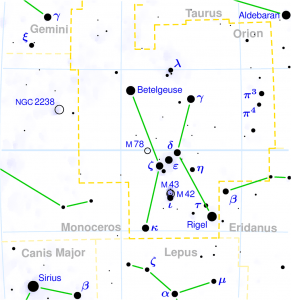
Walking backwards or forwards?

Diadem?
''When the birth of Ra occurs soon after winter solstice, we have only to count backward 272, the number of days that a human child gestates in its mothers womb, to find the spring equinox as his conception day. The Birth of Ra and the Pregnancy of Nut are ancient prehistoric feast days.'' [Page 101 same book].
Solstice / Equinox as a means.....
Northern/Southern Hemispheres ?
''According to folklore, worms begin to emerge from the earth at the spring equinox.'' ['The Chase'].
''The heliacal rising (/hɪˈlaɪ.əkəl/ hih-LY-ə-kəl)[1][2][3] or star rise of a star occurs annually, or the similar phenomenon of a planet, when it first becomes visible above the eastern horizon at dawn just before sunrise (thus becoming "the morning star") after a complete orbit of the earth around the sun.[4] Historically, the most important such rising is that of Sirius, which was an important feature of the Egyptian calendar and astronomical development. The rising of the Pleiades heralded the start of the Ancient Greek sailing season, using celestial navigation.[5], as well as the farming season (attested by Hesiod in his Works and Days).''
"In Greek mythology the swan was the bird consecrated by Apollo; the symbol of harmony..."
'Mans Search for Meaning' / Viktor Frankl.
Question. Can you determine those differences [subtle?] between all three [water/land] bird animals? relative to an 'understanding'. Question 2. Why go to all this trouble?
N.B. Geese associated more with North. Ducks with South. Swans?
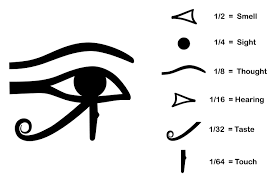
A centering within.
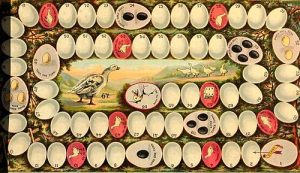
Golden eggs?
From a different perspective: ''As an emblem of the first matter, the beehive can often be seen in decorations that borrow their elements from the science of Hermes. We have seen it on the ceiling of the Hotel Lallemant and among the panels of the alchemical stove of Winterthur. It also occupies one of the squares of the Game of the Goose, a popular representation of the labyrinth of the secret Art and collection of the main hieroglyphs of the Great Work....The Game of the Goose also sounds like the Game of the Law in French - could be compared to 'snakes and ladders'. There is a spiral drawn on a board resembling the labyrinth on the floor of the Cathedral of Chartres - with 63 boxes. The idea is to get to the center of the spiral.'' [Page 395 'The Dwellings of the Philosophers' / Fulcanelli].
Center = middle = 64th? {'sixtyfour'}.
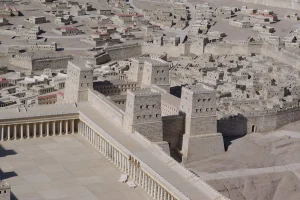
'Chester' to enlarge.
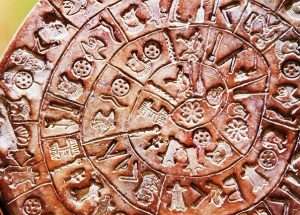
Phaistos Disc: Common factors?
From a different perspective: "The Vikings played a variety of board games, including Hnefatafl, which was a war strategy game similar to chess. The game was played on a square board with 64 squares arranged in an 8x8 grid 1. The objective of the game was to capture the king game piece 2. You can draw a grid on a piece of paper and use anything you have to hand as counters! At the start of the game, you have a king on his throne in the center of the board surrounded by 12 defenders. On each edge, you have 5 attackers and then a 6th in the middle of the next row for a total of 'twentyfour'. Pieces can move any number of squares up/down or side to side but not diagonally – like the rook in chess. The attackers’ job is to capture the king. Defenders have to protect the king and give it safe passage to a corner square. You capture your opponent’s pieces by sandwiching them between two of your own. To capture the king, attackers have to surround him."
Inner/outer.
![2255301__7VHBAwFhnAQqIrk3kGIBIqzHUIFULKR8K2dK-goYV0[1]](https://esotericbasics.co.uk/wp-content/uploads/2255301__7VHBAwFhnAQqIrk3kGIBIqzHUIFULKR8K2dK-goYV01-300x300.jpg) That ''borderline'' represented as the 'middle way'. Mount Sinai = Hebrew equivalent. Hindu equivalent = Pashupati. Egypt equivalent = The word ’Memphis’, [ explained elsewhere ]. Especially in relation to the layout/sequence of the Egyptian ’Nomes’. Hermetic equivalent the word ‘shoreline’. = Wet/Dry division of the same. [ Explained elsewhere ]. Sumerian equivalent = ‘Nibiru’. Point of 'crossing’. Chapter eight.12th planet. By Z. Sitchin. Christian equivalent = ‘Cross over’ point between nave/transcept. Alchemy defines that same principle with the word ''conjunction.''
That ''borderline'' represented as the 'middle way'. Mount Sinai = Hebrew equivalent. Hindu equivalent = Pashupati. Egypt equivalent = The word ’Memphis’, [ explained elsewhere ]. Especially in relation to the layout/sequence of the Egyptian ’Nomes’. Hermetic equivalent the word ‘shoreline’. = Wet/Dry division of the same. [ Explained elsewhere ]. Sumerian equivalent = ‘Nibiru’. Point of 'crossing’. Chapter eight.12th planet. By Z. Sitchin. Christian equivalent = ‘Cross over’ point between nave/transcept. Alchemy defines that same principle with the word ''conjunction.''
"The Chinese word for it means ''heartmind,'' and the ancient Egyptian word means ''intelligence of the heart.'' Yet this concept of the complete merging of thoughts and feelings is crucial in achieving personal Conjunction. In psychological terms, Conjunction unites our thoughts with our feelings in moments of true wisdom [eureka moments link]. The alchemists referred to these two opposed ways of knowing as Solar and Lunar consciousness." [Both paragraphs taken from 'Sorcerers Stone'. Mentioned elsewhere].
January sixth?
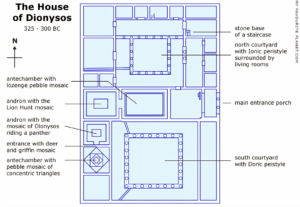
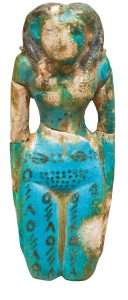
Truncated at the 'knees'.
"The union of Solar and Lunar consciousness produces a 'superior' third way of knowing called Stellar consciousness. Stellar consciousness is a state of incorruptible wisdom symbolized by the heroic Child of the Philosophers, the metal gold, a diamond {'truffle'?} or pearl, the Philosophers Stone, the astral body, and of course the stars. Remember, that in view of the alchemists, we are all embarked on a journey through the manifested planets - a journey home to the stars." [Same book]. Try ''intuition''.
The ''golden child'' ?
'Diamond of Virgo'.

"Four Corners Monument, marking the only spot in the United States where four states (Arizona, Utah, Colorado, and New Mexico) come together."
Golden birch?
''In the Northern Hemisphere the Lunar New Year occurs in winter.''
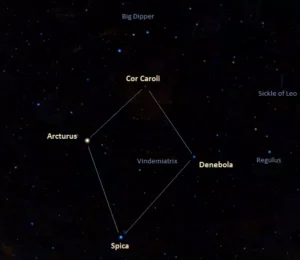
The metaphysical properties of the traditional gemstone that represents Virgo is blue sapphire. This gemstone provides inner vision and crystal-clear clarity.
A pattern of four prominent stars in four separate constellations that form a recognisable diamond shape during spring nights in the northern hemisphere. At the base of the Great Diamond is Spica, the brighest of Virgo's stars, and so this asterism is sometimes known as the 'Diamond of Virgo'.
The Great Diamond is composed of four stars: Arcturus in Boötes, the herdsman; Cor Caroli in Canes Venatici, the hunting dogs; Denebola in Leo, the lion {'tail'}; and Spica in Virgo, the virgin.

Anything inscribed or 'set in stone'?
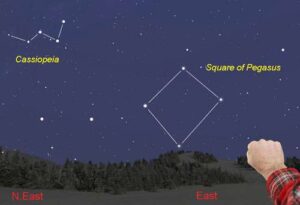 Side note: ''During recent excavations of the pole dwellings on the little LAKE at Burgaeschi, in Canton Solothurn {'landlocked'?}, a group of boulders was discovered wrapped in the bark of birch trees. This very ancient conception of the 'magical' power of stones led to a higher level of culture to the similar importance attached to gems...Another myth belongs to the Navaho Indians of Arizona: In the days of the great darkness, the ancestors of the 'hero' saw the sky Father descending and the Earth Mother rising UP to meet him.They united, and on top of the 'mountain' where the union took place the ancestors found a little figure {'ishon'?}, made of turquoise. This turned into {or in another version gave birth to} Estsanatlehi, 'the woman who rejuvenates or transforms herself'....She was the mother or grandmother of the gods. '' {Page 98 'Alchemical Studies' / C. G. Jung].
Side note: ''During recent excavations of the pole dwellings on the little LAKE at Burgaeschi, in Canton Solothurn {'landlocked'?}, a group of boulders was discovered wrapped in the bark of birch trees. This very ancient conception of the 'magical' power of stones led to a higher level of culture to the similar importance attached to gems...Another myth belongs to the Navaho Indians of Arizona: In the days of the great darkness, the ancestors of the 'hero' saw the sky Father descending and the Earth Mother rising UP to meet him.They united, and on top of the 'mountain' where the union took place the ancestors found a little figure {'ishon'?}, made of turquoise. This turned into {or in another version gave birth to} Estsanatlehi, 'the woman who rejuvenates or transforms herself'....She was the mother or grandmother of the gods. '' {Page 98 'Alchemical Studies' / C. G. Jung].
''Mountain low, Valley high'' to enlarge.
Side note: From a different perspective: ''Guard strictly, your habit of prayers, especially the MIDDLE prayer. And STAND before Allah in a devout frame of mind.'' {Surah 2:238}.
''The Middle Prayer: Al Salat al wusta: may be translated ''the best or most excellent prayer.'' Authorities differ to the exact meaning of this phrase....Seems to be in favour of ''in the middle of the afternoon.'' {notes: Abdullah Yusuf Ali}.
Zenith/ Summer solstice to enlarge.
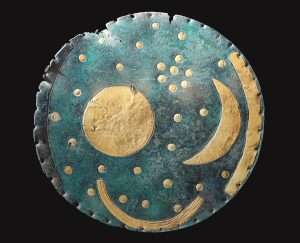
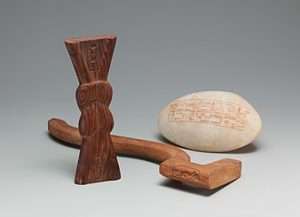 HENCE: "This turned into (or in another version gave birth to) Estsanatlehi, "the woman who rejuvenates or transforms herself." She was the mother of the twin gods who slew the primordial monsters, and was called the mother or grandmother of the gods {yei). Estsanatlehi is the most important figure in the matriarchal pantheon of the Navaho. Not only is she the "woman who transforms herself," but she also has two shapes, for her twin sister, Yolkaiestsan, is endowed with similar powers. Estsanatlehi is immortal, for though she grows into a withered old woman she rises up again as a young girl —a true Dea Natura. From different parts of her body four daughters were born to her, and a fifth from her spirit. The sun came from the turquoise beads hidden in her right breast, and from white shell beads in her left breast the moon {'New name'?}. She issues reborn by rolling a piece of skin from under her left breast. She lives in the west, on an island in the sea. Her lover is the wild and cruel Sun Bearer, who has another wife; but he has to stay at home with her only when it rains. The turquoise goddess is so sacred that no image may be made of her, and even the gods may not look on her face. When her twin sons asked her who their father was, she gave them a wrong answer, evidently to protect them from the dangerous fate of the hero. This matriarchal goddess is obviously an anima figure who at the same time symbolizes the self. Hence her stone-nature, her immortality, her four daughters born from the body, plus one from the spirit, her duality as sun and moon, her role as paramour, and her ability to change her shape.
HENCE: "This turned into (or in another version gave birth to) Estsanatlehi, "the woman who rejuvenates or transforms herself." She was the mother of the twin gods who slew the primordial monsters, and was called the mother or grandmother of the gods {yei). Estsanatlehi is the most important figure in the matriarchal pantheon of the Navaho. Not only is she the "woman who transforms herself," but she also has two shapes, for her twin sister, Yolkaiestsan, is endowed with similar powers. Estsanatlehi is immortal, for though she grows into a withered old woman she rises up again as a young girl —a true Dea Natura. From different parts of her body four daughters were born to her, and a fifth from her spirit. The sun came from the turquoise beads hidden in her right breast, and from white shell beads in her left breast the moon {'New name'?}. She issues reborn by rolling a piece of skin from under her left breast. She lives in the west, on an island in the sea. Her lover is the wild and cruel Sun Bearer, who has another wife; but he has to stay at home with her only when it rains. The turquoise goddess is so sacred that no image may be made of her, and even the gods may not look on her face. When her twin sons asked her who their father was, she gave them a wrong answer, evidently to protect them from the dangerous fate of the hero. This matriarchal goddess is obviously an anima figure who at the same time symbolizes the self. Hence her stone-nature, her immortality, her four daughters born from the body, plus one from the spirit, her duality as sun and moon, her role as paramour, and her ability to change her shape. 
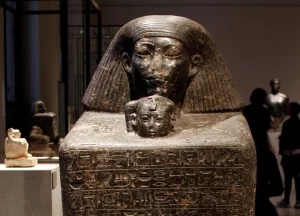 The self of a man living in a matriarchal society is still immersed in his unconscious femininity, as can be observed even today in all cases of masculine mother-complexes. But the turquoise goddess also exemplifies the psychology of the matriarchal woman, who, as an anima figure, attracts the mother-complexes of all the men in her vicinity and robs them of their independence, just as Omphale held Herakles in thrall, or Circe reduced her captives to a state of bestial unconsciousness—not to mention Benoit's Atlantida, who made a collection of her mummified lovers. All this happens because the anima contains the secret of the precious stone, for, as Nietzsche says, "all joy wants eternity." Thus the legendary Ostanes, speaking of the secret of the "philosophy," says to his pupil Cleopatra: "In you is hidden the whole terrible and marvellous secret. . . . Make known to us how the highest descends to the lowest, and how the lowest ascends to the highest, and how the midmost draws near to the highest, and is made one with it." ^"^ This "midmost" is the stone, the mediator which unites the opposites. Such sayings have no meaning unless they are understood in a profoundly psychological sense." {same}.
The self of a man living in a matriarchal society is still immersed in his unconscious femininity, as can be observed even today in all cases of masculine mother-complexes. But the turquoise goddess also exemplifies the psychology of the matriarchal woman, who, as an anima figure, attracts the mother-complexes of all the men in her vicinity and robs them of their independence, just as Omphale held Herakles in thrall, or Circe reduced her captives to a state of bestial unconsciousness—not to mention Benoit's Atlantida, who made a collection of her mummified lovers. All this happens because the anima contains the secret of the precious stone, for, as Nietzsche says, "all joy wants eternity." Thus the legendary Ostanes, speaking of the secret of the "philosophy," says to his pupil Cleopatra: "In you is hidden the whole terrible and marvellous secret. . . . Make known to us how the highest descends to the lowest, and how the lowest ascends to the highest, and how the midmost draws near to the highest, and is made one with it." ^"^ This "midmost" is the stone, the mediator which unites the opposites. Such sayings have no meaning unless they are understood in a profoundly psychological sense." {same}.
Smith/Jones to enlarge.
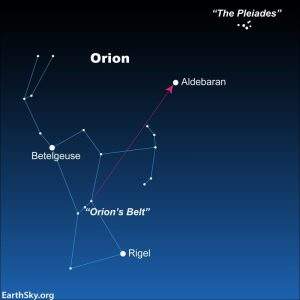
Follow both triangles {up and down} to the apex of both. What shape is formed?
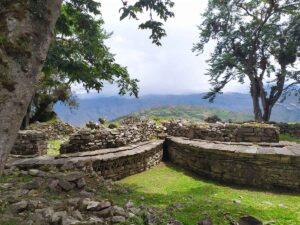
Same shape within these walls. Above the clouds?
A working example: The temple of Serabit el-Khadim is located on a plateau on top of a mountain in south-west Sinai. From earliest dynastic times, pharaohs sent expeditions to Sinai in search of turquoise and copper, and abundant seams of turquoise were found in the Serabit region. Hathor had the epithet ‘Lady of Turquoise’, so it is no surprise to find a temple dedicated to Hathor near the mine workings....The temple is compact, about 70m long by 35m wide, but full of stelae erected along its processional routes. Although the temple that we see today was started by Senusret I, Petrie reports finding the breast and back of a stone falcon, inscribed with the cartouche of Sneferu, which he thought dated to that king’s reign (c.2613-2589 BC). This would make it the earliest object found at the site, but Gardiner (1955) describes this dating as ‘very suspect’. It is probably a later piece on which the cartouche of Sneferu was written to celebrate his memory.
Petrie also found a small head of green steatite {soap stone}. It is only 7cm high, but would have been part of a statuette, around 30cm tall, dedicated to Hathor. The cartouche on the forehead identifies Queen Tiye, wife of Amenhotep III. The head’s features follow the artistic principles of that time, with almond-shaped eyes and a thin nose. The down-turned mouth is often seen in portrayals of Tiye, and has led to her reputation as a tough character. Petrie writes of the ‘haughty dignity of the face’ and how the expression is one of ‘disdain without malice’. ['Page 52 'Ancient Egypt' - Nov-Dec 2024].
Continued: Solothurn (/ˈsoʊlətʊərn, ˈzoʊ-/ SOH-lə-toorn, OH-, German: [ˈzoːlotʊrn] ; French: Soleure [sɔlœʁ]; Italian: Soletta [soˈletta]; Romansh: ) is a town, a municipality, and the capital of the canton of Solothurn in Switzerland. It is located in the north-west of Switzerland on the banks of the Aare and on the foot of the Weissenstein Jura mountains.
The town is the only municipality of the district of the same name.

 The town got its name from Salodurum, a Roman-era settlement. From 1530 to 1792 it was the seat of the French ambassador to Switzerland. The pedestrian-only old town was built between 1530 and 1792 and shows an impressive array of Baroque architecture, combining Italian Grandezza, French style, and Swiss ideas. The town has eighteen structures listed as heritage sites. The official language of Solothurn is (the Swiss variety of Standard) German, but the main spoken language is the local variant of the Alemannic Swiss German dialect.
The town got its name from Salodurum, a Roman-era settlement. From 1530 to 1792 it was the seat of the French ambassador to Switzerland. The pedestrian-only old town was built between 1530 and 1792 and shows an impressive array of Baroque architecture, combining Italian Grandezza, French style, and Swiss ideas. The town has eighteen structures listed as heritage sites. The official language of Solothurn is (the Swiss variety of Standard) German, but the main spoken language is the local variant of the Alemannic Swiss German dialect.
In 1252, a group of nobles that could witness and support deeds, known as consuls et cives Solodorenses, first appears in the town. Initially the nobles exercised power over the entire town. However, the guild movement of the 14th century resulted in a reduction in the power of the nobles and also a restricted guild system in Solothurn. By around 1350, an eleven-member Altrat (Council of Elders) and a 22-member Jungrat (Younger Council) existed in the city. Each of the eleven guilds were represented by a member of the Altrat and two members of the Jungrat. These 33 councillors exercised, together with the mayor, the power of government and helped appoint lawmakers.
'Thitythree'.
Continued: Working example: Something hinted at: ''Herodotus wrote: This river has its source in the country of the Celts near the city Pyrene, and runs through the middle of Europe, dividing it into two portions. The Celts live beyond the pillars of Hercules, and border on the Cynesians, who dwell at the extreme west of Europe. Thus the Ister flows through the whole of Europe before it finally empties in the Black Sea.''
''This paragraph has long confused historians, has it seems to offer a number of contradictions.'' [Page 28/9 'The Celts' / A. Roberts].
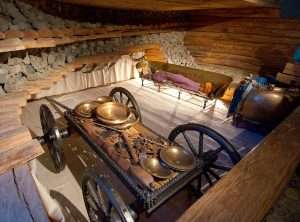
Hochdorf Prince.
Question. Was Herodotus a member of any 'Mystery Club'. Is there 'wisdom' to be found in that mindset?
Cold/Warm. East/West as a means.....

Jumping spiders.
What about N/S?
'Pyr' and 'Caroline' to enlarge.
Ennerdale?
And/or: ''Ideas have a life of their own. We dont need to invoke the expansion of a particular tribe to explain the spread of the Urnfield culture. Instead, this phenomenon seems to reflect the spread of ideas, which were probably jumping on the numerous bandwagons of trade links...'' [Page 49].
The Wain.
Continued: ''A birch has smooth, resinous, varicoloured or white bark, marked by horizontal pores (lenticels), which usually peels horizontally in thin sheets, especially on young trees. On older trunks the thick, deeply furrowed bark breaks into irregular plates.''
Horizontal/Vertical?

''Take this as a sign of the wholeness you have become.'' Jung's dream prior to death {'rebirth'?}.
And/or: ''The silver birch is a medium-sized deciduous tree that owes its common name to the white peeling bark on the trunk. The twigs are slender and often pendulous and the leaves are roughly triangular with doubly serrate margins and turn yellow and brown in autumn before they fall. The flowers are catkins and the light, winged seeds get widely scattered by the wind. The silver birch is a hardy tree, a pioneer species, and one of the first trees to appear on bare or fire-swept land. Many species of birds and animals are found in birch woodland, the tree supports a wide range of insects and the light shade it casts allows shrubby and other plants to grow beneath its canopy. It is planted decoratively in parks and gardens and is used for forest products such as joinery timber, firewood, tanning, racecourse jumps, and brooms. Various parts of the tree are used in traditional medicine and the bark contains triterpenes, which have been shown to have medicinal properties.''

Where have you seen it before?
Synchronistic example? {i.e.,if only in the 'ritual' sense of the word}: "At this crucial point Roma departed from her script to pick up on a spontaneous vision of a triangle of power between a Smith, a Child of Light, and a Rose and Lily wand, at which Bob felt as if a bag had suddenly been lifted from his head {''basket'' / 'Athene' links?}. At the previous years events he had received a firm 'instruction' to ''seek the mysterious Abbey and enter therein'' and later was given a ritual by those in the 'Abbey' to awaken the Smith at Wayland's Smithy. This had apparently been very successful, but now the appearance of a Child born out of the Earth was a new and significant development...Marian Green...
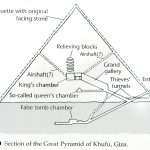
Off 'center'?
….doyenne of the Green Circle, also found Roma's working, and especially her digression, to be very important. In her eyes it managed to bring together a whole set of images, symbols and pieces of the complex Celtic maze of myths which had long been the basis of her own studies {'off center' ones?}. Not only did it focus some of the patterns of the past but clearly showed the direction for future study, with a great deal of work still to do on the Smith and the Child, who must have come forth from the blending of two streams, the red and white, within the heat of the forge..." ['I Called it Magic' / G. Knight].
'Double Pelican'?
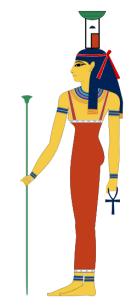
Nephthys was normally portrayed as a young woman, wearing a headdress in the shape of a house and basket. Nephthys is the Greek form of an epithet (transliterated as Nebet-hut, Nebet-het, Nebt-het, from Egyptian nbt-ḥwt). The origin of the goddess Nephthys is unclear but the literal translation of her name is usually given as Lady of the House or Lady of the Temple.
''Two headed briar? ....The symbol may appear as the letter Y...'' [Page 14 'A Celtic Quest'].
Y HVH?
'Basket' / Athene. One relates more to top/down than Bottom/up. Which and why?
Side note: ''Child born out of the earth'' = Perseus link in relation to horizontal/vertical? = {S/E?}. While recalling that ''child'' is implied in the 'spiritual' sense of the word, i.e.,within a learning curve - the beginning of one.
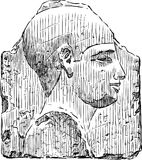
Remedy = ''no leak at the seam'' ? Try J. Woodroffe to enlarge.
"The 'child' motif represents not only something that existed in the distant past, but also something that exists now; that is to say; it is not just a vestige but a system functioning in the present whose purpose is to compensate or correct, in a meaningful manner, the inevitable one-sidedness and 'extravagances' of the conscious mind. It is the nature of the conscious mind to concentrate on relatively few contents and to raise them to the highest pitch of clarity. A necessary result and precondition is the exclusion of other potential contents of consciousness. The exclusion is bound to bring about a certain one-sidedness...The more he trains his will in this one-sidedness the more he gets lost and gets further from the laws and roots of his being....it becomes backward {'Orion'? as a means....}.....which piles up a Promethean debt which has to be paid off from time to time {Karma?}…." [Pages 81/2 'Science of Mythology: Essays on the Myth of the Divine Child and the Mysteries of Eleusis' / C. Jung and C. Kerenyi].
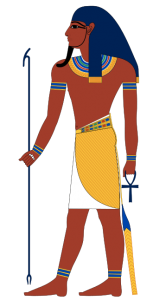
One-sided?
A {working?} example - that very first one? "A conjunction of Venus and Mars as they are setting occurs in Book 21, when: 'Queen Hera saw that vixen Aphrodite taking Ares through the crowd out of the battle'. The Moon and Venus were in the sky just before the lunar eclipse during the famous seduction of Zeus, when Hera tried to enlist the help of the goddess of beauty: 'My dear child, will you do what i am going to ask of you, or will you refuse me because you are angry at my being on the Greek side while you are on the Trojan?' Venus then disappeared from the evening sky and the Moon {Hera} took central stage when 'Aphrodite now went back into the house of Zeus, while Hera darted down from the summits of Olympus'." ['Homer's Secret Iliad'].
Question. Nothing more than dramatic effect in describing a 'lunar eclipse' or is a lunar eclipse used to define something else?
Question 2. Why different 'gods' on different 'sides'? Clue. In profile as opposed to face on.
'Many Faced God'? [Game of Thrones].
Incarnation/rein-carnation?
 Sufi equivalent = ‘Barzakh’, in relation to an...’Isthmus’, i.e.,The book [in relation to the Quran],is the barzakh or isthmus between mans intelligence and 'gods' knowledge of things as they are in themselves. It provides the 'god given' and providential means whereby man can come to know things in themselves...."[ Introduction,'The Sufi Path of Knowledge'].
Sufi equivalent = ‘Barzakh’, in relation to an...’Isthmus’, i.e.,The book [in relation to the Quran],is the barzakh or isthmus between mans intelligence and 'gods' knowledge of things as they are in themselves. It provides the 'god given' and providential means whereby man can come to know things in themselves...."[ Introduction,'The Sufi Path of Knowledge'].
Working example: ''isthmuses or isthmi; from Ancient Greek ἰσθμός (isthmós) 'neck') is a narrow piece of land {''land bridge''}, connecting two larger areas across an expanse of water ....a narrow piece of land connecting two larger areas across an expanse of water by which they are otherwise separated. A tombolo is an isthmus that consists of a spit or bar, and a strait is the sea counterpart of an isthmus... Wisconsin State Capitol, the only State Capitol ever built on an isthmus. The building houses Wisconsin's State Supreme Court, the Senate, and the Office of the Governor.'' [Wiki].
Side note: ''The state is one of the nation's leading dairy producers and is known as "America's Dairyland"; it is particularly famous for its cheese. The state is also famous for its beer, particularly and historically in Milwaukee, most notably as the headquarters of the Miller Brewing Company.''
''The pianist Liberace was born in 'W'isconsin in 1919.''
Cassiopeia to enlarge.
Recall Alexanders initial 'desire' to build his New City on the island {isthmus?} opposite.
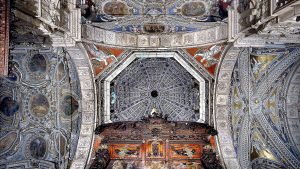
Built on the spot where the Virgin appeared in front of local resident Mario Omodei on 29 September 1504, it’s separate from the fortified town and sits strategically at the junction to the ancient church of Santa Perpetua that dominates the Tirano basin on a hilltop shaped by vineyards.
A realistic-looking fresco from 1513 on the left nave depicts the Scene of the Apparition, showing the area as it was at the beginning of the 1500s. Today, a long, tree-lined avenue connects Tirano vecchia (the old town) with the piazza of the Basilica, which is a reference point for the valley and iconic passage for the Bernina Express train, surprising tourists and pilgrims as it passes within metres of the site.
As an expression of the Lombard Renaissance, note its pyramidal shapes and regular placement of the oculi, the Rodarian-style small entrances (1506), and the magnificent main doorway (1530–34), a masterpiece by Alessandro Della Scala, originally from Carona.
Giovan Angelo Del Maino, a renowned Lombardian master woodworker was enlisted in 1519 to furnish the special chapel, building a superb four-sided altar for Tirano that allowed worshippers to admire the statue of the Madonna above before retreating to the back to gather in prayer at the foot of the scurolo, where statuettes depict the Apparition.
Desecrated during the Napoleonic era, the wooden altar has been replaced by a marble one in the same form. As a sign of honour, the stunning, much venerated painted and gilded wooden statue of the Madonna di Tirano remains – the ‘Celestial patron of Valtellina’ since 1946.
And/or: ''April 15 {'fifteen'} was an unseasonably warm day in New Glarus, Wisconsin. A 40-minute drive southwest of Madison, the state’s capital, New Glarus doesn’t look like many small towns in America. Its tiny downtown is laden with Swiss names, flags, and chalet-style architecture. Everyone in town hoped the nice weather would stay, but there was only one way to know for sure—burn a giant snowman effigy (naturally). Villagers gathered at a winery on the outskirts of town to hold the centuries-old Swiss ritual: the burning of the Bӧӧgg (pronounced BOOg). Like Groundhog’s Day, the Bӧӧgg’s fiery demise is supposed to predict the amount of cold weather left to endure. And for the first time in this small town, a Bӧӧgg is about to get lit.
Standing in an empty field down a small hill from the vineyard’s winery building, near the still bare grapevines, is the Bӧӧgg. It’s a lumpy white fabric snowman filled with hay and wedged on a metal pole with a handcrafted face cut from felt, a pipe made from a cardboard paper towel tube, and a hat fashioned out of a wicker basket. His feet are surrounded by a pile of firewood. The Bӧӧgg has a toothy grin and looks as holly jolly as can be considering it won’t be long till the effigy meets an explosive end—the five-foot-tall Bӧӧgg’s head is stuffed with fireworks.
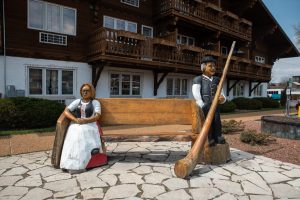
'Long'wood? Seated /UPright?
Just before 4 p.m., Greg Long, one of the directors of the Swiss Center of North America who constructed the smiling snowman effigy, and a friend clang large cowbells—it’s almost time. Another person cracks a whip, which is meant to scare away winter spirits. Then two men in traditional Swiss garb flank the Bӧӧgg and blast a mournful tune through a pair of 12-foot-long alphorns. A crowd of about 30 people gather in the field, while dozens more watch from the winery’s patio on top of the hill, most enjoying a glass of wine or a beer. Long and his friends kneel and use a utility lighter to ignite the firewood at the Bӧӧgg’s feet. The crowd murmurs in anticipation as smoke begins to billow.
In Zurich, Switzerland’s largest city, the Bӧӧgg burning is part of Sechselӓuten, which translates to the “six o’clock ringing of the bells.” The celebration dates back to at least 1525, though the Bӧӧgg has likely deeper roots in pagan rituals once used to banish winter. Sechselӓuten was a forerunner to daylight savings, marking the end of the workday as 6 p.m. instead of five, and is celebrated on the third Monday in April. Zurich’s guilds have always organized the festival, some of which date back to 1336, such as the Zunft zur Schmiden, a guild of blacksmiths, and Zunft zum Widder, the Guild of the Ram, which represents butchers and livestock dealers. ['Atlas Obscura'].
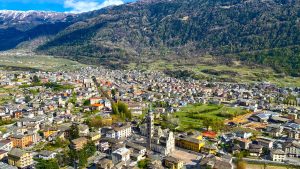
Built on the spot where the Virgin appeared in front of local resident Mario Omodei on 29 September 1504, it’s separate from the fortified town and sits strategically at the junction to the ancient church of Santa Perpetua that dominates the Tirano basin on a hilltop shaped by vineyards.
Continued: ''The Aegean Sea[a] (Greek: Αιγαίο Πέλαγος: "Egéo Pélagos", Turkish: "Ege Denizi" or "Adalar Denizi") is an elongated {'T'?} embayment of the Mediterranean Sea between Europe and Asia. It is located between the Balkans and Anatolia, and covers an area of some 215,000 square kilometres.[3] In the north, the Aegean is connected to the Marmara Sea and the Black Sea by the straits of the Dardanelles and the Bosphorus. The Aegean Islands are located within the sea and some bound it on its southern periphery, including Crete and Rhodes.
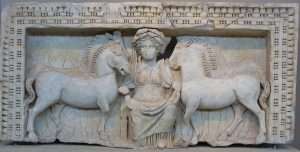
Square on?
Late Latin authors referred the name Aegaeus to Aegeus, who was said to have jumped into that sea to drown himself (rather than throwing himself from the Athenian acropolis, as told by some Greek authors). He was the father of Theseus, the mythical king and founder-hero of Athens. Aegeus had told Theseus to put up white sails when returning if he was successful in killing the Minotaur. When Theseus returned, he forgot these instructions, and Aegeus thinking his son to have died then drowned himself in the sea.[5]
Forgetting/Remembering?
Side note: The turtle silver stater ancient coinage from Aegina. Begins ALL coinage. First the 'turtle' then the 'tortoise' {after being defeated by Athens}. No one knows why. {Pawn Stars / S.15 EP.7}.
'The Turtle Lords' { 'Lost Treasures of the Maya']. A beginning or end?
Aegina / Athens. Wet / Dry.....as a means....?
'Capital' {capitol} and 'elongated' to enlarge.
N.B The word 'alphabet' also found to have begun near the turquoise mines at Sinai from the engravings in Hebrew in relation to 'oxen'. {'Expedition Unknown / Moses'}.
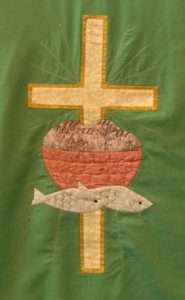
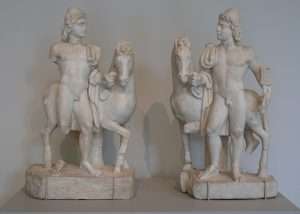
In 'profile' or 'face on'?
''The sea was known in Latin as Mare Aegaeum under the control of the Roman Empire. The Venetians, who ruled many Greek islands in the High and Late Middle Ages, popularized the name Archipelago (Greek: αρχιπέλαγος, meaning "main sea" or "chief sea"), a name that held on in many European countries until the early modern period. In the South Slavic languages, the Aegean is called White Sea (Bulgarian: Бяло море, romanized: Byalo more; Macedonian: Бело море, romanized: Belo more; Serbo-Croatian: Belo more / Бело море).[6] The Turkish name for the sea is Ege Denizi, derived from the Greek name.''
White Goddess / R. Graves.
''Breaking waves are referred to as the white horse as the crest of the mane can be seen as the mane of the horse and if you listen closely the faint booming of the waves crashing sounds like hundreds of hooves thundering along the ground.'' [Wiki].
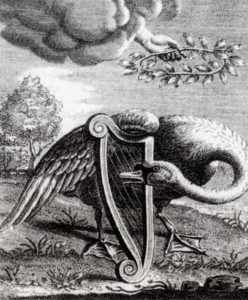
Reinier van Persijn (1615 – 23 November 1668) was a Dutch Golden Age engraver of portraits and bookplates. Sacred to Apollo. Delos to enlarge.
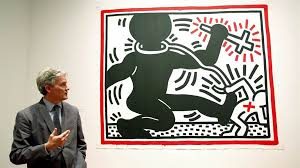
'Shadow' and 'light'.
Common parlence = ‘Bridge over troubled waters’. Link to the 'Mona Lisa'. Check it out. And/or "The island at the center of Druidism was known as Mona."
Side note: ''The Mona Lisa described in an 1869 essay as: 'Older than the rocks among which she sits'....'' ['The Chase'].
A 'cash cow'? or something else.
Practical example: ''Holy, holy, holy cow.'' Experts remark when ''seeing'' what he thinks to be the oldest example of 'life' recorded/embedded in stone. {'H20: The Molecule That Made Us' / BBC4}.
''The fastest bus in the world is powered by cow dung.''
That 'third' representation,i.e.,the sum result of that internal 'analysis' [represented with among others lunar/solar] - being the ''Golden Child''. At the base and in the middle of a certain 'structure'. A natural structure.

'Opening of the mouth'? Swan Upping?

Platform? = 'Horizon' line?
The Chinese according to the author of the 'Cygnus Mystery' represent the same in what is termed as 'the Magpie Bridge', which according to same, is associated with the constellation 'Cygnus'. Recall what its main 'emblem' is...and what that 'emblem' is symbolic of.
And/or: Certain constellations dedicated/associated with different nomes in Egypt i.e., Orion in the north of Egypt with the Giza Plateau and Cygnus in the south at Denderah. {'Imagining the World Into Existence' /N. Ellis].
Side note: A ''plateau'' of same substance also 'built on' at Stonehenge - to name but one.
Its physical representation being the longest 'tunnel' in the valley of the 'kings' , or the two mile walkway between the Temple of Luxor ['dedicated to mankind'] and the Karnak Temple....

Aswan?
Sheep 'headed' sphinxes relative to 'human' headed ones. Explained within [as well as chapter nine,'The Ancient Secret of the Flower of life'].
Refresher: "My beloved is mine and I am his; he pastures his flocks among the lilies." [Song of Songs 2:16].
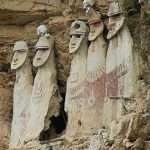
Above or below the cloud line? Rainbow link?
And/or: ''Take to yourselves the lotus which came into being at the beginning and which drove away the storm cloud even though it knew it not.'' [Edfu Building Texts].
Above or below the clouds?
'Cloud of Unknowing'.
Machu Picchu[a] is a 15th-century Inca citadel located in the Eastern Cordillera of southern Peru on a mountain ridge at 2,430 meters (7,970 ft). It is situated in the Machupicchu District of Urubamba Province[9] about 80 kilometers (50 miles) northwest of Cusco, above the Sacred Valley and along the Urubamba River, which forms a deep canyon with a subtropical mountain climate.[10]
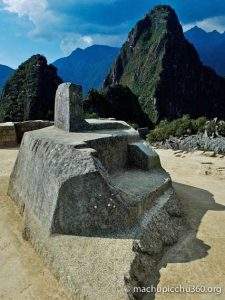
Four other mountains surround it i.e., 'five' in total.
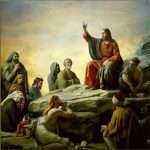
Seated on what?
Machu Picchu was constructed in the classical Inca style, featuring finely crafted dry-stone walls. Notable structures include the Temple of the Sun, the Temple of the Three Windows, and the Intihuatana ritual stone. Although the site was known locally and reached in the early 20th century by Peruvian explorer Agustín Lizárraga, it was brought to international attention in 1911 by American historian Hiram Bingham III. The original Inca name of the site may have been Huayna Picchu, after the mountain on which part of the complex stands.[13]
The site is on a narrow saddle between two mountain peaks, Machu Picchu and Huayna Picchu. In the Quechua language, machu means 'old' or 'old person' and wayna (spelled huayna in standard Spanish orthography) means 'young', while pikchu refers to a 'summit', 'peak', or 'pyramid'.[15][b] Thus, the name of the site is often translated as 'old mountain' or 'old peak'.[17]

Window of the eye?
A working example: ''I shall have to tell u something about the six centers. The mind of the yogi passes through these, and he realizes god through his Grace. Have you heard of the six centers? ...These are the SEVEN planes of the Vedas. They are the lotuses in the subtle body. The yogis see them. They are like the fruits and leaves of a wax tree {bees wax?}....
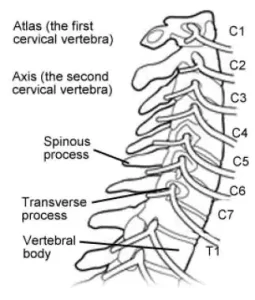
Atlas = ''the first cervical vertebrae.'' The first of 'seven'. 'Ladder' of ascent?
I have heard there is a kind of 'glass' through which a tiny object looks very big. Likewise, through yoga one can see these subtle lotuses....How does one obtain love for god? Go forward. The king dwells beyond the seven gates. You can see him only after you have passed through all gates.....God sports in the world as man. ..The Divine Mother of the universe manifests Herself through this 'three and a half' cubit man {ishon?}.'' [Pages 352/3 'The Gospel of Ramakrishna' ].
Anima / animus or both?
A practical example: ''Its going to be tasty in the tunnel.'' {Quote by G. Neville at half time Liverpool/Chelsea game - August 2021}.
'Feast of the Valley'.
 ''Somewhere over the rainbow blue birds fly, and the dreams that you dream of really come true. Someday i'll wish upon a star and wake up where the clouds are far behind me - where trouble melts like lemon drops {'yellow'?} - high above the chimney tops {'goat ears'?} - thats where you will find me.'' [You've Got Mail' / 1998].
''Somewhere over the rainbow blue birds fly, and the dreams that you dream of really come true. Someday i'll wish upon a star and wake up where the clouds are far behind me - where trouble melts like lemon drops {'yellow'?} - high above the chimney tops {'goat ears'?} - thats where you will find me.'' [You've Got Mail' / 1998].
'The Cloud of Unknowing'.
Refresher: ''The star of your being is rising''.

Linear A. Ink-witten inscriptions round the inner surface of cup (Third Middle Minoan)
Side note: The classical lamp of the time of Christ was something like the Aladdin lamp of the fairy tales: a shallow teapot with a wick emerging from the spout. Typically, a modern oil lamp has the wick centrally above the oil reservoir, and the flame is sheltered from the wind by a glass chimney. This then becomes the perfect parable for the two main aspects of the esoteric path: the oil represents the energies that must already exist in us before new energies can be developed from them; the flame it feeds represents the production of the new and visible energies, which can occur only when another flame is touched to it to kindle it. The chimney protects the flame from the wind, so that it remains alight and burns steadily. But the chimney must also be kept clean, so that the light passes through it without being partially or wholly darkened. {Page 88 'A Different Christianity' / R. Amis}.
'Wedding' to enlarge.

A new city found when looking for Tutankhamun's valley temple {death/rebirth?}. The blue stuff found within it.
CONTINUED: : ''When all visible lights are extinguished one finds, according to the words of the wise Yajnavalkya, the light of the self: What then is the light of man? Self is his light. It is by the light of the 'self' that man rests, goes forth, does his work and returns.''......

He is the king who introduced the royal title Sa-Rê (meaning “Son of Ra”) and the first to connect his cartouche name with the sun god Ra.
Thus with Augustine, the first day of creation begins with self knowledge {cognito sui ipsius} i.e., 'son of one day' - by which is meant, a knowledge not of the ego but of the self - ones true self - THAT objective phenomenon OF which the ego is the subject. And that First day of 'creation' which is within the 'City of God' {''new city''?}. [Page 248 'Alchemical Studies' / C. G. Jung].
And/or: "When the individual is born again, the blue star is born with it. When the star exploded, my cycle of coming and going had ended." Coincidence or a meaningful one? Enlarged elsewhere.
Black hole?

A centering within.
''The connection of the Lapis with immortality is attested from very early times. Ostanes {4 BC} speaks of 'the Nile stone that has a spirit'. The Lapis is the panacea, the universal medicine, the alexipharmic, the tincture that transmutes base metals into gold and gravel into precious stones....It cures melancholy etc...'' [Page 101 'Alchemical Studies'].
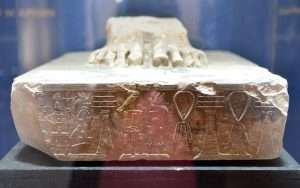
Imhotep - the original FIRST star.
From a different perspective: ''The sun. Our sun. We have worshipped it, deified it since the dawn of history. It has been argued that the sun lies at the foundation of all religions, and there may be some truth in that. In fact, i think there is a deep truth in that. Because we all owe our existence to that star. In fact, in a deeper sence to all the stars. We don't need to invent imaginary gods to explain the universe. We can replace them with the real thing.'' ['Universe: The Sun: God Star'].
Is Mr Cox flying his flag for science again?
Part 1 to enlarge.
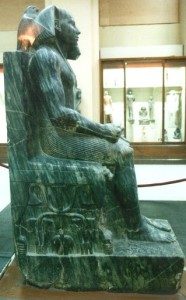
Perched on the shoulder or.....something at the back of the mind?
We all understand the positive/negative aspects of taking a ‘journey’ by a right or wrong path. By achieving a result by correct or incorrect methods. Getting used to one way/path or the other becomes habitual. A good or bad one. Symbolic of ascending/descending tunnels in the great pyramid. Pagan equivalent...Animals = descend...Birds= ascend, i.e., ’In flight to somewhere’, but within the still as yet 'lower self'. The 'language of the birds', however being that 'boundary line'. Indicative of an ''inner journey.'' Potential/possibility of. Depending on what we get used to. Repetitive action makes it habitual.
As does a study program.
As seen from a different viewpoint?..."Non-identification pulls us out of our black hole of distorted self interest which gives us tunnel vision and keeps our psychology in the basement of its potential." ['The Wisdom of the 4th Way']. Continued elsewhere.
"Bathing" to enlarge.
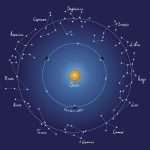
Aries - pisces = a cycle of something. Elder/younger?
"It seldom happens that a man changes his life through his habitual reasoning. No matter how fully he may sense the new plans and aims revealed to him by reason, he continues to plod along in the old paths until his life becomes frustrating and unbearable - he finally makes the change only when his usual life can no longer be tolerated." Tolstoy [1828 - 1910].
'Elder' in relation to 'younger'. Anything? Try part 1.
